



















































CULTIVATING







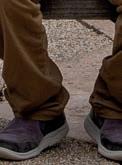

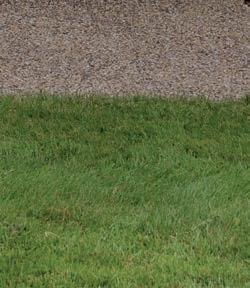

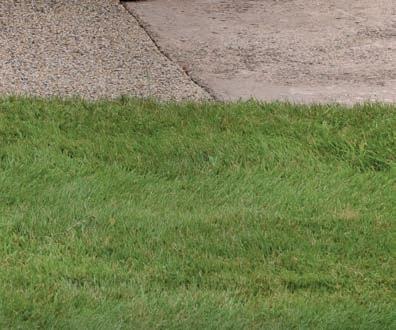









Develop your child's love for learning with a premium online education that's student tested and parent approved. Enrolling now www.kingsinterhigh.co.uk











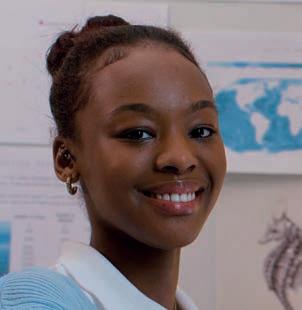
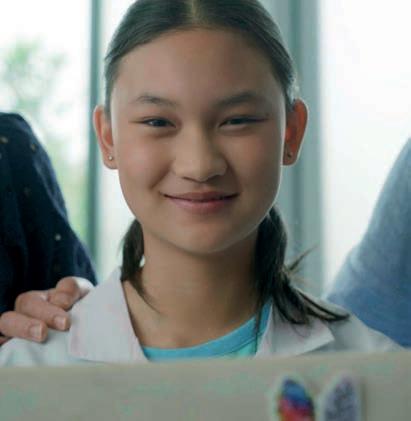






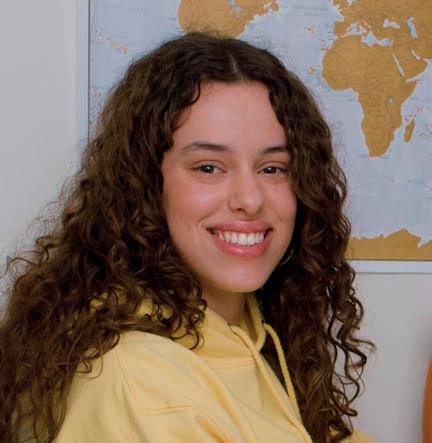





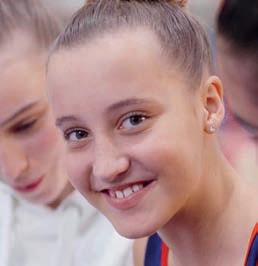












Libby
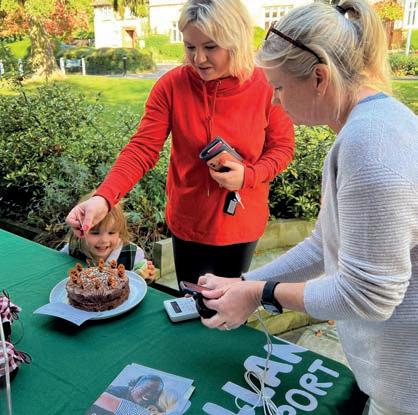

Suzette Scoble
MIDWEIGHT
Carmen
MAGAZINE
Mariana Suzuki
MARKETING
Jessica Shaltout
FINANCE
Jerrie Koleci
James Fuschillo
PUBLISHING
Sherif Shaltout



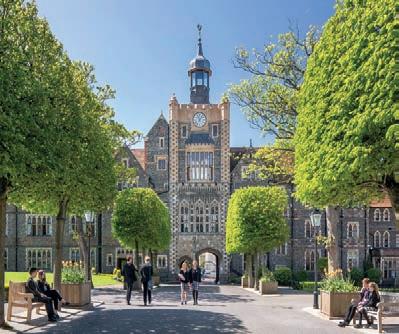






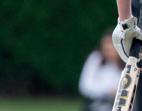


















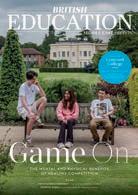
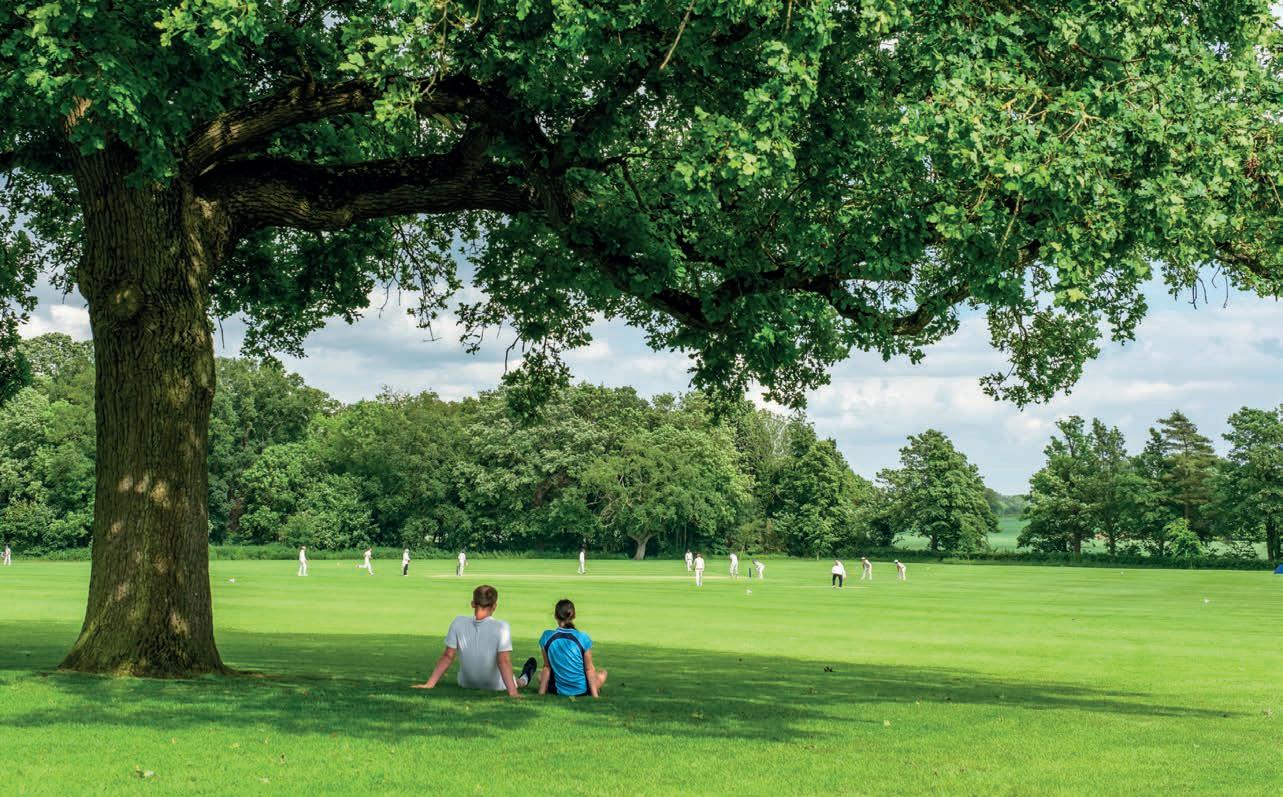



With memories of the Olympic and Paralympic Games still relatively fresh, this is a good time to consider where sport fits into education. Many elite athletes have been nurtured and developed on the playing fields of British independent schools, a source of eternal pride and an example to those that follow them. But sport is much more than that, and we’ve gone beyond the trophy cabinet to ask what else it gives to young people and to school life.
children this summer to watch the whole e ort, not just the victory lap, is a better lesson.
Another key theme of this issue is supporting community and good causes, and in Giving Back (page 28) two schools talk about how that is embedded in school life. There are further insight pieces from school leaders on other pages discussing how these activities are structured. Student agency in volunteering and fundraising is critical, and there’s much to celebrate in what that achieves. But the bigger picture stu – recognising inequality and working to overcome it – must be the most vital takeaway of supporting others.
British boarding schools continue to attract
“SOCIAL MEDIA REELS SHOWING SPORTING TRIUMPHS SKIRT OVER THE STRUGGLE, SO SITTING DOWN TO WATCH THE WHOLE EFFORT, NOT JUST THE VICTORY LAP, IS A BETTER LESSON”
In Sport for Success (page 38) we asked schools about transferable skills and qualities developed by sport. I’m fascinated by the emphasis they all place on teaching skills around games that can then be used in class. But one thing I hadn’t thought of, until the Director of Sport at Wycli e College Ben Taylor sagely pointed it out, was the impact of social media on attitudes to winning and losing. He noted that those popular social media sporting highlights reels showing tears of triumph and dances of joy are inspiring to young people, but skirt over the gruelling struggle involved in getting to that moment. Sitting down with
pupils from all over the world and in this issue we address some of the practicalities surrounding relocating to a new country. When should planning begin? What if your move happens mid-school year? And how can international students prepare for competitive entrance examinations? There are lots of places to go for advice on these subjects, as well as on the fundamental question: which school is best for my child? Anyone considering a British education will find answers to many of their questions in these pages.
Libby Norman EDITOR



Headmaster, Royal Russell School
Chris Hutchinson. has led Royal Russell School since 2011, joining from Newcastle School for Boys where he was also Head. Prior to that, he was Assistant Director of Studies and Head of Science at Wellington College. He talks about Royal Russell's goal to create more means-tested bursaries ahead of the school's 175th anniversary in 2028.

Principal, Duke of York's Royal Military School
A er studying philosophy, Alex Foreman "fell into teaching", beginning his career at Uppingham in Rutland and then moving on to a large innercity comprehensive in Leicester. Before taking up his role as DOYRMs, he led an MOD school in Germany. In this issue, he highlights the ways in which leadership can be developed.

Global Director, MPW Group
James Barton studied Archaeology and Ancient History at Warwick, followed by an MA in Performance Philosophy. Working in education for over 15 years, he has authored Trotman Getting Into... guides, as well as giving talks to, among others, TEDx and How To Academy. In this issue, he talks about the current challenges facing independent schools.


Families considering the option of a boarding school education for their children often ask us:
‘What are the benefits?’ and ‘What is the di erence between their current local school and a boarding school?' An important part of the process of selecting the right school for your son or daughter is to visit schools in the UK. Exceptional UK boarding schools create an environment that is authentic, strives for excellence, ensures quality, where care and the community is at the heart of its success. Although the blueprint is emulated around the world, nowhere else quite captures the unique quality of the parent school. Exam results and university destination lists are important, but creating a holistic
The 32nd UK Boarding School Exhibition will return to the Middle East from 12 to 16 November 2024. This is a great opportunity for you to start your research, meet Heads from 15 leading schools and talk to our Education Consultants. We are also hosting two seminars in Dubai: UK University Home Fee Status and Financial Planning for Education.



In 2024’s final edition of British Education Middle East, we cannot end without a mention of the Olympic Games 2024. A third (33%) of the Team GB squad attended a UK independent school, 327 athletes - 155 men and 172 women from 36 schools. Our schools o er excellent facilities, identify talent at an early age, balance a firstclass academic education with training, strength and conditioning, nutrition guidance, sport psychology and competitions.
“NOWHERE ELSE QUITE CAPTURES THE UNIQUE QUALITY OF A UK BOARDING SCHOOL”
approach where the social, emotional, physical, mental, and intellectual growth of a child is at the core. This is tangible when you visit a school, meet the Head and see the children in their home-from-home environment.
This year we are celebrating our 25th anniversary of working with leading UK boarding schools and families living overseas. We are an experienced team of Education Consultants with specialist skills in providing the best help and advice. Having visited over 350 schools across the UK, identifying what is special and unique about each school and matching that with the child and family’s needs is key to our success.
UK Boarding School Exhibition
RIYADH – THE FAIRMONT Tuesday 12 November – 16.00 to 20.00
AL KHOBAR - LE MERIDIEN Thursday 14 November – 16.00 to 20.00
DUBAI - GROSVENOR HOUSE HOTEL Saturday 16 November – 11.00 to 16.00
Sara Sparling
DIRECTOR AND EDUCATION CONSULTANT, ANDERSON EDUCATION andersoneducation.co.uk • ukboardingschoolexhibition.com enquiries@andersoneducation.co.uk
Twitter: @An_Education | Instagram: @Anderson_Education
Facebook: @AndersonEducation | LinkedIn: Anderson Education
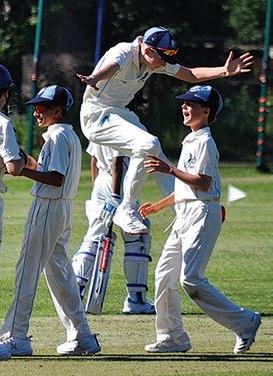
For the third year running, Feltonfl eet has made it to The Cricketer Schools Guide’s Top 50 Prep Schools. Thanks to a dedication to cricket in the curriculum, top-notch facilities, jam-packed fixtures schedule, outstanding coaching, and four county titles in 2023, Feltonfl eet continues to make its mark on the cricket scene.
“Eva Okaro was the fi rst Repton student to compete in the Olympic Games while still at the school”























Tonbridge student Ollie Sykes has been named the Wisden Schools Cricketer of the Year. A 2023 leaver, he received the iconic accolade at a ceremony at Lord’s in April, becoming the fi rst Tonbridgian to earn this title. Ollie distinguished himself by scoring 935 runs and took 30 wickets for Tonbridge in the 2023 season.

The Cathedral Choristers from CCCS Boys’ Prep School, Oxford, had a hugely successful tour to California at the end of the summer term. They sang at concerts, services and alumni events in Los Angeles, San Francisco, Palo Alto and Monterey.
“It was a terrifi c trip and the boys sang brilliantly throughout,” says Sophie Biddell, Director of Music.
“If a free society cannot help the many who are poor, it cannot save the few who are rich”
JOHN F. KENNEDY

From January 2025, Sibford School will open a second boarding house, Penn House, for boys in Years 7 to 13. Penn House is currently undergoing renovation to ensure a comfortable living environment for its future residents. Sibford School off ers full, weekly and fl exi boarding options for students from age 11.
Cobham Hall co-curricular programmes have seen its pupils opt to plant 500 trees, staff food banks and try dissection and songwriting – with karate, escape rooms, Thai cookery and a colour run along the way. Service, environmentalism, adventure and leadership – four of Cobham’s Round Square IDEALS – are central to the programmes.

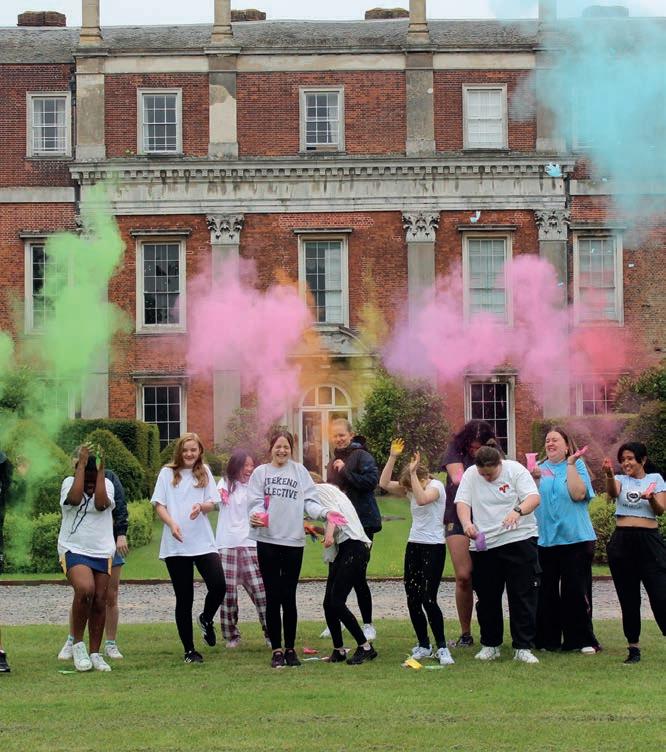
King’s Ely student Thomas Strudwick has been named ‘Intermediate Class’ winner of this year’s Young Organists’ Competition. A former Ely Cathedral Chorister, Thomas joined King’s Ely Prep as a Year 4 pupil and also plays piano and cello. Praised by the competition judges for his skill and composure, he only started playing the organ in October 2022.

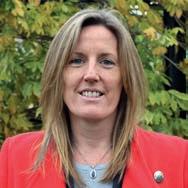
Dr Clare Ives becomes Head of The Leys in September 2025. Currently Senior Deputy at Sevenoaks, she will be the fi rst female Head at the Cambridge school. “As a bursary recipient, and fi rstgeneration university student, I am passionate about the transformative power of great education,” she says.
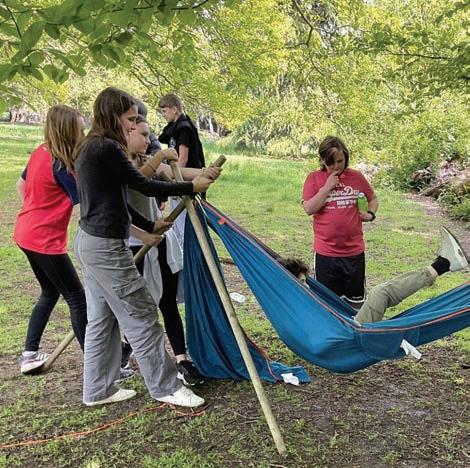

The International School of London has extended its Forest School programme into the Secondary curriculum. Forest School’s outdoor, experiential approach promotes resilience, creativity and a deep connection to nature. The Natural Pathways curriculum complements this by teaching problem-solving skills, innovation and critical thinking.



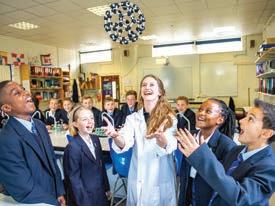
It’s been an exciting start to the new academic year for Worth School. The Catholic co-educational secondary school, based between London and Brighton, recently welcomed Ms Marisa Bosa as new Senior Deputy. Worth also celebrates two prestigious accolades: Best Boarding School of the Year finalist (Independent Schools of the Year) and Best Alumni Mentoring (The Week Independent Schools Guide).

Jonny Gilbert becomes Headteacher of The Roche School in Wandsworth in September. He joined the school as Deputy Head 10 years ago and will continue the work of Vania Adams, who is retiring. Gilbert will continue to champion the Spanish Bilingual stream introduced two years ago.




“I have a responsibility to show kids not just how to be like a soccer player, but how to be like a man”
PELÉ
“THE DIFFERENCE BETWEEN INVOLVEMENT AND COMMITMENT IS LIKE HAM AND EGGS. THE CHICKEN IS INVOLVED; THE PIG IS COMMITTED”

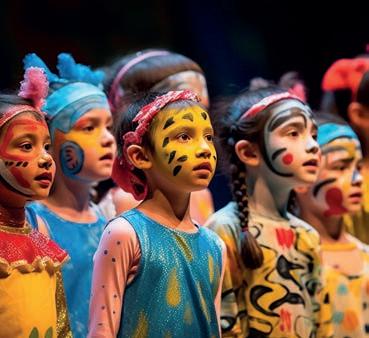
A report from the charity Cultural Learning Alliance (CLA) highlights the huge ‘enrichment gap’ in arts education. It points to a decline of 42% in arts GCSE entries since 2010. Hours teaching arts subjects have decreased by over a fi h (21%). CLA is calling for a shi , so that all UK schools deliver an expressive and arts-rich education.
Bromley High GDST has introduced a Middle School for Year 5-8 to support the secondary transition. This is to counteract the decreased self-esteem that is o en experienced by girls moving up. Its new personalised approach aims to alleviate anxiety and provide each student with a clear flight path for her learning and personal development.
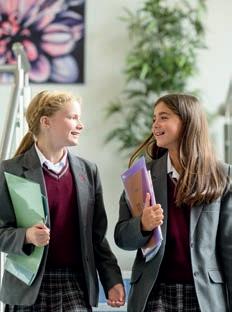
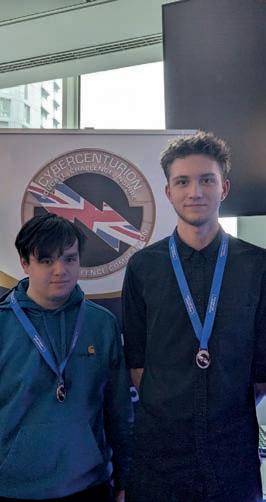
A er battling 500 teams over two intense rounds, a Frensham Heights Sixth Form team made it to the fi nals of the 2024 CyberCenturion competition and earned third place. Sarah Cull, Head of Computer Science, says: “The competition has helped the students develop technical skills that they can use in the future and has inspired them to consider cybersecurity as a potential career choice”.
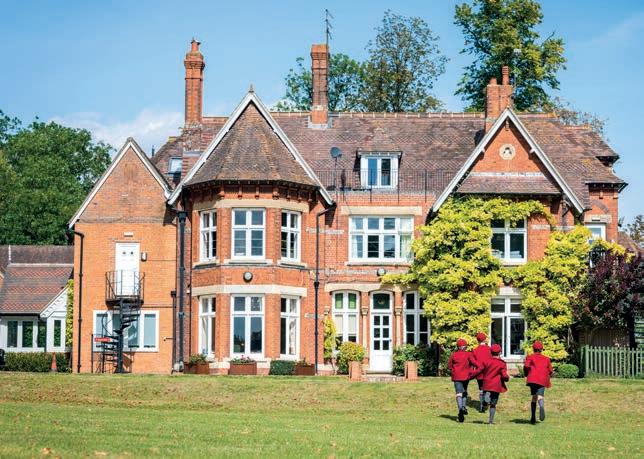


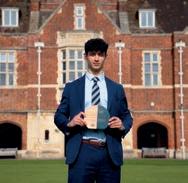
Eastbourne College pupil Alex Bailey, 18, received an award for scoring 100% in a financial services exam typically taken by adults. Alex received the Fundamentals of Financial Services Outstanding Achievement Award from the Chartered Institute for Securities and Investments. He now hopes to study Economics at Bath.
Eminent plant biologist Professor Sarah Gurr returned to King’s School, Canterbury, where she was a pupil in the late 1970s, to open its new science centre. This adds six state-of-theart laboratories and a science auditorium. It will also host community science events.
Moulsford Prep in Oxfordshire is making a shi to coeducation and will welcome girls into year 3 in 2026. Its pre-school is already co-ed. Chair of Governors Edward Boddington says: “Societal changes form the background to this decision, with families – including many Moulsford families – increasingly seeking to educate their children together and in a coeducational environment”.

Pupils from Dame Bradbury’s Junior in Saffron Walden, part of The Stephen Perse Foundation, represented Uttlesford at Essex Primary Cross-Country Championships. Standout performances included a Year 3 First from solo runner Ruby. The Year 5 Girls team also secured a County Team title.












“TO HAVE SOMETHING WHICH ONE PARTICULARLY WANTS TO DO IS MORE IMPORTANT THAN ANYTHING ELSE. IT IS EVEN MORE IMPORTANT THAN SUCCEEDING” GLENDA JACKSON
Relocating to the UK is a big step, particularly in the middle of the school year. Amelia Buckworth has some tips on how to make the midyear move as smooth as possible
What do I need to do first?
Lots of research. You need to understand the British school system – its reputation for being complicated is not entirely undeserved – many people find it helpful to use a UKbased education consultant at this stage, to support them as they navigate the process.
The British education system has both state (government) schools and independent fee-paying schools (also known as private and public schools) divided into primary (age 4-11) and senior stages (11-18). Children start in Reception the September after their 4th birthday and leave senior school in Year 13.
The academic year runs from early September to mid-July with a six-to-eightweek summer holiday. The key entry points for entering the UK independent system are 4+, 7+, 11+, 13+ and 16+, and entry into the top schools at these stages will include some sort of assessment. The main public exams in the UK are GCSEs, taken at the end of Year 11, and A-levels, taken at the end of Year 13, but the International Baccalaureate (IB) Diploma is increasingly o ered by many top UK schools at Sixth Form as an A-level equivalent.
What are the main di erences between the UK curriculum and others?
There are three main curricula followed by international schools, the British, American and IB. Broadly speaking, the British curriculum starts formal education earlier, narrows subject choice sooner, and has public examinations at the ages of 16 and 18. In the US curriculum, students are expected to study a range of subjects to Grade 12 (Year 13 in the UK), and are assessed at the end of each Grade, but have no exams comparable to GCSEs or A-levels. A big di erence in STEM subjects is that in the US students are taught sequentially whereas in the UK they study the sciences simultaneously.
What are the entry requirements for the top UK schools?
For students not currently studying the British curriculum, or transitioning into the UK from abroad, the first thing prospective schools in the UK will ask is to see a school report. So, it’s a great idea to have any reports already translated and to

hand for when schools request it. If a school has a place, they will invite the student to take their own entrance assessment. This is typically made up of English, Maths, Verbal and Non-Verbal Reasoning. At this stage, English language ability is crucial.
And what happens if we are relocating mid-year?
Mid-year places at schools can be di cult to come by. Where possible, we recommend families stick to the main transition points of 7+, 11+, 13+, 16+ where chances of securing a place in a top school are much higher. But midyear transitions aren’t uncommon in London. Make any enquiries to schools as early as possible and be aware of di ering entry requirements. It is highly likely that once you have registered with a school you will be added to a waiting list, so try to visit the school if you can and maintain a positive
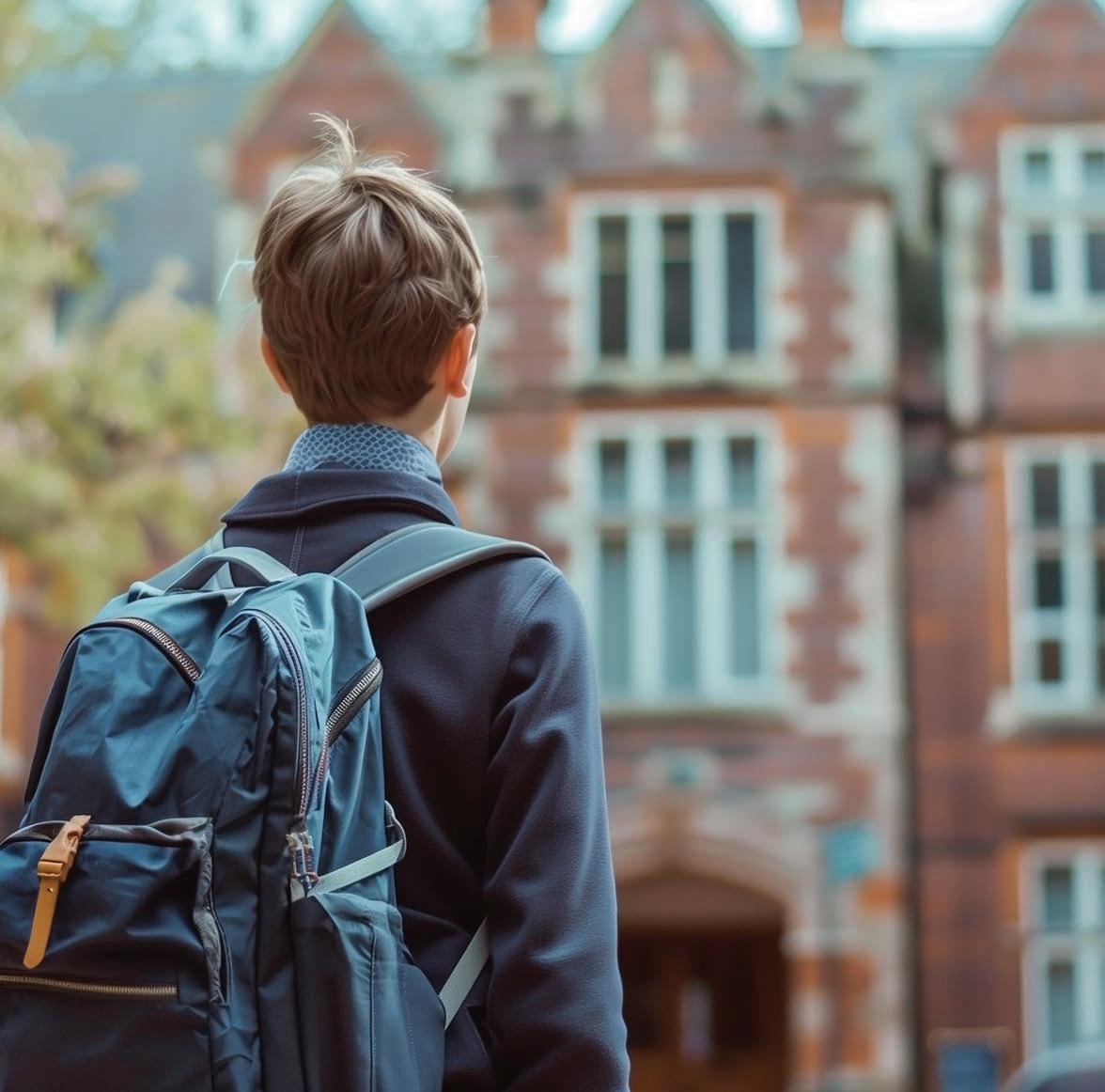
“It is highly likely that once you have registered with a school you will be added to a waiting list, so try to visit the school if you can and maintain a positive relationship with the school afterwards”
relationship with the school afterwards by keeping in touch (schools love a handwritten thank you following a visit, for example).
How do I best support my child?
Have your child take an independent academic assessment before applying to schools. These can be hugely helpful to benchmark where your child sits in comparison to their UK independent school peers. Some schools will accept these results, and it can boost your application. At Quintessentially Education, we use a cognitive ability assessment that is directly comparable with admissions tests the schools use. Be prepared not to get into your ‘dream school’. Families must be realistic about the options which will be available to them for a mid-year move. We recommend that families should accept a place at the best school possible, and if it is not the perfect
school, put a strategy in place for a planned move further down the line. For example, if entering in year 10, focus on a Sixth Form move for year 12 to a more academic school, where there is a formal intake, and it is not based on availability only. Putting tutors in place to support your child through the transition and bring them up to speed with the UK curriculum can be a huge help.

AMELIA BUCKWORTH Education Manager Quintessentially Education
The Head Master of Rugby School on why regulated phone use and unregulated time to play, learn and socialise are vital for our young people

Irecently attended a meeting with 15 CEOs from diverse industries. They were collectively bemoaning the work habits of their Gen Z sta . As the only educationalist in the room, I was blamed for shortcomings in the education system and for its failure to produce su ciently robust employees. The conversation was a jovial one and in more serious moments they did speak positively about this particular age group. Nevertheless, the conversation did bring to mind Jonathan Haidt’s The Anxious Generation Haidt’s book makes two key points. First, unregulated access to smartphones has done and continues to do significant damage to children. Second, a culture of ‘safetyism’, developed over more than 40 years, has produced children who have been mollycoddled and, as a result, are reluctant to take part in adventurous play or to seize opportunities where an element of risk is involved.
Haidt’s verdict on smartphones has
attracted the most column inches and it is reassuring that most schools have now imposed restrictions on their use. The impact of ‘safetyism’ has received less attention, but is equally important. Many children born in this millennium have experienced a childhood where perceived risks in the real world have been greatly exaggerated, while the genuine risks of the online world have been ignored.
Schools like Rugby provide an antidote to these two modern problems. Smartphones have long been banned from our classrooms, with strict limits on mobile phone use outside the classroom. This allows our students to have more face-to-face interactions with each other and to engage wholeheartedly, and without electronic interruption,
“Perceived risks in the real world have been greatly exaggerated, while risks of the online world have been ignored”
in the adventurous group activities where they learn the skills which are so important for making the most of life at school and for thriving after school.
Just as important are the opportunities for the students to have fun and spend unregulated time with each other, busy or not. We have more than 30 student bands, each of which has to find the time to practise and manage the dynamics of group performance. There are informal games of sport long into the summer evenings. Students are learning about collaboration, managing their reactions, forging real-time friendships, discovering what they are good at and what they like doing – without other-world distraction.
We can safely and confidently provide these opportunities, organised or not, because we are a full boarding school with the time and space to educate beyond the classroom. Perhaps the most important element of a full boarding school is the House system. Our boarding houses have approximately 50 students with 10 in each year group.


There is something magical in the way that 10 students who come together at the age of 13 learn – despite, or perhaps because of, the inevitable squabbles and conflicts – how to live together successfully in a community and absorb the vital life skills that transport them beyond the Gen Z stereotypes presented by my CEO friends.











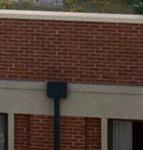








Join us at Wendover Online School to study a new subject or take extra lessons to boost your grades


• Target the grades you need for university admission
• Top-up lessons to complement school classes
• Flexible learning: during term, holidays, pre-exams

Major UK & International exam boards
Expert teachers in a wide range of subjects
Wendover teachers genuinely care about each student’s success, making a remarkable impact on their academic journey
Fiona, Dubai

Pupils at Concord College learn valuable lessons outside as well as inside the classroom.
See page 22
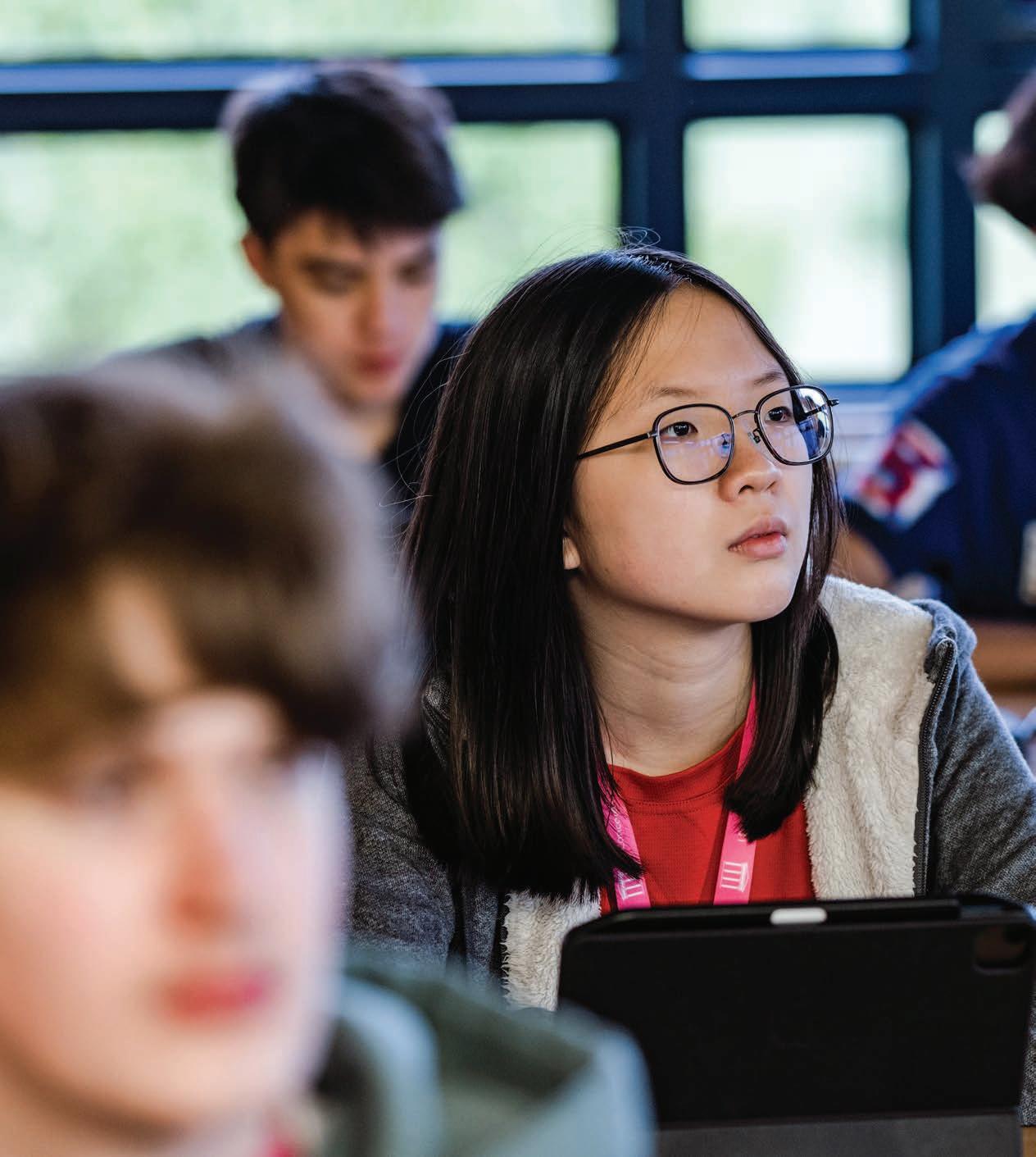
“ASK ANY OF OUR STUDENTS WHAT THE MOST IMPORTANT THING IS AND THEY WON’T SAY GETTING A STARS – THEY WILL SAY KINDNESS”

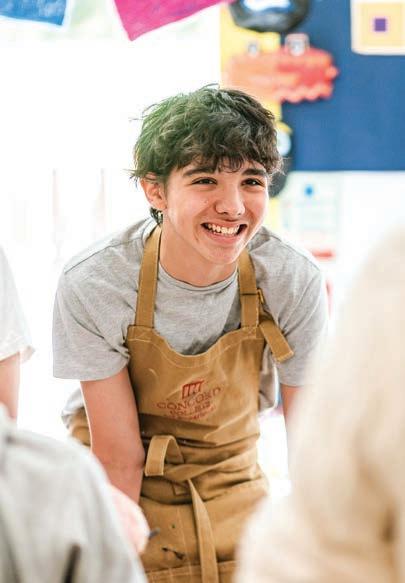
With standout academic results, Concord College o ers students from across the globe rich opportunities to develop their strengths, find their direction and flourish
Mention Concord College and most people know about its academic success – and that is hard to overlook since the school is a heavy hitter at a national level. But results are only part of the story. Principal Dr Michael Truss is always careful to explain to prospective students that a Concord College education means a far broader approach to education. “Yes, the academic entry requirements are high, and the entry bar is high, and that’s right because that’s what our parents are looking for. But what we’re not, and never have been, is an academic hothouse where it’s only about grades.” While the school welcomes and support many academic high-fliers, what it’s looking for is the right attitude to learning. “You’ve got to work really, really hard here to get your success. But actually, what counts is: are you interested in what you’re doing; are you interested in learning? Intellectual
endeavour – intellectual activities – is that something that appeals to you?” Concord College has an interesting history. Opened in 1949, it was one of that small group of schools established in the UK after the War with the express aim of bringing international students together in order to share learning and build cultural understanding. Today, that founding ethos of harmony remains alive and well. “Ask any of our students what the most important thing is and they won’t say getting A stars. They will say kindness,” says Michael Truss. While it adheres to the British educational framework (GCSE and A levels), this has never been a ‘traditional’ public school and – very distinctively – it has no uniform. This can be surprising to parents from some parts of the world (including the UK), but Michael Truss believes it’s an important point of di erence. “We’re one step closer to university, not in terms of curriculum necessarily, but in terms of approach and how we treat students,” he says. This is especially


true in the A-level years. “There’s a lot more independence of study, of choice, and students react really well to that.”
An interview – along with entrance tests – is how Concord checks it is the right fit. Michael Truss frequently interviews older students, while the Head of the Lower School Susan Correll meets the younger (13+) students.
“What we’re testing in that interview is independence of thought, but also the willingness to be educated.” Truss (an Oxford Physics graduate himself) likens it to an Oxbridge interview, where something beyond grades is expected.
“They want that demonstrated passion and commitment to the subject – and that’s also what we’re looking for.”
Feeding passion and commitment to learning is the most distinctive element of the educational approach here.
Opportunities go way beyond ‘teaching to the test’, in order to build open and wellrounded minds. The Super-Curriculum o ers an array (100+) of clubs, societies, discussion and special-interest groups. This means not only can the aspiring medic fill their boots with extra knowledge in areas such as anatomy, but also keep up interests in, say, philosophy, computer science or geography.
Many students gravitate towards sciences, and that is catered for with a stunning purpose-built science building featuring 22 labs, including a ‘Special Projects Laboratory’ for experiments that let students far exceed typical school-level investigation. They have their own bench space for project work and get access to high-tech kit such as 3D printers, spectrometers, and so on. Truss says when students are writing their
UCAS personal statement or attending university interviews, those special projects are a great way of demonstrating commitment to their chosen field. While sciences are popular – and nearly every student chooses to study Maths at A level – there’s a distinct cohort that favour humanities and arts subjects. This includes those looking towards architecture, design or fine arts pathways. Again, opportunities and quality of work produced are exceptional. Many students arrive with extra strings to their bow. “A huge fraction of students are very musical – lots of them arrive with Grade 8 or a Diploma,” says Michael Truss. There’s no Music A level o ered, but it’s a popular choice for EPQ (Extended Project Qualification).
With four school Houses (not to be confused with the 17 boarding houses
“YOU’VE GOT TO WORK HARD HERE TO GET YOUR SUCCESS. BUT ACTUALLY, WHAT COUNTS IS: ARE YOU INTERESTED IN LEARNING?”
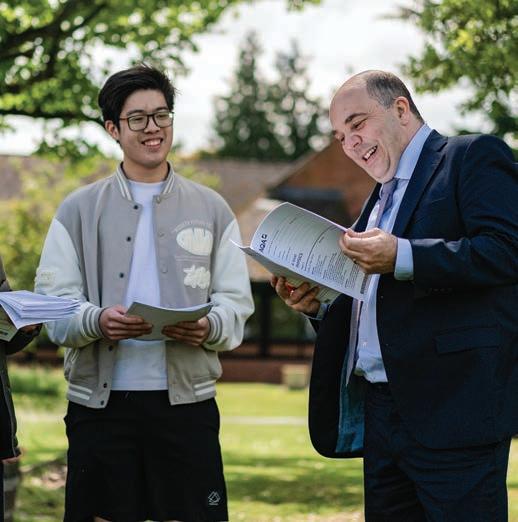
where boarders live), every student belongs to a House ‘team’. Michael Truss says this is central to the life of the school. “Our House system is incredibly important because they’ve all got their own identities. Students are very loyal to their House and it’s that nice element of competition – healthy competition.”
The House system is an important element in the school community, and another layer of friendship and support. But, as you’d expect of a school where some 85% of students board, the pastoral care here is wraparound. “The tutor is at the centre of everything because the tutor is the person that sees the student every single morning. The tutor is the hub, if you like, of information that’s flowing through. It could be academic, co-curricular or boarding –whatever it is, the tutor is that conduit.
“But the key to our system here with our 17 boarding houses is we’ve got an unusual number of adults involved in caring for each child. So, for example, a Form Four boy or girl boarder here will have their tutor and their teachers. They will also have a boarding parent, assistant boarding parent, head of year, head of lower school and they have a head of house.” This exceptional level of support is matched
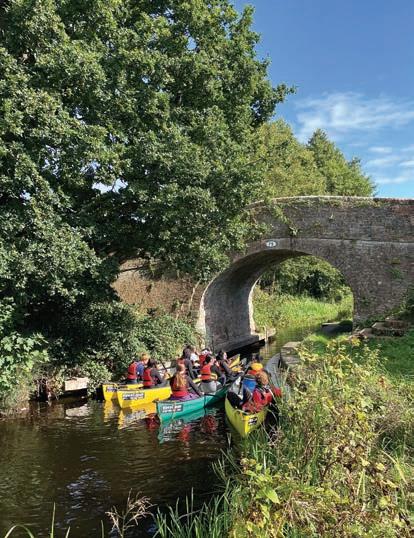

by a strong live-in culture – for obvious reasons since so many students are international. Exeats are easily applied for if parents or relatives are coming to visit and all young people have UK-based guardians, giving them the opportunity to enjoy life out school. The boarding houses provide ample creature comforts (another one is currently under construction), and students have their own bedroom, with home-from-home shared spaces for social and down time.
While traditional independent school team games like rugby are not a Concord College tradition, there are other sports the school shines in, including basketball, badminton, volleyball and tennis. It has nurtured elite athletes, including swimmers, a fell runner and a world-class windsurfer – and reached the finals of the Society of Heads U18 National Cup Final for football for the first time last year. A new sports hall is under construction to add even more opportunities.
The fact that this is a rural setting –and in glorious Shropshire countryside – provides an immersion into way of life that seems a long way from, say, urban Hong Kong, Thailand or Singapore. And that brings fresh-air pleasures, with stunning landscapes to explore, plentiful trips and expeditions locally and further afield and more organised outdoor education activities – some via the school’s highly active Duke of Edinburgh (DofE) Award scheme. Students get involved in local community life, with outreach and volunteer work and some of the boarding residences are situated in the local village. The Saturday afternoon bus to the medieval market town of Shrewsbury is well used for cinema, meals out and shopping.
Shropshire is a peaceful backdrop for study and outdoor pastimes – but many students naturally gravitate back to cities for their university years. London – with its world-city experiences and exceptional universities – is a huge draw. Currently, UCL is favourite for o ers and applications, with a sizeable number of students also choosing Imperial or King’s. Oxford and Cambridge are firmly in the mix too.
Getting in to Concord College is a significant milestone and something to celebrate. So, when students arrive each September, there’s immersion into British life with induction week. Rather like university freshers’ week, it is all about orientation, fun social events and finding friendship groups. It finishes with a hugely popular British Day, complete with a proper funfair.
The structure and setting here are perfect for developing and honing academic strengths. The fact that it’s such an international environment builds social confidence and strong friendship networks. “National societies are really strong here,” says Michael Truss. “You can join any society you want, not just your home country!” This year the school has introduced a cultural festival week to let students celebrate all home countries’ special days. It’s a perfect example of what Concord College was established to do – develop deeper understanding and broader knowledge.
“On paper, it looks such a challenge to get 40 nationalities from all over the world living together harmoniously, but they do, adds Michael Truss.
“The community is strong here.”
concordcollegeuk.com
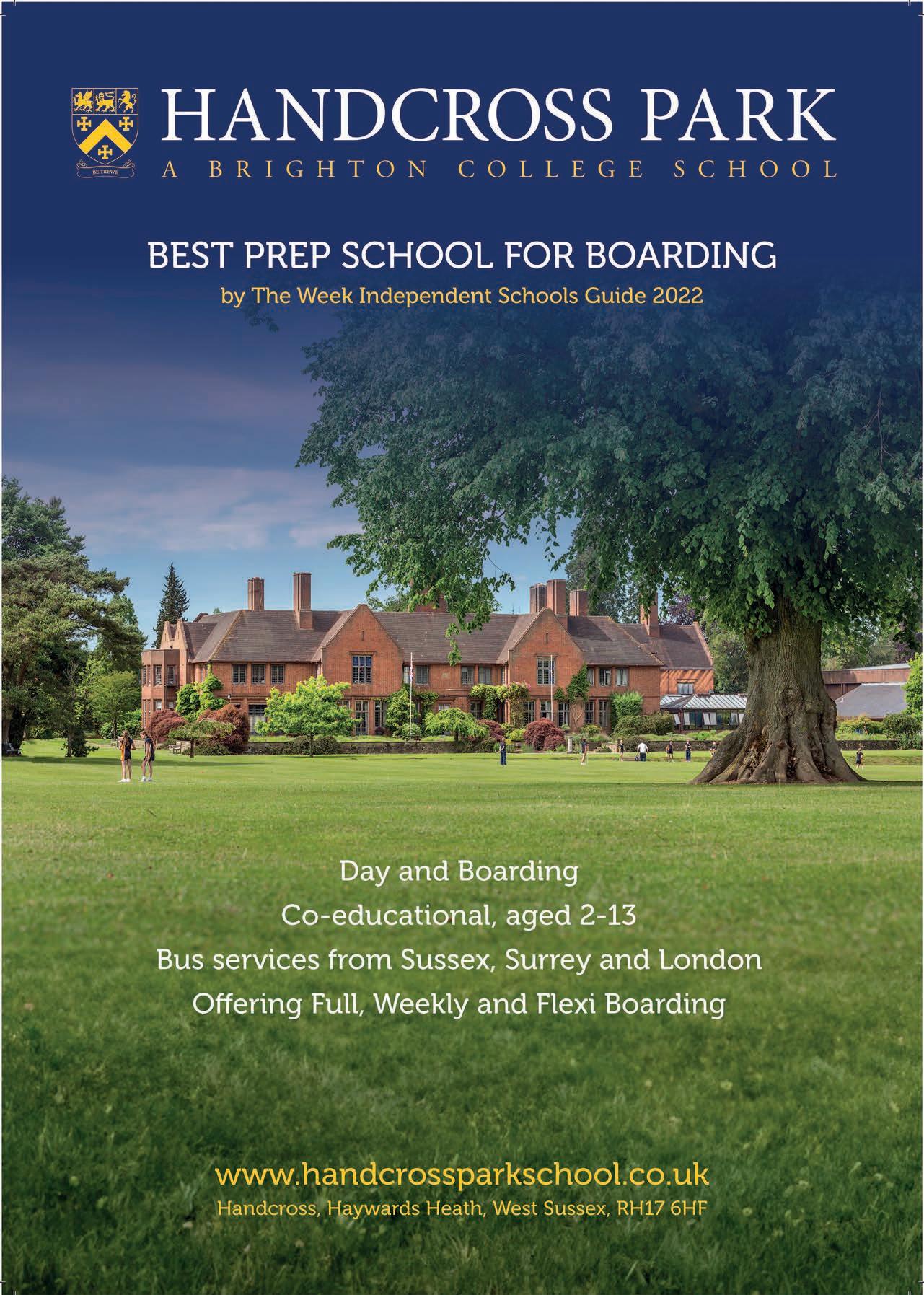
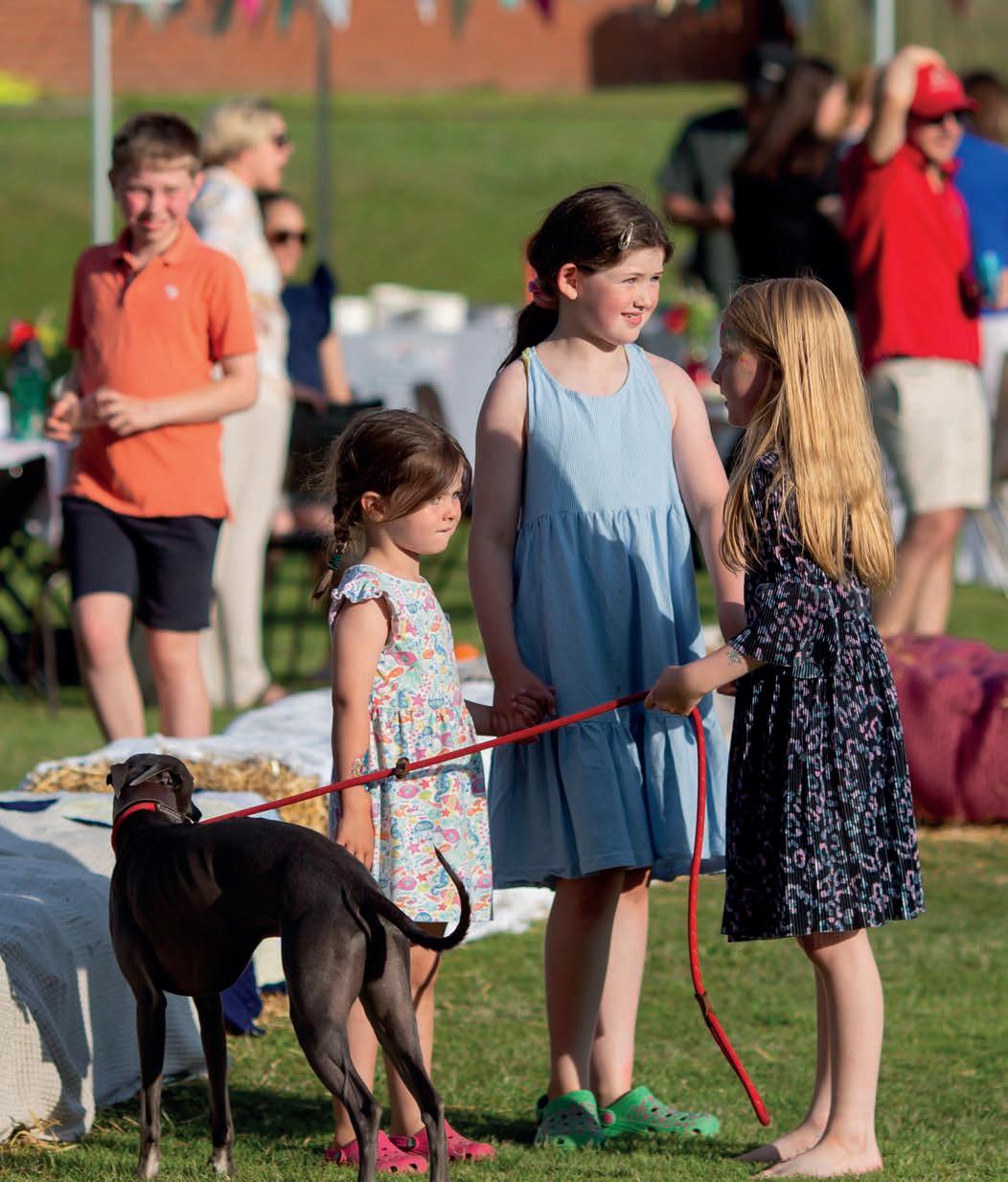
and sharing at The Downs Malvern See page 28
Teaching young people the value of supporting wider community is a life lesson best started young. We speak to two schools about how they inspire children to give back


At The Downs Malvern charitable activities involve all members of the school community. There’s a regular Macmillan Co ee Morning, organised by parents and the Friends of The Downs. Children are enthusiastic participants in this – and also in the events they mastermind. The recent Red Nose Day was led by Senior children, who set up stalls and games for the younger pupils to enjoy while supporting the charity’s fundraiser.
A big annual event is Earth Week, led by the school’s Eco-Team. They organise whole-school activities that also span the curriculum. Initiatives have included a swap shop and car-pooling and a ‘run to school’ challenge. Children go meat-free for the week with a special menu.
One of the most popular events in Earth Week has been the ‘Trash-Fash’ fashion show, where children design and create extraordinary outfits from recycled materials. All this sits alongside eco activities in the boarding house and a sponsored fun run – recently children raised over £2,000 in

support of the Marine Conservation Society. All children get involved and some also make produce or organise their own sponsored event. Alongside these activities, there’s House Charities Day, where each House will research and then vote on a cause to support. Recently, funds have been raised for Air Ambulance, British Heart Foundation, Water Aid and local organisation Dementia Café, Malvern.
The school has ongoing relationships with a care home and a hospice. This gives children a local context and means the school can organise regular events. For instance, the youngest children in EYFS visit and sing fortnightly as part of a local initiative called ‘Debutots’. Christmas brings extra impetus, as children support the ‘Teams 4 U’ Christmas Shoebox Appeal by gathering gifts for children in Eastern Europe. Recently, they also sent lots of bags full of uniforms to a school in Romania. School Prefects organise food bank collections as an alternative to the traditional ‘secret Santa’ – pupils give up giving and receiving gifts to help others.
The school’s Community Engagement O cer, Polly Nuttall liaises with the
volunteers from the Malvern Hills Branch of the National Childbirth Trust (NCT) to identify the best ways to help out. This has included support for a nearly new sale and harnessing school spaces for paediatric first aid courses for local parents. The children love getting involved in a free Friday morning playgroup at the school called ‘Hoot’, suggesting activities and games which they then set up and tidy away.
Children at The Downs Malvern are always keen to suggest and support specific initiatives – for instance, raising funds for the Worldwide Fund for Nature (WWF) via a production of Yanomamo – an awareness-raising musical about deforestation in the Amazon. Headmaster
Andy Nuttall says pupils are keen on fundraising, but also actively researching charities for themselves and then presenting facts to the whole school in assembly.
He says the school finds that children recognise charitable causes as both worthwhile and rewarding. The opportunity to take ownership for raising funds builds a sense of responsibility. Importantly, the recognise that contributing doesn’t just mean giving monet but also giving time. All this, says Andy Nuttall, develops understanding of important issues and of other people’s situations, despite children’s relatively limited life experience. “It helps to develop our young people into responsible, empathetic members of society,” he says.
"THE DOWNS MALVERN PUPILS ARE KEEN ON FUNDRAISING, BUT ALSO RESEARCHING CHARITIES AND PRESENTING FACTS IN ASSEMBLY"
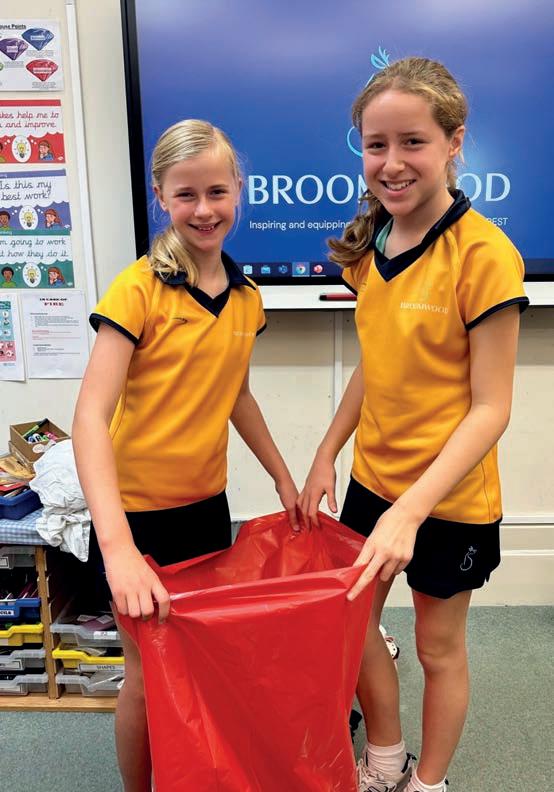
At Broomwood, a group of three schools and a nursery located in Wandsworth, south-west London, there are very strong community roots. This extends to partnerships with local organisations and good causes. Every two years the schools choose two local charities to support, with pupils voting from a shortlist suggested by parents, teachers or children themselves.
There are close links with other charities and outreach programmes, too – all supported enthusiastically by pupils. It may be a one-o fundraiser, or sometimes long-term support. For instance, with the school’s support for Little Village (a Londonwide charity for families with babies and young children) there are regular donation drives for clothes, toys and other essential kit. Pupils then take charge of sorting all donations for the charity. Lots of seasonal events and responses to specific appeals

“AT BROOMWOOD, THERE ARE REGULAR DONATION DRIVES, WHICH PUPILS THEN SORT FOR THE CHARITY”
also take place – for instance, concerts to support Ukraine, carols by candlelight, fun runs and a Christmas present drive for a local hospital’s children’s ward.
There’s an ongoing partnership with the local church, St Luke’s. Every week a few pupils head there to engage with people from its community group. They perform or share work they have completed or just talk and swap stories. It is a multi-generational community space that the school says benefits children as well as adults.
Broomwood pupils take their involvement in charity and giving back very seriously – leading the cake sales, voting on charities and fundraising diligently. They also fundraise on their
own at home, as well as engaging through visits and volunteering or more active events such as abseiling for the local hospital. All the positives from these activities are shared via assemblies – which often include guest-speaker visits from charities and groups.
The Broomwood team believe the real value of teaching children early lessons in giving back is that this helps them to gain a fuller sense of the world around the. It also encourages them to see things from the perspective of others. Focusing on giving rather than receiving builds self-worth, as children feel proud of their fundraising achievements and ability to support a good cause and do their best for others – be it family, friends or wider community.
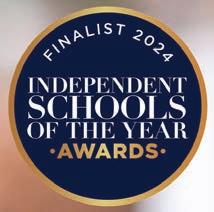










From phonics to physics, at The Downs Malvern, we provide an environment where every child can achieve their potential and thrive. It’s a place where curiosity meets opportunity, and where children learn to navigate their world with confidence –whichever path they choose.

Discover Malvern: Please use the QR code, or visit www.thedownsmalvern.org.uk, to book your private tour.
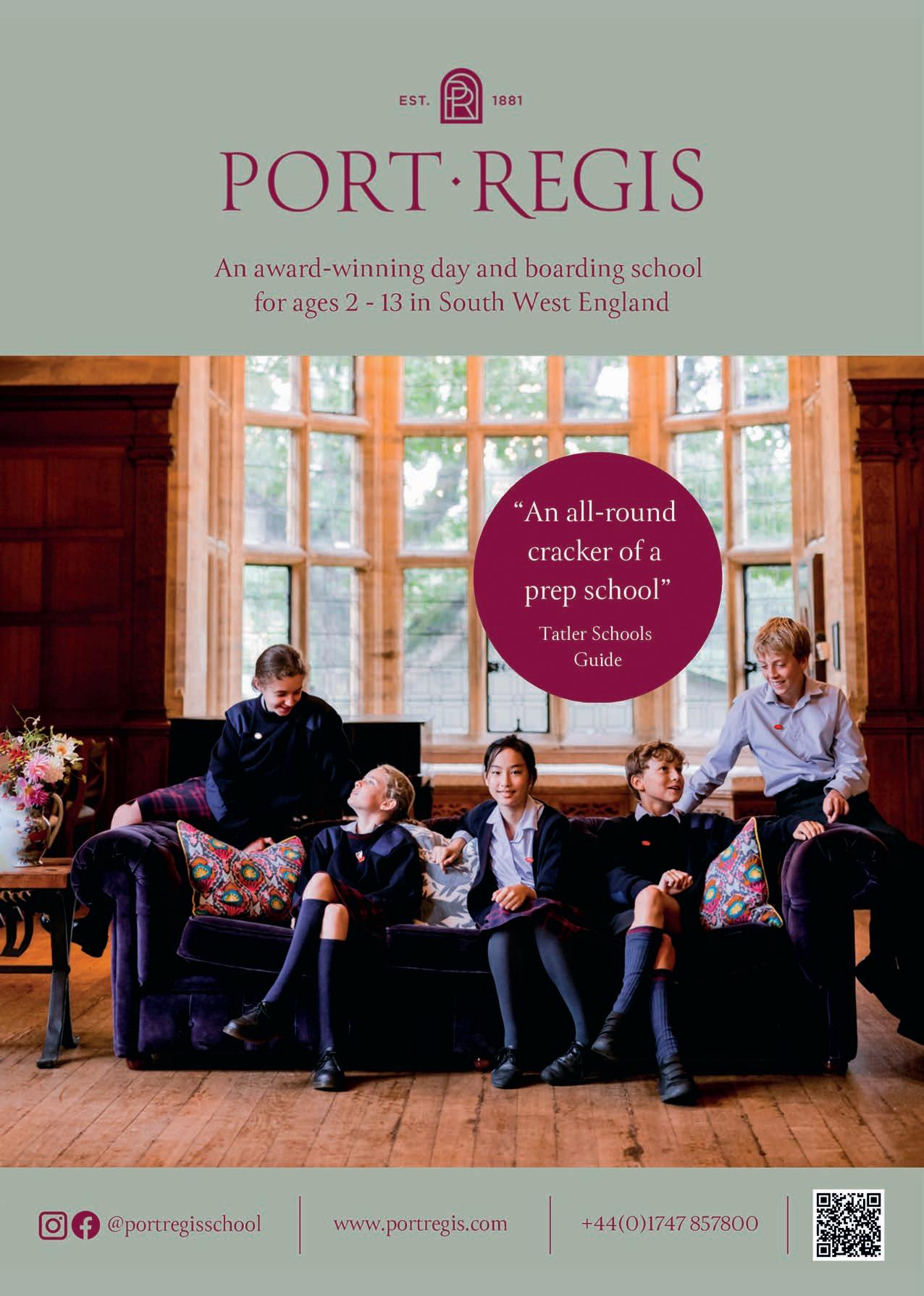

Heads at Royal Masonic School for Girls highlight the importance of a robust transition from Nursery to Prep
Transitioning from nursery to prep is one of the most significant milestones in a young child’s early educational journey. While it marks an exciting period of growth and new experiences, it can also present challenges for children and their families. Understanding how to manage this transition e ectively is crucial in supporting children’s emotional and social development, as well as their overall wellbeing.
Research consistently highlights that transitions in early childhood have a lasting impact. As Brooker (2008) observes, “Transitions in early childhood can either foster resilience or increase anxiety and stress, depending on how they are managed.”
Ensuring that these experiences are positive and well-supported can make a significant di erence in how children navigate their new environments and future transitions.
A key component in supporting this journey is ensuring a progressive and
adaptive curriculum matched to the needs of the child. Educational settings should create a seamless flow between the di erent stages of early years development. By ensuring that learning is dovetailed, from nursery through to prep, children can continue building on the skills and knowledge they have already acquired. This approach not only supports cognitive development but also gives children a sense of familiarity and security as they progress to more formal learning environments. Equally important is the quality of adult support during transitions. Dockett & Perry (2014) emphasise that “children who feel supported and secure during transitions are more likely to develop positive relationships with peers and teachers, which supports their emotional development.” Building strong relationships early on helps children feel confident and valued. This can be fostered through regular visits throughout the year, the introduction of key teachers before the start of the school year, and
“Strong collaboration between nursery and prep teachers can ensure continuity in learning and care”
familiar routines that provide continuity.
Parental engagement is another critical factor in a successful transition. Children are highly sensitive to their parents’ emotions and can easily pick up on feelings of stress or anxiety. Schools and early years settings can help by creating opportunities for parents to engage with their child’s new environment, whether through parent meetings, informal visits, or consistent communication. When parents feel informed and supported, their children are more likely to approach transitions with confidence.
Transitions are also opportunities for professional dialogue. Strong collaboration between nursery and prep teachers, as well as specialist educators, can ensure continuity in learning and care. This holistic approach means that children are not only being prepared academically but are supported emotionally and socially throughout their educational journey. Ultimately, the way in which early transitions are managed has far-reaching implications. These moments lay the groundwork for children to approach future transitions with resilience, emotional stability, and confidence. Research suggests that well-supported transitions lead to higher levels of engagement and achievement, contributing to both academic success and a child’s emotional well-being.
Transition, therefore, should be seen as a process, not a single event. It requires thoughtful planning, consistent communication, and a focus on building relationships. By creating secure, connected environments, early years settings can ensure that children are well-prepared for their next step—and for the many transitions that will follow.
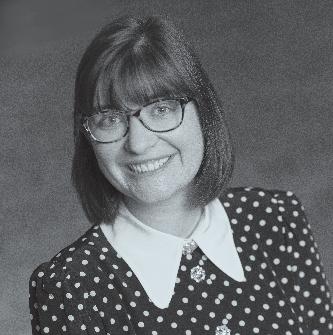

Head of Cadogan House (Prep school)
VICKY GRIEG
Head of Ruspini House (Nursery)

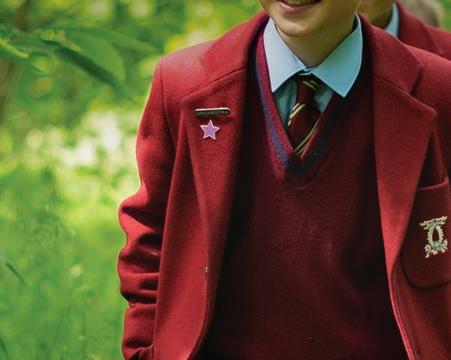
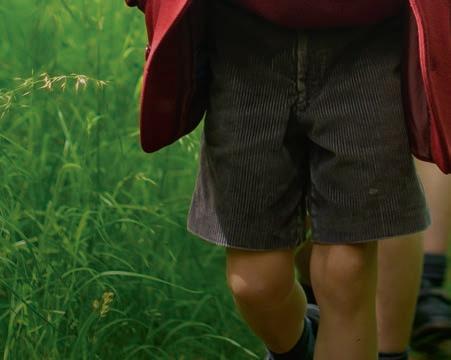

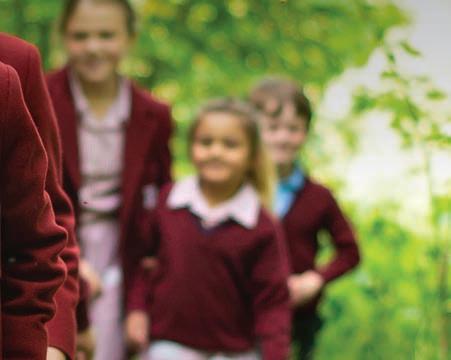
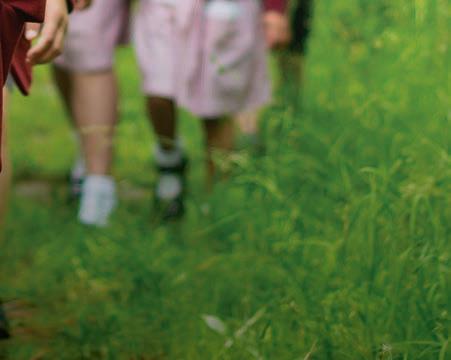



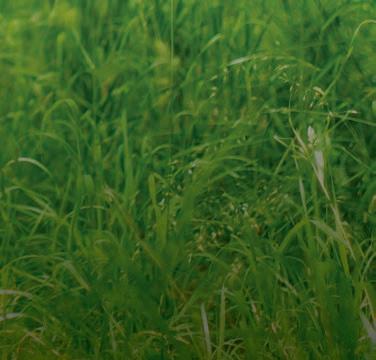


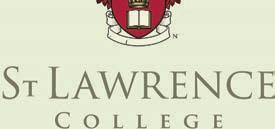
Our experts answer your questions on preparing for British entrance exams

NATHANIEL McCULLAGH
Q"My wife and I have always had our hearts set on a British education at a prestigious school for our children. I know the admissions tests are very competitive—how can we prepare them for these from thousands of miles away?"
AA British education is a cherished ambition for many families around the world, but securing a place at one of the UK’s best schools is highly competitive. For the most academic schools, only one in five applicants are successful. Preparation is key to improving your child’s chances, and it’s vital to start early. Depending on the schools you have in mind, that could
“Though many are naturally drawn to prestigious names, the best fit might be a school you haven’t yet heard of”
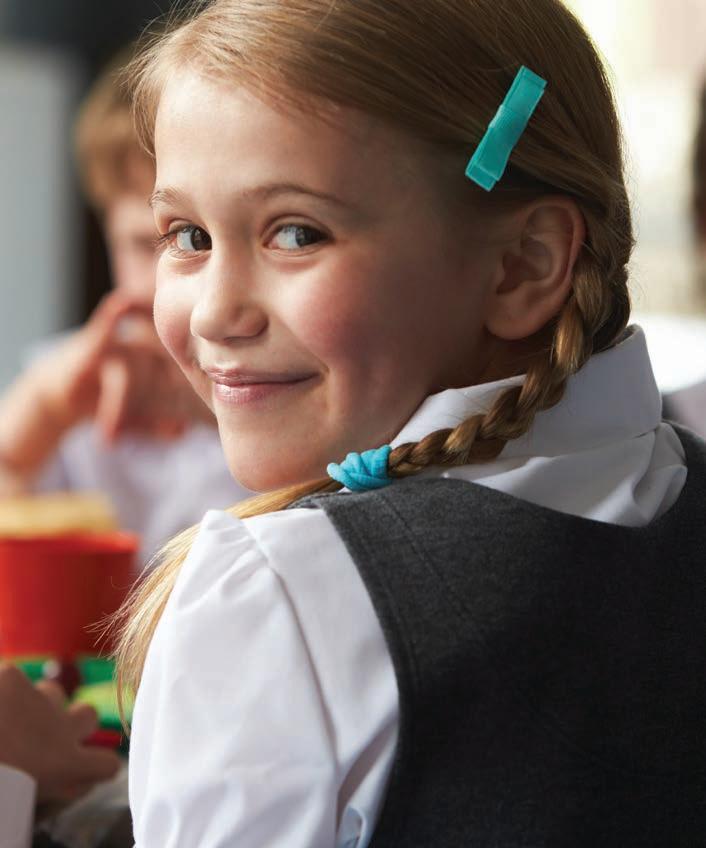
be as much as four years in advance. Prestigious boys’ schools like Eton and Winchester close their registrations for Year 9 (age 13) entry when the student is in Year 5 (age 9-10). For other schools, entrance assessments are taken 9-12 months before entry, and we recommend at least a year’s preparation beforehand. This means beginning your child’s preparation about two years before you intend for them to start their new school.
We advise parents to research as much as possible, starting with selecting the right schools. Though many are naturally drawn to prestigious names, the best fit might be a school you haven’t yet heard of. A child is much more likely to secure a place where they fit the school’s ethos. They will also perform better academically and thus have a higher chance of securing a place at a leading university. Knowing which is the right school can be immensely challenging from overseas, which is why many families work with education consultants like us, with firsthand knowledge of the British system, to shortlist schools and complete the applications.
Once you’ve selected schools, ensure you know exactly what your child is preparing for. Each school has a di erent entrance procedure and sets di erent entrance tests.
Many schools share information about their assessments online and some even publish past papers. You can always contact the admissions manager directly if you’re unsure about what will be tested. We strongly recommend working with a tutor familiar with the British school system and experienced in preparing students for entrance assessments. A good tutor will understand what schools are looking for and can also quickly cover gaps in underlying knowledge, which often makes the di erence between receiving an o er and a rejection. Many tutors have also worked with students preparing for British school entrance from overseas and will know the most common knowledge gaps to fill and pitfalls to avoid.
With the technology now available to tutors, including screen-sharing and interactive whiteboards, online tuition regularly gets fantastic results. If you feel your child would benefit from in-person instruction, companies like Simply Learning Tuition can also arrange residential tuition, where a tutor comes to live in or near your home for an extended period of preparation. Even a small amount of expert tuition will greatly improve the changes of a successful application round.
simplylearningtuition.co.uk
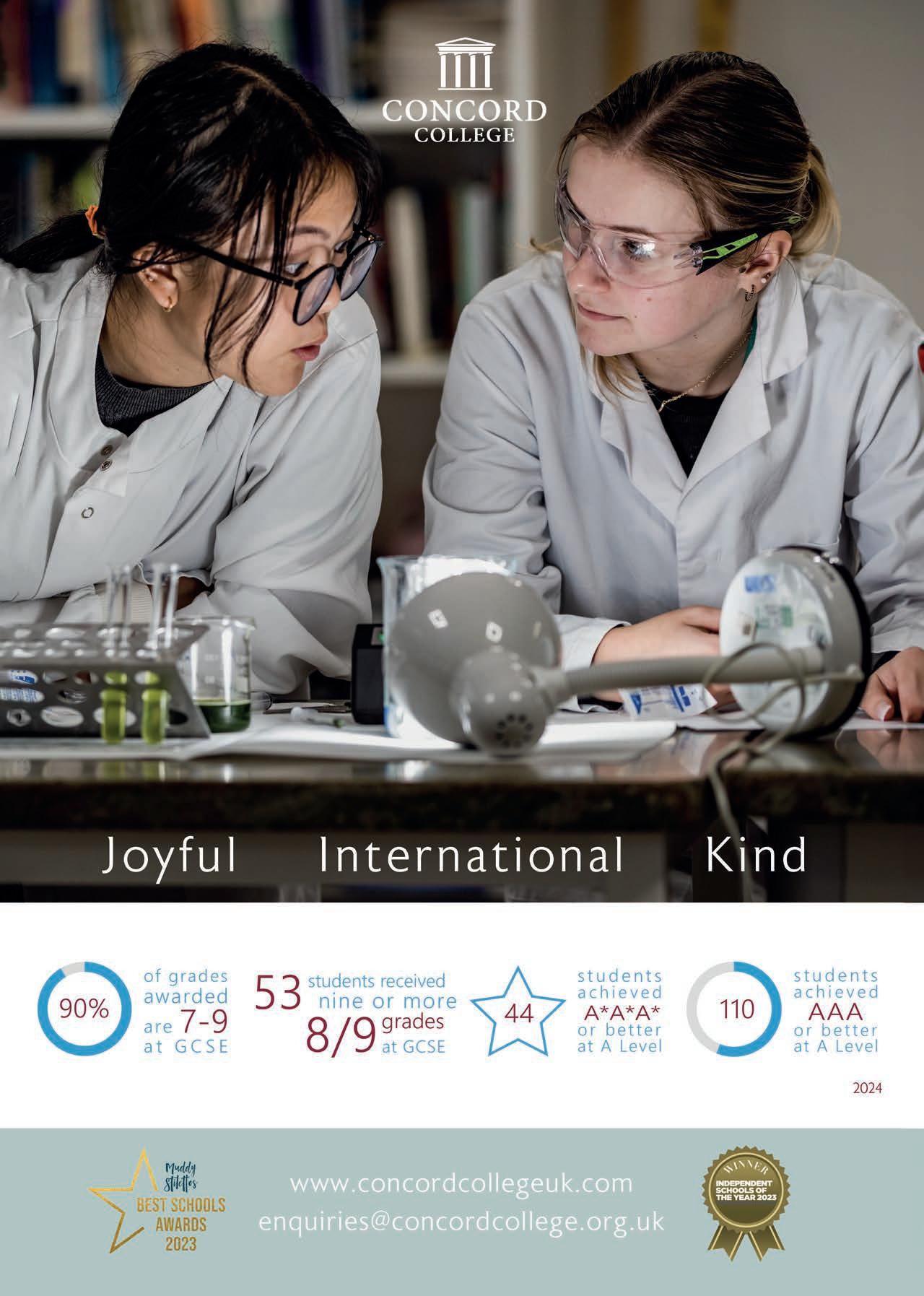

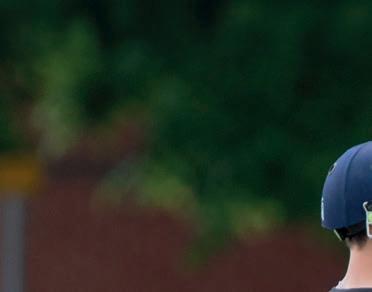

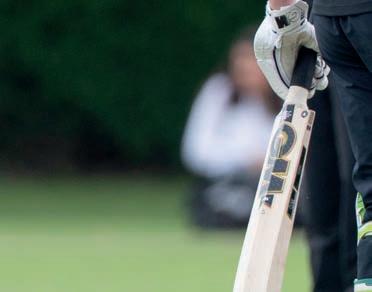
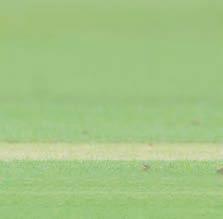


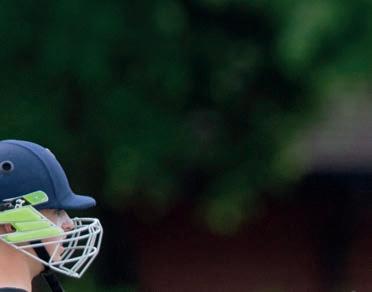
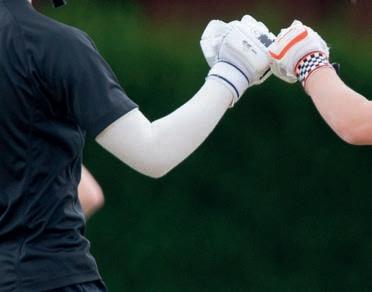


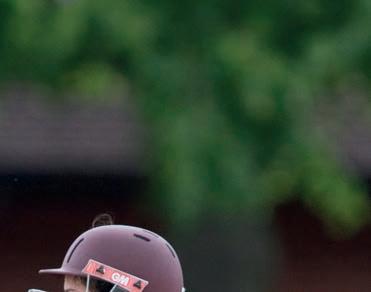
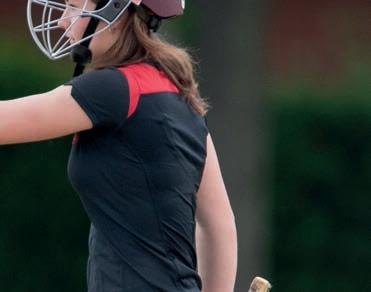
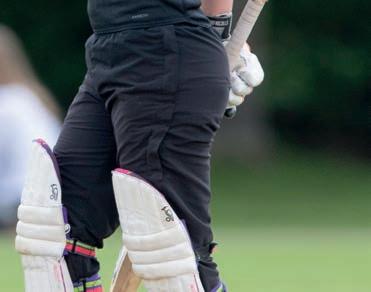


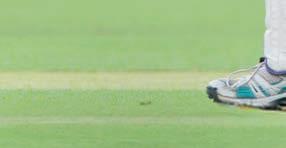


















Sport is great for health, but how does its competitive edge feed into a positive culture – helping young people to be part of something bigger and also achieve personal goals? Schools give us their take on its role in student success



At Oakham, sport is a fundamental part of school life. But Director of Sport Dr Iain Simpson says there’s something much more. “It provides a buzz to the school campus on match days when hundreds of pupils take to the playing fields, the pitches, the courts and the pool to compete.”
With around 50 inter-house sporting competitions each year, students are encouraged to take part and support their peers. All abilities get the chance to play against other schools – it’s as busy for the D team as their A team counterparts –all celebrated in the Oakhamian annual magazine via a season report. Oakham has many pupils playing for academies or on sporting pathways. “We formally support and recognise these achievements at our annual Sports Colours Presentation ceremony. When our 1st XV boys’ rugby team won the National Schools Cup at Twickenham for the third time in 2023, 850 pupils, parents and sta travelled to London to watch them compete,” says Iain Simpson. The school was also out in force when the U16 girls’ hockey team carried o silver in the Tier 1 National Cup Competition in March. Winning teams become role models, as do elite athletes at national and international level. “The most powerful role models are people like themselves,” says Iain Simpson. With that in mind, Oakham also celebrates alumni who have gone on to great things, inviting them back to give talks or run coaching sessions. And this has a massive impact. “For example, when England rugby player Jack Van Poortvliet returned to visit his old House and talk to pupils in Years 7 and 8, it was hugely motivational.”
Not everything ends in triumph – and Iain Simpson says it’s far better to have competitions that are closely fought, sometimes lost, when it comes to life lessons. “We reframe the idea of failing and view it as simply not achieving

everything that we set out to do,” he says. “It is really important that we challenge our pupils so that they encounter a mixture of success and failure and are equipped to react to both in a way that is reflective, positive and purposeful.”
This translates back into the classroom. “As part of Oakham School’s Connected Curriculum, we overtly teach the skills, behaviours and habits that young people learn through sport,” he says.
“The child who learns to set targets and work hard towards challenges in their sporting environment, and to problem solve and overcome those challenges, is then equipped to do the same thing in the classroom and beyond.”
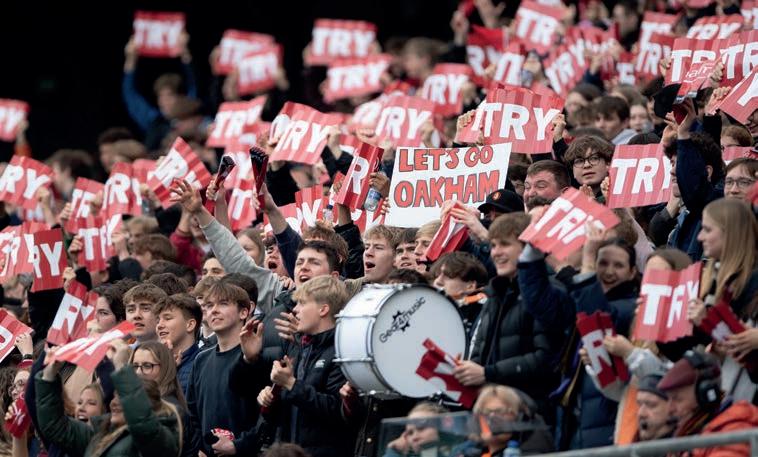
At Reed’s in Surrey, there’s a long tradition of success in sport – with recent wins in areas such as hockey, tennis, ski racing, athletics and golf. But Director of Sport Andy Watts says that wins aren’t the only measure of success – and sometimes they aren’t the best measure. “Setting up fixtures that include challenge is vital, as it builds resilience, helps with problem solving and encourages di erent ways to overcome adversity.”
The school o ers team sports from A-F level and beyond, and with an expectation that all pupils are involved on Saturdays in First and Second Forms (Years 7 and 8). Coaching and facilities, and matching players to teams with comparable depth, support success and build skills. “Involvement in sport only enhances what happens in the classroom. Developing time management skills, working collaboratively with others and stepping out of your comfort zone can all contribute to academic progress,” he says.
Reed’s has highly ambitious pupils pursuing high-level sport. They may start their day in the gym, fitting in one-to-one technical sessions in their free periods and then committing evenings and weekends to training and competing “This level of dedication is one of the most impressive aspects of the modern pupil athlete,” says Andy Watts. But it isn’t just pupils





pursuing elite sports pathways who commit time to improve – the school has noticed increasing demand for its Strength & Conditioning programme across the cohort. Success is recognised weekly via assemblies. “Captains read out all results: the wins, draws and losses. It is important to recognise all competition and sometimes the best received reports are losses where teams have given their all. This public recognition is important,” says Andy Watt. Reed’s encourages young people to aspire to sports leadership roles, too. “The skill of coaches and teachers is to try and provide opportunity for success, but also learning how to deal with losing, coping with adversity and overcoming any fear of failure,” he says.
“Communication of selection is vital face-to-face, as indeed is rewarding e ort, not just the outcome.” He adds that it’s important not to shy away from the e ort involved. “Success isn’t just about winning, as nice as that is, it is about the hard work behind the scenes.”
At Tonbridge, sport is part of day-to-day life. “Sport is integral to our school’s ethos, with all students engaging in activities at least three times weekly,” says Director of Sport Chris Morgan. “We believe it fosters character development, o ering equal opportunities for personal growth regardless of skill level or team a liation.”
National and international achievements significantly influence Tonbridge students’ enthusiasm about sport. All the better when you have alumni to get behind. Current OTs shining bright include Ben Earl in rugby and Zak Crawley in cricket – both now England regulars. “They serve as inspiring role models, driving increased interest and participation,” adds Chris Morgan. Those on a potential elite sports pathway receive tailored support through the school’s mentorship programme. This includes guidance from performance coaches and sta members who have navigated similar elite challenges. “This holistic approach prepares students to aim high while equipping them with strategies to manage setbacks.”
Winners and losers both deserve positive feedback, and the focus here is on building a supportive culture. “Coaches, supported by teachers, provide context and understanding, emphasising the broader educational value of sports,” says Chris Morgan. The Tonbridge team know that the lessons learnt in sport translate into the classroom and help students confront fear of failure. “These sports experiences equip them with

essential life skills, fostering adaptability and perseverance in facing challenges.”
Not every child can be (or aspires to be) top in games. “We promote a culture that values participation and emphasises the broader benefits of sports,” says Chris Morgan. There are some 20 on o er here – all the mainstream choices plus more o beat options such as fives, ultimate frisbee and rackets. In the ‘major’ sports, the school regularly fields 25 rugby teams, 14 hockey teams, 17 football teams and 17 cricket sides on weekend fixtures.
Tonbridge’s ultimate aim is to engender a love of sport that lasts into adult life. By that measure, they are definitely winners. “The OT cricket side has won the Cricketer Cup more than any other school, the OT Golf side has won the prestigious Halford Hewitt the most times and the OT football club has continued to grow in recent years and now, on a weekly basis, fields two sides,” says Chris Morgan.
“It is important that pupils encounter a mixture of success and failure and react in a way that is positive”
While there has always been a tradition at independent schools of playing to win, at Malvern College there is recognition that there’s a much broader purpose and meaning to success. Silverware still counts, but the primary intention of the school, alongside the fun and the health benefits of sport, is to develop personal qualities. Training is designed to develop collaborative skills and encourage students to compete but still show empathy for others.
The school believes that playing sport, whether at elite or recreational level, is a means of developing both talent and character. Challenging games teach transferable skills and wider intelligence. Malvern College is, of course, proud of those who shine at elite level.
Upper Sixth pupil Noah Goryn is part of British Fencing’s athlete development programme. He has balanced studying for his IB Diploma while winning gold at the British Youth Championships. The College sees the benefits beyond his sporting achievements in this opportunity to travel, developing his cultural intelligence and language skills. He’s also managed nutrition, sleep and wellbeing practices that are hugely beneficial to preparing for exams.
Last year, Fergus Morris and Will Clayton donned the striped shirts of the



U18 Barbarians Rugby Club. The sports team at Malvern College say they reap the benefits of these school successes because when a pupil trains with a specialist coach or team, they bring these skills back with them. Also, the skills are hugely transferable in learning and life situations.
Daisy Tuthill, who plays hockey for Wales U18, models the skills of organisation, selfregulation and discipline on a daily basis as a College Prefect. She was nominated by her boarding house because she’s admired as a role model. And when Old Malvernian Rose Harvey made headline news as ‘The Covid Lawyer turned Olympic Runner’ she demonstrated to students at the school how the skills and qualities that bring success in life and work sit hand-in-hand with the skills and qualities needed by an elite athlete.







Sport is integral at Wycli e College – from prep to the top of the Senior school – says Director of Sport Ben Taylor. “Pupils have a huge variety of opportunities to play competitively, but also engage in a wide variety of cocurricular sporting activities that cater for our culturally diverse community.”
He believes there has been a shift in the way young people view elite sport, perhaps due to social media. “Reels of goals, tries and celebrations are a great motivator, but can also provide pupils with an unrealistic perception of what sport might be like.” Wycli e’s approach helps to counteract that medals and glory perspective. “The highlight of the school sporting calendar is our ‘Legacy Sports Day’ held before our Athletics Sports Day,” says Ben Taylor. “No one can play a sport that they have competed for school in before and must try something new. This creates a brilliant level playing field.” With all the traditional sports on




tap, Wycli e has also diversified to ensure everyone finds something they enjoy.
There are many pupils at the school who are on elite pathways, supported through its scholarship programme.
Wraparound care includes a strength and conditioning coach, physio and sports therapists. There’s also nutrition advice and access to sports psychologists. “Current professional players from di erent sports come in throughout the year to talk to pupils about their journey and give the pupils real world advice,” adds Ben Taylor.
Inevitably, elite pathway can bring setbacks. Then the team help students to either progress or use this setback as a learning opportunity. Disappointment doesn’t just happen at the elite end – so there’s an important balance to be struck. “We encourage all pupils to look deeper into their losses and use them as a development tool. There is no straight line to success and if we can help pupils to understand this then the benefits can be seen in all areas of their sporting and academic lives.”
Sport fosters a sense of community at Kew House. Celebrating wins, supporting teams and individuals, and recognising achievements all promote a positive culture around sport – also reinforcing ideas around teamwork, dedication and perseverance. But the school believes it’s also vital to teach children that failure is a natural part of both sport and life. The emphasis here is on e ort rather than simply outcome – teachers and coaches provide constructive feedback to help young people cope with setbacks and build resilience. Their support is designed to help young people to reflect, set realistic goals and focus on continuous improvement. This fits one of the mantras of Kew House: ‘What can I do di erently next time?’. Not all children are naturally gifted at sport, and there’s emphasis on inclusivity and variety – helping children discover sports and activities they enjoy and may excel in. That’s why the school maintains a compulsory curriculum time for girls and boys to be playing together in Core PE lessons. The school adds it’s important that young people learn to appreciate playing sport together throughout Years 7 to 11.
The sports team know that providing a variety of choices of sport, emphasising skills development over competition, and giving encouragement to less able or willing students, works. It’s about reinforcing the value of participation and personal improvement rather than just winning. All abilities get the opportunity to participate in interschool fixtures against carefully matched teams throughout the school year to highlight the fun and camaraderie of a competitive sporting environment.
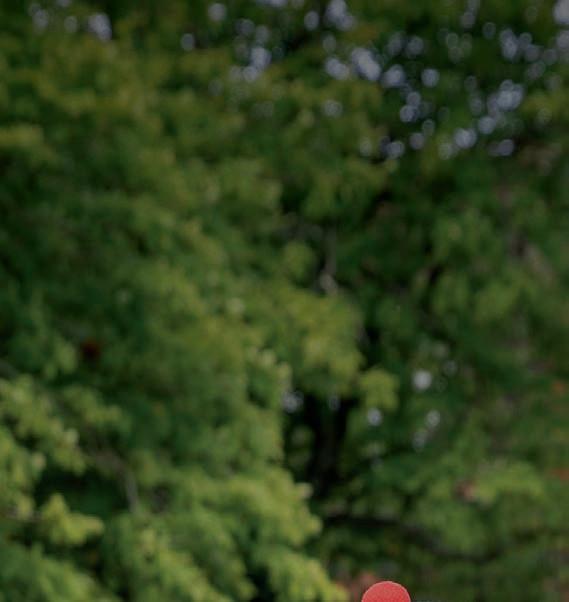
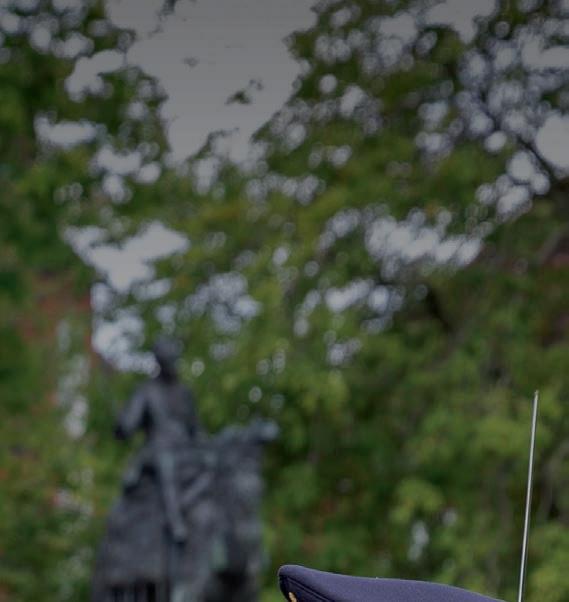







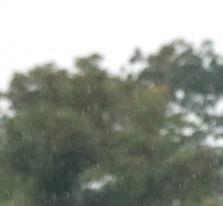
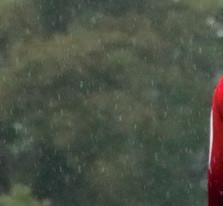

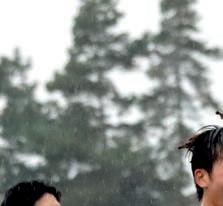
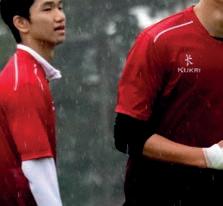

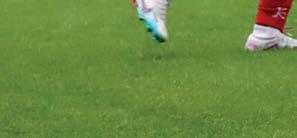


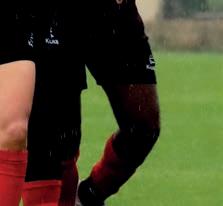
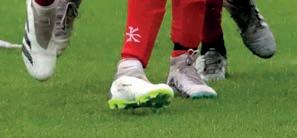

For Kew House students on an elite sports pathway, there’s the Top Performing Athlete Program (TPAP), with guidance on goal setting, time management and coping with setbacks such as injury or de-selection. It includes advice around physical development – including the importance of continuing education, maintaining wellbeing and building life skills to prepare for alternative pathways and a future beyond sports. The results for Kew House students have ranged from an international wake-boarding champion to girls and boys winning places in football academies across west London. Rowing is also developing into a key strength.
The team say that sport is a vibrant element of the school community, but also helps to shape young people’s attitudes, skills and values by enabling them to to promote their personal development and ability to thrive in the future.


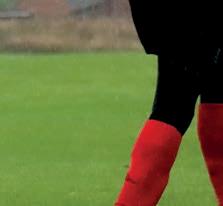

At Concord College sport is used to broaden the international cohort’s experience and present alternative challenges. It is also a key tool to help young people manage their physical and mental health. The focus is giving each student the opportunity to play sports they enjoy and at a level they choose. It’s also a key area of House competitions, so a vehicle for friendly rivalry and relationship building.
Every Wednesday there are varied games sessions for Years 9 to 11. All students have a ‘twilight’ programme available in their 4pm activity time, while boarders attend one ‘sports prep’ a week where they choose their own activity. Wins and achievements are celebrated school-wide – and via social media as many parents are international.
Concord College recently made it to the Society of Heads U18 National Cup Final for football for the first time – taking many supporters along to cheer on the team.
With such a diverse community, the sports team at Concord College also see diverse attitudes to sporting fails. They place emphasis on personal growth and persistence. This is all supported by the adventurous outdoor programme, which uses the fantastic local landscape to expose young people to carefully supported challenges. The repeated practice needed to master a new sport or

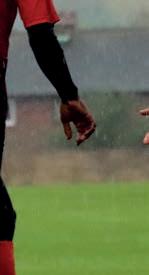

face an unfamiliar challenge such as abseiling is a great resource to draw on in class.
Concord College’s highly successful DofE programme dovetails with sport and outdoor education – last year four students achieved gold and one became a DofE Ambassador. Such challenges help students deal with stress, learn teamwork and find out more about their own capabilities. Reflection and goal setting are also carried back to class. Sta and pastoral teams make sure they celebrate determination and ability to get back up and try again alongside every success.
Some students join Concord in Year 9 unable to swim or ride a bike and the progress to National Lifeguard Qualification or mountain biking can be a milestone achievement. Others join with high sports aspirations and, while there are no sports scholarships here, the elite programme provides sta mentoring and specialist support. There have been high achievers in many fields, from cricket to fencing, Formula 4 and golf. Last year, Concord came top in the county for basketball and fielded successful badminton and table tennis teams. And a Year 13 runner scooped a Welsh national fell running championship and now has an Oxford Blue in cross country. Another Year 12 student has just brought home a silver medal for Singapore in a major men’s windsurfing competition.
“Developing time management and stepping out of your comfort zone contribute to academic progress”



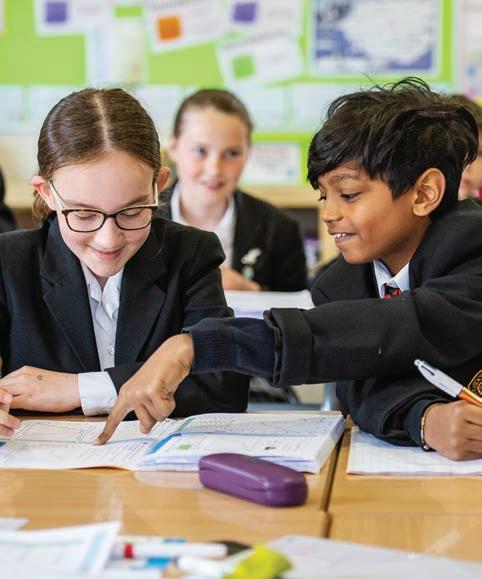
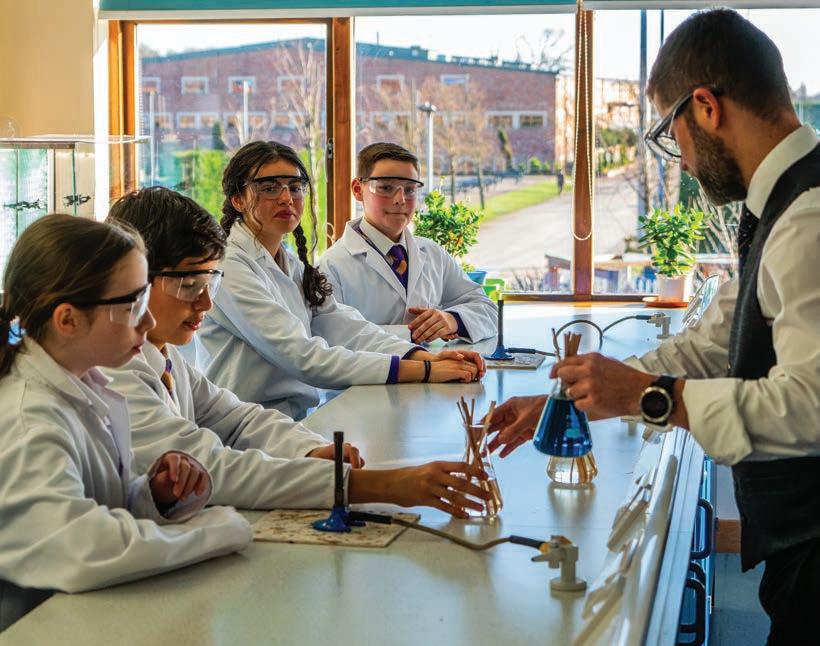
The Academic Director of QE on how STEM subjects deliver transferable skills to benefit all students, wherever their passions lie
Fostering an understanding of STEM from an early age teaches transferable skills such as critical thinking, problem-solving, exploration, collaboration, and innovation. Children, particularly younger children, are built to learn through exploring their environments, so encouraging this at an early age creates a passion for independent learning and the ability to tackle challenges confidently and creatively.
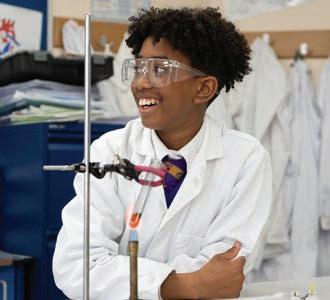
At Queen Ethelburga’s Collegiate (QE), we o er a wide range of STEM subjects throughout all school years and levels. Alongside that, the school o ers a broad range of extracurricular STEM activities. These include opportunities such as the Practical Science CREST Award, Critical Thinking Club, Advanced Mathematics Club, QE Motorsports, the annual Suturing Workshop, Psychology Club, and the Medicine and Veterinary Society.
Our students can also send items to space annually as part of the Mars Balloon national initiative and collaborate with local students on QE Volcano Day and QE Bath Bomb Day. Students also compete in a variety of national competitions, including Cambridge Chemistry Challenge, UK Biology Challenge and the University of Warwick National Scientific Challenge.
For those students looking to apply to medicine, dentistry and veterinary courses, we host a mock MMI interview as part of the Early Applicant Programme –supplementing this with weekly one-to-one application support. Other vital applicant experiences, such as volunteering in local care homes, alumni seminars, work
“Students with a good grounding in STEM adapt to many different environments – analysis and creative thinking give them an advantage”
experience support and regular talks from a retired GP, are also part of this programme.
We know that students with a good grounding in STEM skills are able to adapt to many di erent environments, where technology, analysis, creative thinking and creating solutions to problems give them an advantage. This may be a STEM field or a di erent pathway, such as art and design.
Many of our students are interested in pursuing STEM-related pathways. This year, 133 students have received conditional o ers for science-based degrees, while a further 101 have conditional o ers for mathematics, computer science or engineering-based degree courses. Another cohort of students are hoping to embark on design and architecture courses.
QE is built on encouraging students to ‘be the best they can be with the gifts that they have’ and so we are dedicated to encouraging students wherever their passions lie. We o er a variety of lessons that meet di erent learning styles and needs, also encouraging extracurriculars that support individual ambitions.Our rich mix of classes, clubs, events, seminars, competitions, and leadership roles provide ample opportunity for students to challenge themselves while also finding their path. By focusing on each individual and their needs, we deliver our curriculum and extracurriculars in a way that enables young people to get the most out of their time at QE. This is why, alongside 100 enrichment activities, we seek out beneficial opportunities that o er something unique.
A recent example of this would be our project to create, release and choreograph the hit song and music video, ‘Feels Like Home’, alongside the record production, DJ and songwriting duo Billen Ted.


Sam Baldock of Bedford School on the importance of teaching entrepreneurship alongside traditional academic skills

There can be no doubt that AI continues to change the world we live in. In schools, the ways we make use of AI to leverage student learning are growing by the week. But there’s still much that it can’t do. And in those gaps lie some of the most important areas to focus on if we’re to fully prepare all our young people for this challenging and changing world they’re emerging into every year.
Yes, the world is a digital one now. But equally, in this AI-driven domain, it has never been more important to accentuate the wonders of being human. A backwards-looking algorithm cannot replicate the imagination, empathy, courage, and persuasive verve required to lead in the future – and we’re adding emphasis to this at Bedford School.
A while ago, we called our governors together for a strategy awayday. We needed their advice, drawing from their experiences as business leaders and professionals. We
asked them to help us identify the skills and attributes our boys needed to have by the time they completed their education. And from there we extrapolated backwards to create three areas of strategic focus that would sit alongside academic success to ensure our students were ‘future-ready’.
The first was obvious and can’t be ignored – digital technology – but the other two were ‘human’. Like many schools, we recognise the importance of service and so our second area of focus centres on our Community Partnership Programme. But it’s the third strategic area focus I’d like to elaborate on here: Entrepreneurship.
Gone are the days of a ‘job for life’. Young people leaving schools such as ours are likely to have several careers, self-started and perhaps running concurrently. Our Entrepreneurship Programme combines elements of leadership training (both self-
“Our Entrepreneurship Programme combines leadership training with initiatives to help students devise ideas and drive them forward”
leadership and leading others) with practical initiatives to help students to devise ideas and drive them forward to fruition.
It’s a hugely popular part of the curriculum, stretching all the way from a Dragons’ Den-style initiative for our sevenyear-olds to mentoring workshops for recent leavers. This year 30 boys stayed on for a week after GCSEs to take part in StartUp!, a five-day course where they hatch an idea, work with external mentors and drive it through to launch. Some were focused on making money, others on the social benefits.
Our alumni community of Old Bedfordians and parents are wonderfully supportive and lend the programme its authenticity – real-life entrepreneurs are regularly involved. And this year we introduced a BTEC qualification to the Sixth Form in Enterprise and Entrepreneurship, weaving the thread more firmly into the examined academic curriculum of our school.

Head Master Bedford School
Anyone choosing a school these days has many dimensions to consider but a parent looking to give their child the best chance of a successful career in tomorrow’s world would do well to consider a school that puts entrepreneurship near the top of the list.





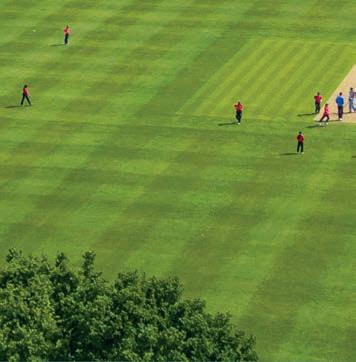


Our size, structure and ethos mean that our entire focus is on understanding, guiding and inspiring each child individually – so they can find their self-belief, discover their own talents and challenge themselves to achieve more than they thought possible.
Take a look at our digital tour, and arrange a video call with us today
Chris Hutchinson, Headmaster of Royal Russell, on its Development Foundation and campaign to raise a million pounds by 2028
Royal Russell’s motto, Non Sibi Sed Omnibus, translates as ‘Not for oneself but for all’, a principle that has guided our school since its original foundation in 1853. Thanks to the commitment of patrons and dignitaries, including Charles Dickens, it opened as the Warehousemen Clerks and Drapers Schools for Orphan and Necessitous Children. The school has since grown significantly and we now have more than 1,200 pupils, both boys and girls, aged 3-18, on our 110-acre campus.
In Croydon, less than half of 16 to 18 year olds take the A-level exam necessary for university entrance, and fewer than 8% of students have access to a Russell Group University education. Our school partners with local primary schools and the Rowdown Foundation to run a tuition programme for academically able children
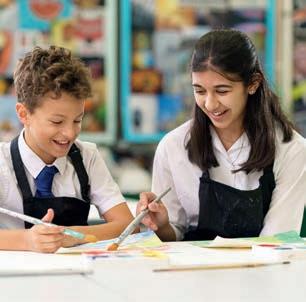
“In 2028, we will be celebrating the school’s 175th anniversary – the Bursary Campaign aims to raise £1m”

who are at risk of not fulfilling their potential due to their financial resources.
We now mark the next chapter in our history with the launch of the Russell School Development Foundation, a charity dedicated to creating a programme of fundraising that will establish additional means-tested bursaries to support pupils.
In 2028, the school’s 175th anniversary, the Foundation’s 175th Anniversary Bursary Campaign aims to raise £1m to ensure that up to 10% of pupils can receive financial support to attend our school.
There are many talented and deserving young people in local communities whose lives would be transformed by such an education. Through the bursary scheme we are able to help overcome the barriers placed in their way and disrupt the pattern of stalled social mobility.
Old Russellian Joshua (2019-2021) is one of the talented pupils who came to us on a sports scholarship and bursary. This helped him pursue his academic interests
as well as his talent for football. He is now enjoying his third year of a degree apprenticeship at Mace, working in the Project Controls discipline. Reflecting on his time here and the life-changing impact, Josh commented: “You can’t box yourself in at Royal Russell and they won’t let you anyway – they’ll push you to become the best version of yourself”.
The Development Foundation is governed by the Foundation Board of Trustees, chaired by Sir Philip Moor. Trustees are drawn from all sectors of the school community and are Bursary Fund supporters in their own right.

As such, they are able to represent the views of those who donate and ensure that all donors’ wishes are respected.
I hope that many of our parents, former pupils and other supporters will feel able to join me in committing to help as many pupils as possible to receive an outstanding education, enriching their lives and benefiting the whole school community.
Framlingham College in Su olk on why delivering skills to help children grow and thrive in future life is as important as academic results
As education requirements continue to evolve in response to an everchanging world, schools are rethinking not only what they teach but how they assess learning and potential in their young people. At Framlingham College – a day and boarding through school in Su olk – the focus is on developing good human beings, not just delivering stellar academic results.
Principal, Louise North says: “Academic achievement should be viewed as a byproduct of the educational experience rather than the sole measure of a successful education”. This philosophy reflects a broader shift in education, as schools and parents question the long-standing reliance on traditional testing systems, such as Common Entrance (CE) and GCSEs, as the best way to assess pupils.
“The role of education in the 21st century goes far beyond memorising facts and
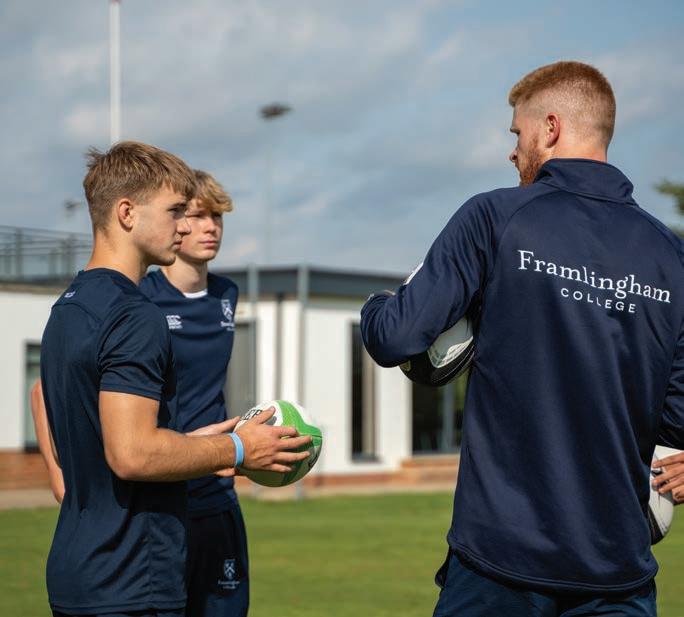
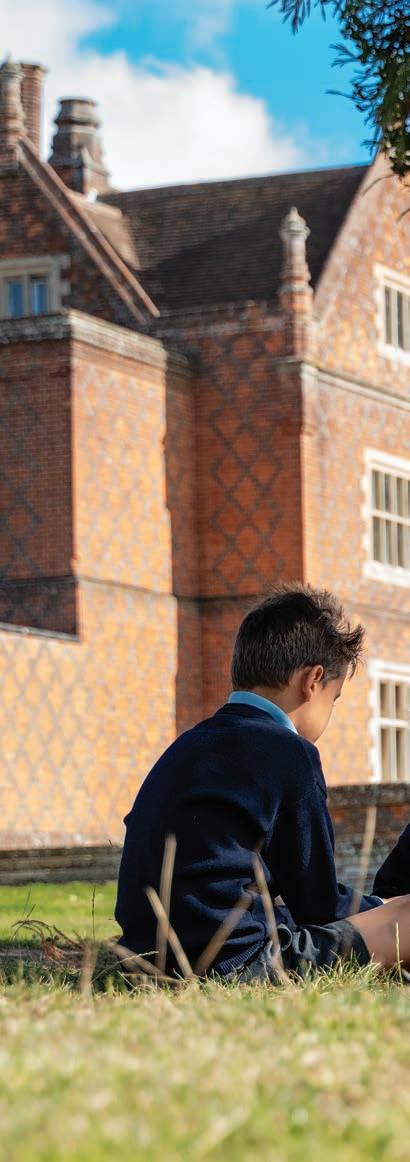
regurgitating them in exams. In today’s fast-paced, technology-driven world, the skills, knowledge and understanding that our young people need are rapidly changing,” says Louise North.
The World Economic Forum has noted that employers are looking for a skillset that encompasses creative and analytical thinking, resilience, technological literacy, and emotional intelligence. At Framlingham, these habits are embedded into educational provision, with the focus on encouraging pupils to be ambitious, nimble and creative in their thinking, and to embrace change rather than fear it. “As educators, we must ensure that our educational provision evolves to reflect the future adult world of our pupils, equipping them with the skills, confidence and resilience that they are going to need.”
This, adds Louise North, also impacts the whole approach to teaching. “The

traditional role of teachers as omniscient figures imparting knowledge has changed significantly. In an era where information is readily available at the touch of a screen and AI is ever more present in all that we do, the role of educators is increasingly to teach young people how to acquire and apply knowledge, and why it is relevant to life beyond the classroom.”
One area where Framlingham College has reflected the changing nature of life beyond the classroom is in Years 7–9. Having abandoned Common Entrance, the curriculum has been reshaped to focus on building a love of learning and an intellectual curiosity. This means the curriculum takes a thematic approach to learning, developing skills such as collaboration and creative thinking, independent research and oral presentation skills. It also focuses on ensuring that
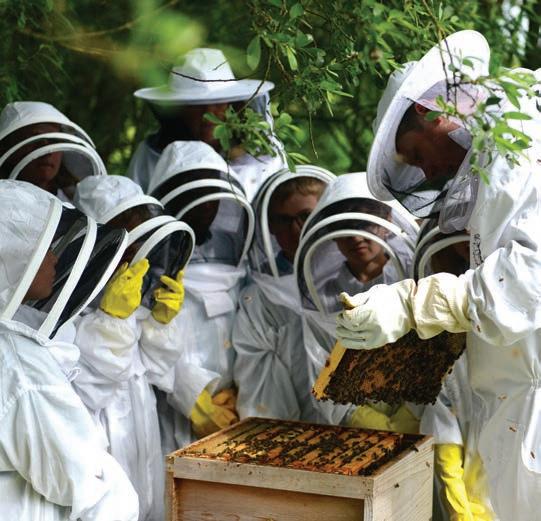
“The role of educators is increasingly to teach young people how to acquire and apply knowledge, and why it is relevant”
pupils make connections between their subjects – learning Music through Maths or Geography through Biology, for example.
“We understand the pressures that young people face, especially when preparing for senior school entrance testing. These are pressures that can significantly reduce their spirit of enquiry and love of learning,” says Head of Framlingham College Prep School, Simon Roche. “As an all-through school, we are fortunate to be able to create a shared and seamless learning journey from Prep to Senior, through a curriculum that develops skills and resilience, while also ensuring that the joy that comes from deepening knowledge is kept alive.”
To assist with keeping that knowledge development alive, Framlingham College uses a combination of teaching methods, including project-based learning, experiential learning, and traditional
instruction. This supports teachers to deliver rigorous and purposeful lessons, where pupils are encouraged to see ‘a bigger picture’ and spot interrelationships between themes. “Our integrated approach to learning reduces many of the stresses of transitioning from Prep to Senior, giving pupils the confidence they need to succeed without feeling overwhelmed by the process,” adds Simon Roche.
Framlingham College Principal Louise North adds that now, more than ever, schools need look to the future and prepare young people to thrive. “Education should be about more than just exam results, and pupils should not be defined purely by their performance in a narrow set of assessments. Instead, the focus should be on preparing them for the world beyond school – one where creativity, resilience, and the ability to adapt to change will be essential.”
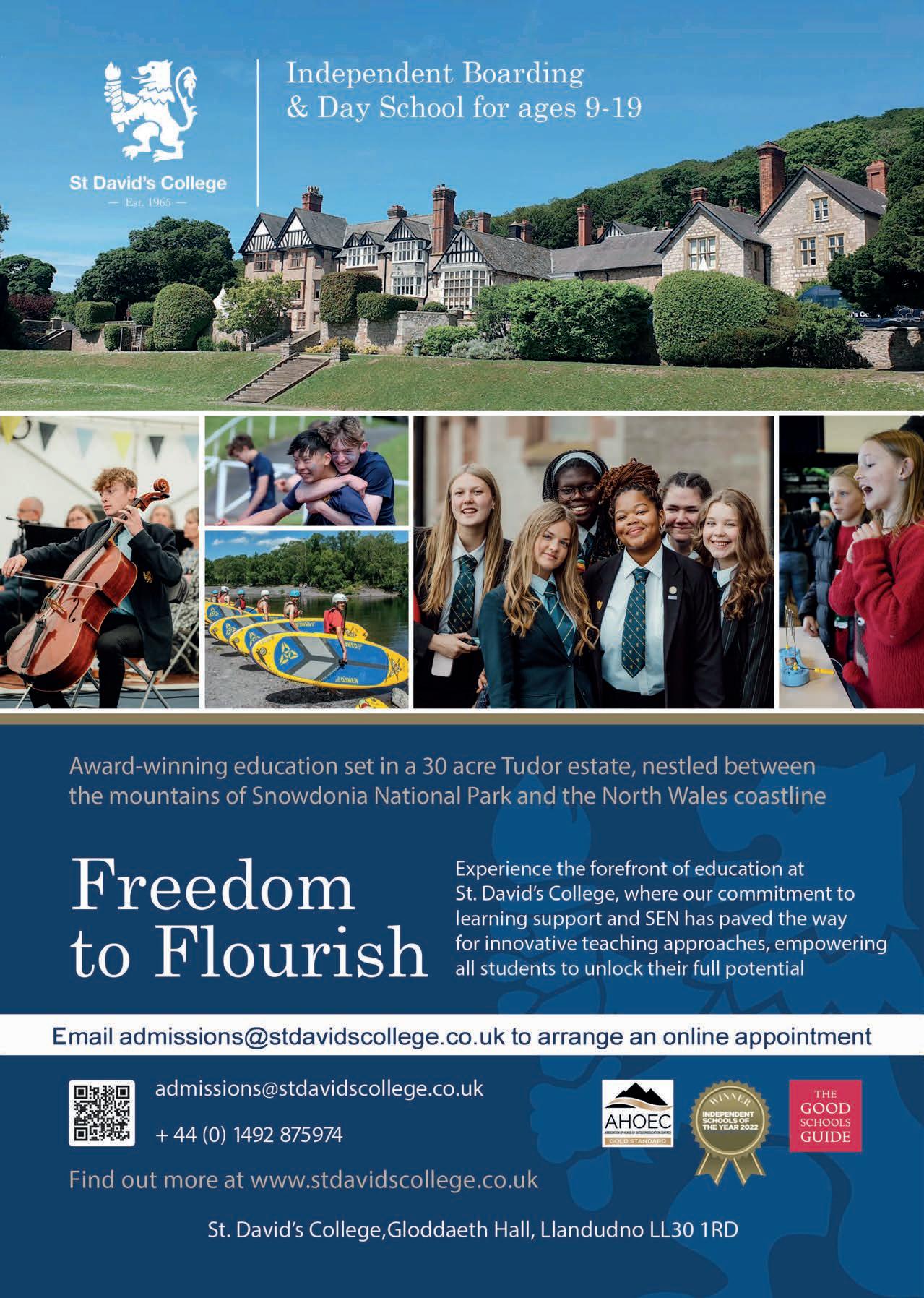
Vicky Morgan of Marymount International School London, on positive tactics that inspire students to enjoy playing sport
At the inaugural Laureus World Sports Awards in 2000, President Mandela said: “Sport has the power to change the world. It has the power to inspire. It has the power to unite people in a way that little else does. It speaks to youth in a language they understand”. As a History teacher who has transitioned into the role of an Athletic Director, I can see at a school level how these inspirational words can be applied to the systems of school institutions.
Starting my career as a basketball player and football player, at a time when these sports o ered so little funding for girls and women, I am excited at the dynamic changes that are happening in women’s sport. In 2022, watching the women’s Euros at Wembley and the Lionesses
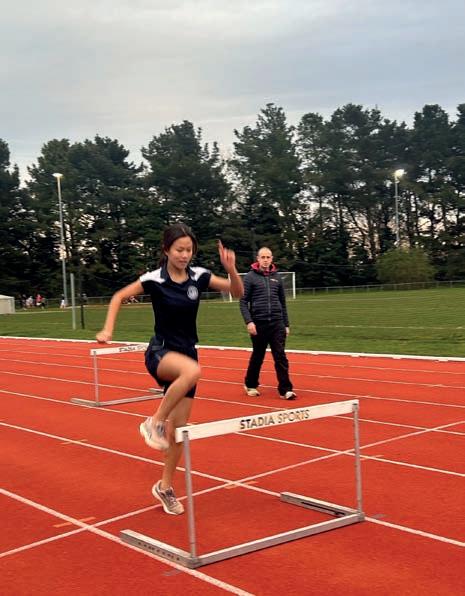
“Starting my career as a basketball player and football player, I am excited at the dynamic changes happening in women’s sport”
winning the final in front of 90,000 fans, I saw the changes happening in front of me – I am genuinely excited about the shift that is occurring at an elite level.
However, at a school level, how do we as educators inspire young people to embrace the fact that sports and movement are as important as academics? The answer is within the school’s culture and means providing a diverse range of options. We have a headstart at Marymount since the IB requires its scholars to participate in an activity throughout their academic journey. This potent mix of wanting to participate and being required to do so, inherent in its structure, removes the obstacles teenagers may invent to not participate. And, because everyone does participate, everyone does!
At Marymount London, options range from team sports – including volleyball, football, and basketball – to martial arts and specialist dance training. We also have a strong tennis programme. At Middle School, we have over 75% of students taking part in at least one form of movement co-curricular activity, and we try hard to provide opportunities for girls in High School to continue to balance their academic commitments and exercise. We o er morning training sessions, and use of the fitness suite in free periods – important extra opportunities when demanding workloads, especially in exam years, may become barriers to student participation.
As a female Athletic Director, I have also found that teenage psychology is so important, especially so with girls. Positive motivation and listening to your
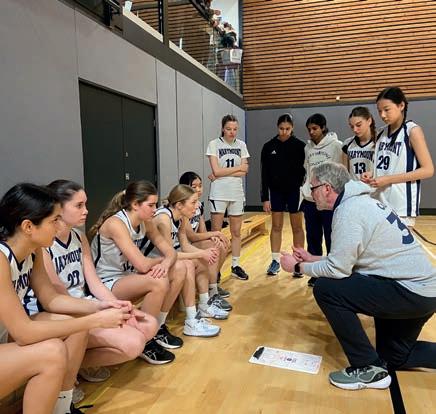
students about what they want their sports programme to look like are both essential if you want to ensure high participation. We want girls to be confident in how they move their bodies, and we bring into the curriculum important conversations around the menstrual cycle, overcoming barriers in sport, teamwork skills, and how to become resilient.
Understanding every individual student is also vital. One of my idols Emma Hayes, the Chelsea women’s football coach, has said she encouraged others to dream of progress and opportunity, and I believe the same message is important at a school level. You need to constantly empower students, so they continue to work, play, and use sports and movement as a positive force in their lives.
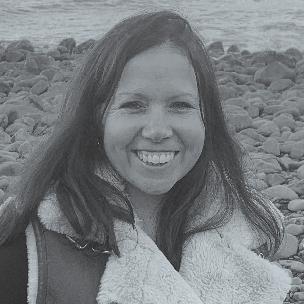

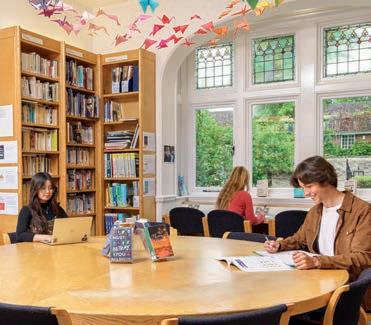
Advancing international education and understanding


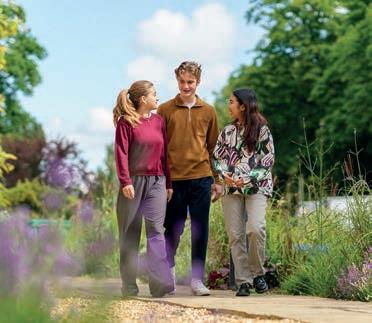
Where aspiration and ambition meet knowledge and experience

CO-ED DAY & BOARDING SIXTH FORM & IB WORLD

OPEN DAY 23 November 2024 (virtual) 18 January 2025 (in-person)
In the top 10% for student progress of UK IB schools
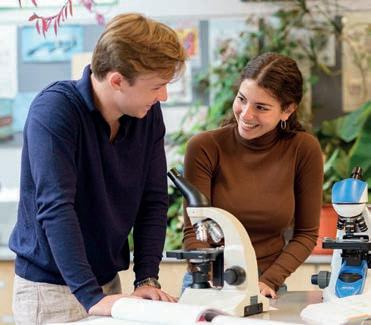

Our teachers write the textbooks and teach the teachers of the future
DAY & BOARDING SCHOLARSHIPS
Round 1 deadline: 18 October 2024
Round 2 deadline: 24 January 2025
James Barton of MPW Group on the recent challenges facing UK education and the importance of playing to our strengths
There’s no doubt that the UK’s educational landscape has undergone a seismic shift in the past decade with Brexit, and now 20% VAT on school fees. This is making a notable impact as schools juggle policy changes, financial challenges and the need to showcase the best of British education without losing their balance.
Brexit threw a spanner in the works for UK international student recruitment. EU students, once enticed by domestic tuition rates and financial support, are now classed as international. This has meant higher fees and more complex visa requirements. Unsurprisingly, this led to a decline in EU student applications, and while this has slowly been recovering, it has a ected universities and schools that historically relied on this cohort for both diversity and financial stability. For independent boarding schools, that shift was particularly troubling. Institutions that once thrived on a steady influx of EU students were left to fill the recruitment gaps, struggling under the weight of additional visa restrictions and spiralling costs. In response, some schools turned away from Europe, refocusing their recruitment e orts on other markets – sometimes with little previous experience or strategy to guide them.
As if Brexit wasn’t enough, the imposition of a 20% VAT tax on school fees has thrown another wrench into the works. For many UK families, the increased cost makes
“Schools require a renewed focus on lasting relationships – they can, justifiably, talk about the unique strengths of a UK education”
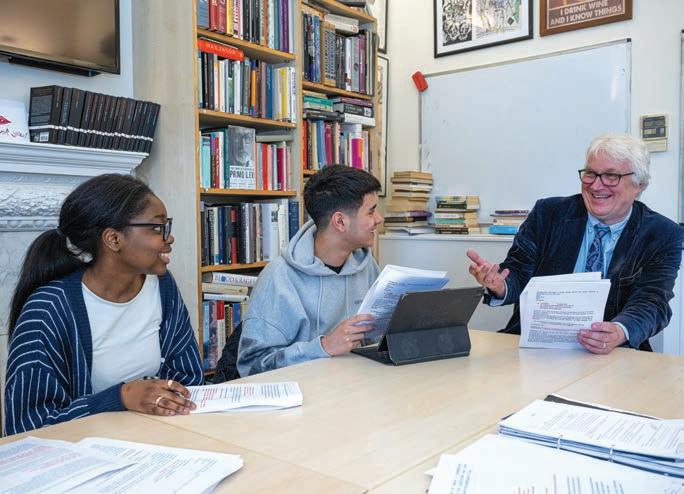
private education less appealing and less a ordable. Even independent schools that previously relied on local students are exploring international markets – some have even launched aggressive marketing strategies abroad. The last thing parents or schools want is a ‘race to the bottom’, where UK institutions compete primarily on price, rather than quality. Established schools now find themselves up against newcomers – some wielding unrealistic o ers.
This lack of regulation could also open the door to misunderstandings and mistrust among international families, who might find that too-good-to-be-true o ers are exactly that. A hard-won reputation of UK education as a premium o ering is too valuable to put at risk, and if a trajectory of chaos and confusion is allowed to develop, the UK could see its standing as a top global destination for international students tarnished.
To secure a future in international recruitment, UK schools need to continue to prioritise sustainable and transparent practices. This requires a renewed focus
on building lasting relationships with both domestic and international families. Schools can, justifiably, talk about the unique strengths of a UK education.
Clearer regulations around recruitment would also be a welcome move in ensuring fairness that preserves the sector’s high reputation. By adopting a strategic, qualityfocused approach, UK institutions can navigate current challenges – and whatever seismic shifts may happen in the future – to maintain their appeal and our education system’s reputation for excellence on the global stage.

Richard Backhouse explains how Berkhamsted
is preparing its students to flourish in the new world order

The world outside schools is changing fast. Yet we expect students to adapt automatically to the world beyond their classrooms, even when those classrooms remain unchanged. Our children will enter a job market that will be unrecognisable to us. According to Forbes, 56% of businesses are using AI within their operations, and this is only expected to grow by the time Sixth Formers enter work. Equally, tech developments mean most current students are expected to have between 10-15 di erent jobs by the time they are 40. Beyond the employment landscape, global challenges such as climate change are set to vastly transform the world as we know it. With such a scale of change, it is unthinkable that we would not o er our students the necessary tools to face the world – both as it is now, and how we see it developing. It is the great privilege of schools that we provide the space within which the world’s future leaders are grown. I use the word
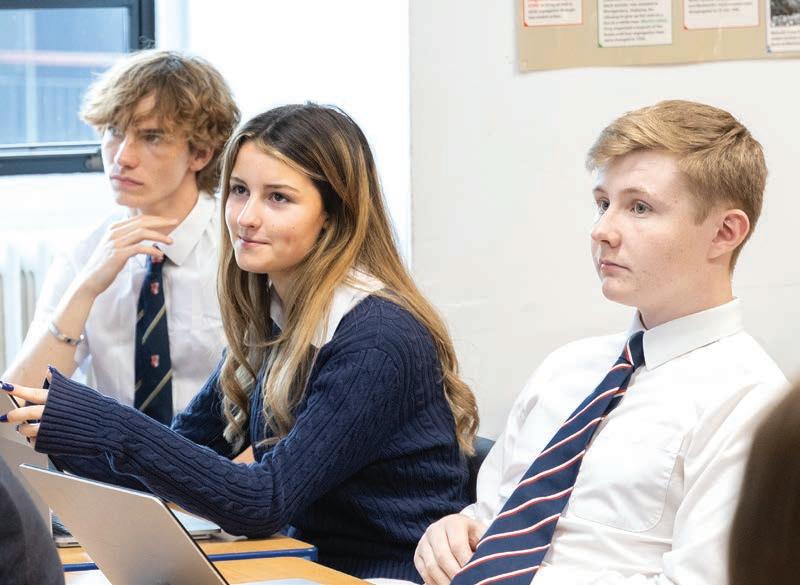

“Global challenges such as climate change are set to vastly transform the world as we know it”
‘space’ not only symbolically, but rather to highlight how change begins in the very bricks and mortar that encompass our students. It is no secret that the buildings we teach and learn in play a crucial role in the educational experience of all who inhabit them. Indeed, research carried out by the RIBA revealed the impact of building design on the productivity and wellbeing of both sta and students.
At Berkhamsted School – a coeducational day and boarding school situated just 30 minutes from London – our new Sixth Form Centre promises to shape students for the future from the moment they step through its doors. With a dedicated entrance separate
from Berkhamsted Boys and Girls schools, the Sixth has its own distinct identity which inspires independence and responsibility. Our classroom design is inspired by the Harkness Model: developed in America, the model structures classes around a large boardroom-style table, deviating from the traditional teacher-learner dynamic to encourage discussion and independent thinking. These spaces o er the perfect setting for our forward-thinking syllabus, including a super-curricular AI course which facilitates debates about the ethics of artificial intelligence.
The Sixth Form’s innovative design also includes a dedicated Future Zone, constructed to enhance traditional careers advice with an eye to the transforming job market. 53% of our 2024 cohort achieved
A*- A grades, with 82% going on to their first-choice university, so we hope to prime future cohorts for similar success. On top of Berkhamsted’s traditional university and careers provision, the Future Zone will contain a working space for young entrepreneurs to develop their
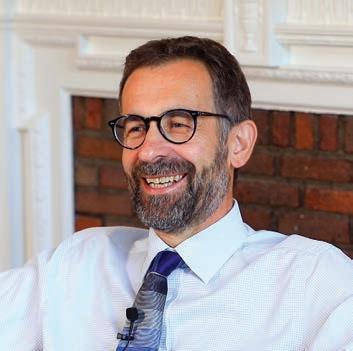
own business models. With an increasing number of people choosing to work for themselves, students will be able to explore this pathway as a viable option.
While schools shape students for the future, it is also our responsibility to shape their future in return. As such, our new Sixth Form building has been constructed with sustainability at its heart, designed with low carbon, energy and resource e ciency, as well as a meadow quad to promote biodiversity and student mental wellbeing.
I have no doubt that the students of today have the potential to become the changemakers of tomorrow. It is all we can do to provide them with the space, opportunity and encouragement to do so.
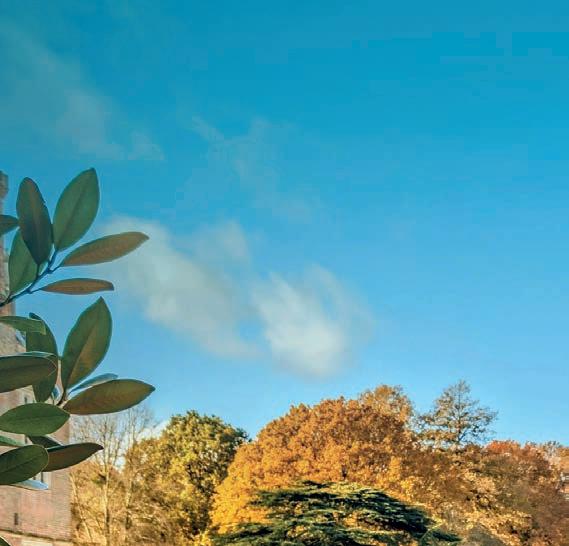
“A strong international focus and a huge spirit of adventure.”- Muddy Stilettos








A day and boarding school for girls and boys ages 11-18


Welcome to Cobham Hall, where centuries of history meet a curriculum for the future, and creativity knows no bounds. Achieve more than you dreamed possible at Cobham Hall.
Now welcoming applications from girls and boys across all year groups.
inspired. Prestigious Steinway Scholarship for pianists.

on why state boarding brings many benefits beyond price
State Boarding is a gem that is being discovered by a growing number of families.
With costs significantly lower than the independent sector, strong academic results and excellent facilities, there are many incredible opportunities it o ers to young people and their families. The common question asked is how are fees so much lower than the independent sector? Put simply it is because education provided is free and only boarding fees are payable. Many families are surprised to hear the breadth of experiences children are o ered. Highlights across a year could typically include trips to New York, Florida Disneyland, Iceland, skiing in Austria, safaris in Kenya as well as students learning to scuba dive in an onsite pool and achieving the PADI open water qualification overseas. Weekly activities may include the Combined Cadet Force (CCF), Duke of Edinburgh’s Award (DofE),
paddle boarding, kayaking, horse riding, water polo, debating, baking and coding.
Sports is also just as competitive and prestigious in the state sector. With a high calibre of sporty children, many state boarding schools compete against independent schools. For example, the UK’s No1 U17 3000m runner attends a state boarding school, as do the regional champions in U13 Football. State Boarding School students hold the Norfolk-hosted Twickenham Rugby Touch 2 Cup and are also recipients of 100 Ball Girls Cup and T20 tournaments in cricket. Sports is celebrated at a recreational as well as a competitive level, but with plenty of access to elite sporting opportunities.
State boarding prides itself on being a home from home, with specialist sta and a culture that is conducive to the family dynamic. There are two Prep boarding schools in the UK and a variety of Senior and Sixth Form state boarding options.
“State boarding prides itself on being a home from home, with specialist staff and a culture that is conducive to the family dynamic”
Some are located in cities, others nestled in the English countryside. Wymondham College, for example, is located in the heart of Norfolk, with easy access to Norwich, London and the beautiful East Anglian coast.
Boarding houses range in size too, from those that are among the largest in Europe, to those that are more intimate. Whether it is ensuring children remain with their boarding family through to Year 13 or o ering separate prep and senior houses with a Sixth Form akin to a small university campus, there’s an option to suit every child and their family.
State boarding schools also adhere to National Boarding Standards and are rigorously inspected every three years by Ofsted. Two state boarding schools were recently graded ‘Outstanding’ by Ofsted in all nine categories – no mean feat. This demonstrates the high academic standards and achievements, which are among the best in the country. And many state boarding school students go on to study at Oxford and Cambridge.
With so many families recognising that state boarding can o er experiences, opportunities, facilities and outcomes on par with the independent sector, and at a very di erent price point, the sector is one that will continue to shine.

DALE MCMORRAN Head of School Wymondham College
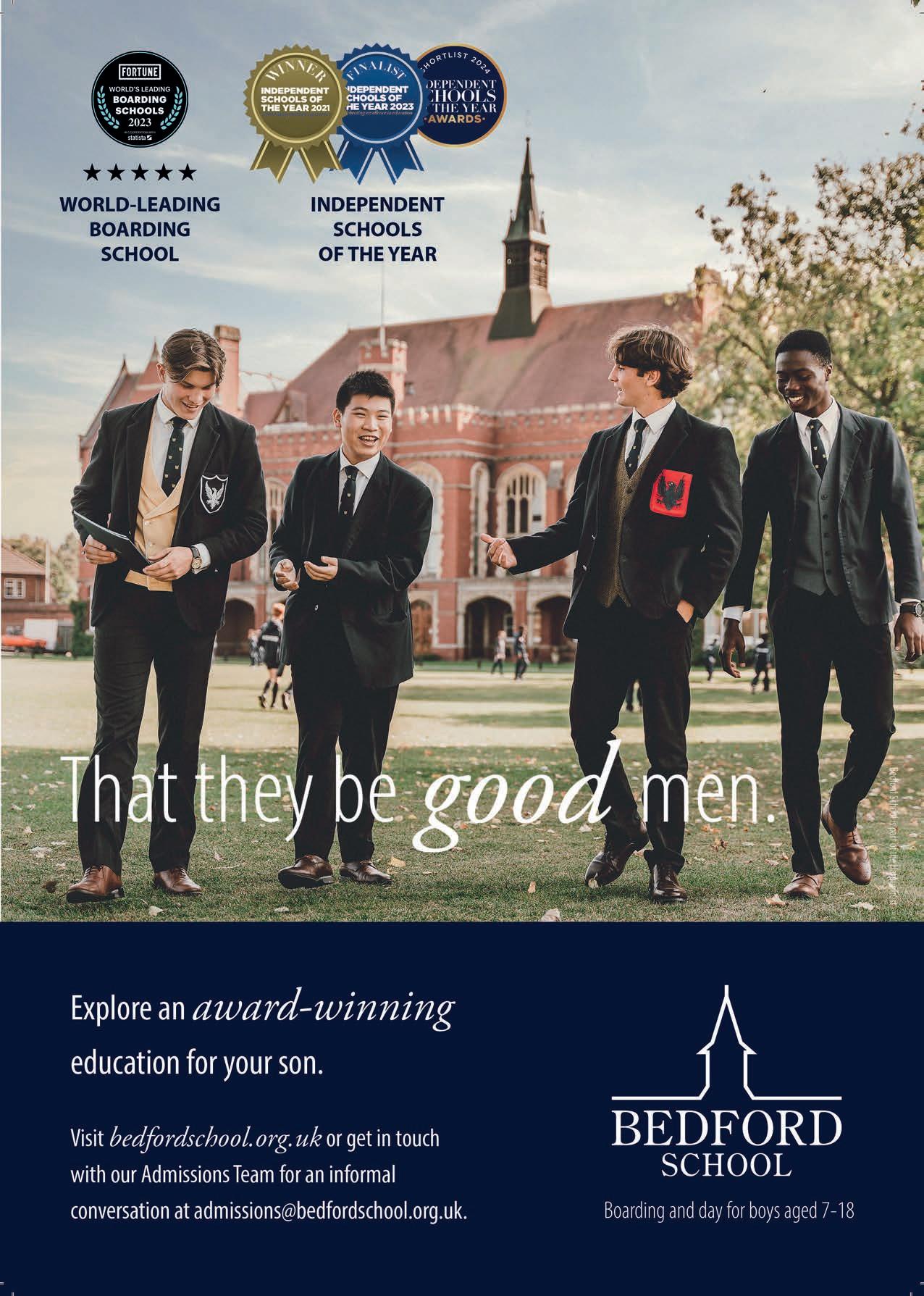
The Principal of The Duke of York’s Royal Military School on how leaders are developed through lived experiences, in and out of class
In today’s fast-paced and competitive world, where adaptability and fortitude reign supreme, the need for exceptional leadership and resilience has never been more crucial..
At The Duke of York’s Royal Military School (DOYRMS), leadership and resilience aren’t theoretical concepts but lived realities. Fondly referred to as ‘Dukies’, our students are nurtured to help them develop the tools and mindset required of the leaders of tomorrow. A plethora of opportunities give Dukies opportunities to assume leadership roles. These range from becoming prefects and heads of house to taking on the roles of captains of sports teams and arts societies, and mentors to their peers.
Leadership and resilience are best honed through hands-on experiences. Adventure isn’t just a recreational pursuit here, it’s a vehicle for personal growth and character development. Through curated adventure training, plus Duke of Edinburgh’s Award (DofE) and Combined Cadet Force (CCF) trips, our students are thrust into environments where they navigate obstacles and collaborate with their peers under pressure. Whether it’s scaling rugged peaks, braving the elements or an exhilarating abseil down a 150-foot viaduct, these expeditions instil invaluable traits.
Overseas expeditions to places such as India and Nicaragua see our students not only exploring unfamiliar locations but also taking part in volunteer programmes, such as building schools. They learn first-hand the importance of clear communication,
“Leadership and resilience are honed through hands-on experiences”

strategic planning and decisive action – qualities indispensable for e ective leadership in any sphere of life.
This summer, for example, some of our students will embark on a three-week expedition to Cambodia, where they will explore the country and participate in community projects. The expedition culminates in a PADI Open Water Diver course, but it is during the project phase that they will experience a very di erent set of challenges. Dukies will contribute to communities through initiatives aimed at improving lives. These include constructing clean water wells, building toilets, donating chickens to families for food and income and engaging in marine conservation activities.
The ethos of full boarding (our school has no day students) fosters maturity and independence. We nurture individuals to become


academically and socially adept, culturally aware and emotionally resilient. Key to their development is the team who guide them on their journey. Our sta have a dual role of academic teaching and pastoral care –providing emotional and social support. This wraparound care ensures Dukies receive comprehensive guidance in all aspects of their growth.


The Duke of York’s Royal Military School strives to be a beacon of excellence in shaping the leaders of tomorrow. Alongside academic and personal growth, our role is to equip students with the skills and mindset for leadership – also the spirit to confront life’s challenges head-on. We work to ensure Dukies emerge stronger, wiser, and ready to embark on their ‘next steps’. A foundation built on resilience and excellence means they are poised to make an impact on our ever-changing world.























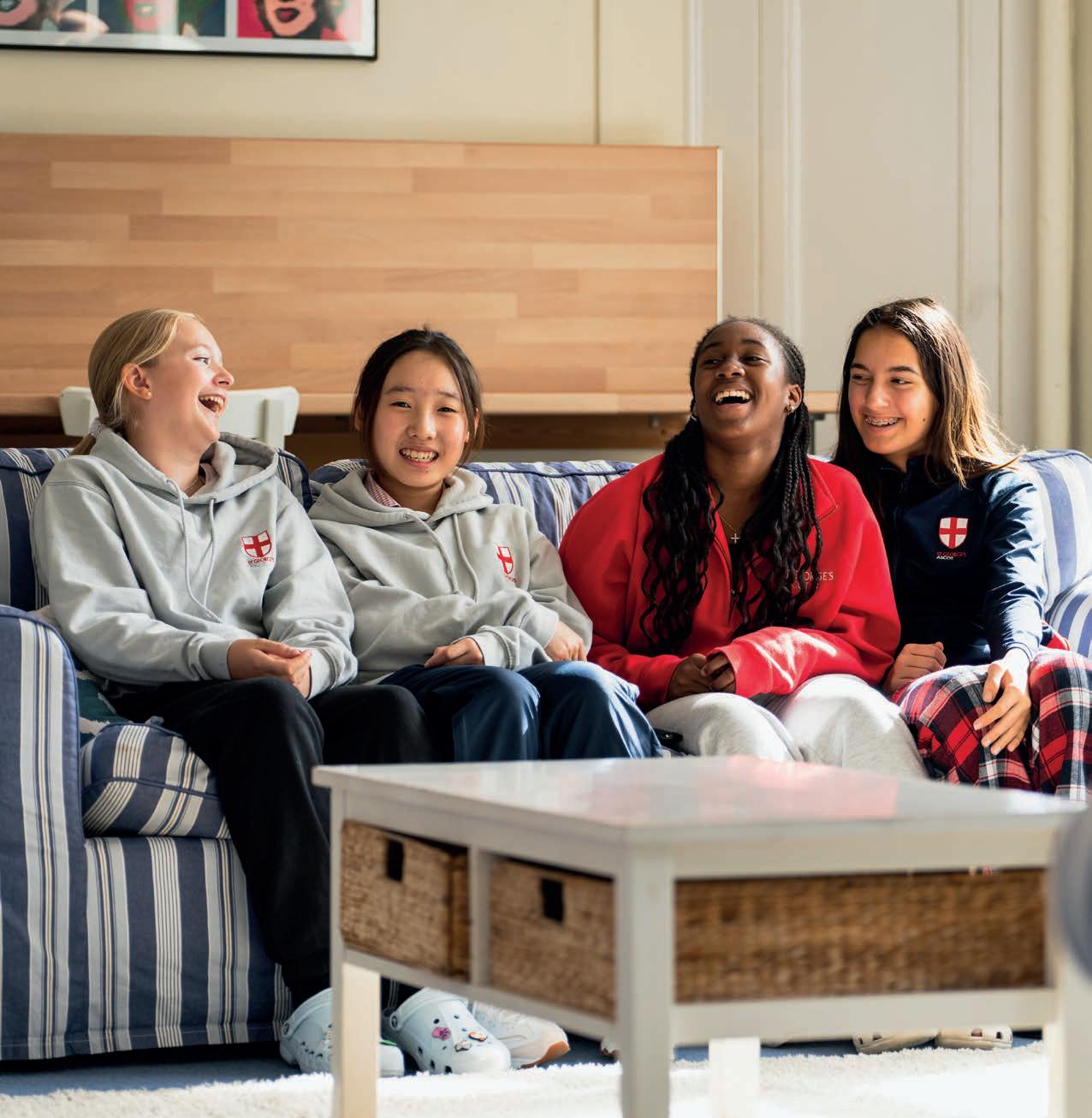
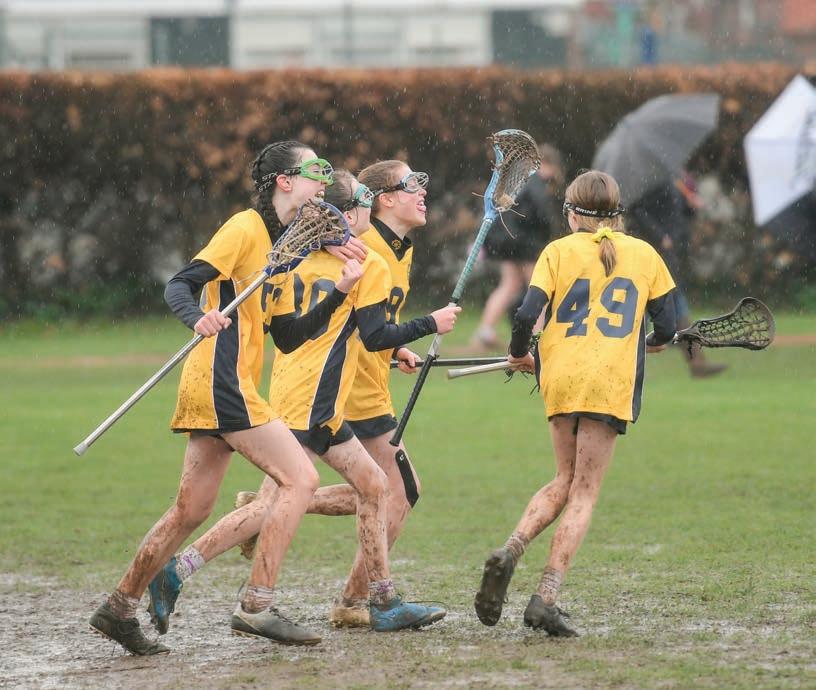
The Director of Sport at St Catherine’s School, Bramley on how to ensure girls keep on playing and enjoying games
Sport is an integral part of school life at St Catherine’s. The girls take pride in representing their school across all sports and at all abilities. Over 80% of each year group are involved in sport and this continues into the Sixth Form, either within team sports or in individual endeavours.
We are proud to coach five senior lacrosse teams and four U18 netball teams and o er over 18 di erent sports across the school. Dance opportunities here are also inspiring, with 32 dance classes a week –including ballet, modern, tap, street dance and musical theatre – in our purpose-built dance studio. Our Dance School Principal Lizi Eringa has taught and examined dance classes in the UK, Europe and Asia and holds the Professional Dancer’s Teaching Diploma from the Royal Academy of Dance. So how do we achieve such high participation? Our ethos is to ensure
that we provide a positive and engaging environment which allows all girls to develop a love of sport. Our aim is to ensure this continues throughout their lives. Every girl is welcome to attend regular training sessions across all sports, and we provide inter-school fixtures from A to G teams throughout the season to ensure every girl has the opportunity to represent the school.
Sport provides great camaraderie, helping to support, encourage and improve the less naturally athletic. Girls feel a loyalty and accountability to one another and revel in the team spirit. This becomes particularly evident during House Sports, where the teams are fully inclusive –encouraging teamwork, leadership and friendships.
Some girls naturally find the strategy and tactics of a team game more engaging, while others like to focus on their own individual performance and strive for their personal best. We help girls to find ‘their’
“We help girls to find their place be it in mainstream sports, the gymnastic or equestrian team, or just having fun”
place in sport, whether it be in mainstream sports, the gymnastic or equestrian team, or just having fun in recreational sports, such as ultimate frisbee and badminton. An extensive extracurricular programme allows every opportunity to participate in all our main sports alongside their curriculum-based lessons. This combination provides several hours of sporting or physical activity every week.
Role models are also very helpful in illustrating the long-term opportunities. We currently have five lacrosse specialists, four netball specialists, two swimming specialists, two gymnastics specialists and a tennis coach – all of whom inspire our girls. We are proud that several represent their country on a national level, as do many St Catherine’s alumnae. The games and individual sports captains are admired by both their peers and the younger girls and exemplify what is possible beyond ability alone through their leadership, motivation, strength of character and team loyalty.
We support and celebrate girls’ sporting achievements outside of school, whether this be the team of riders bringing home regular places at equestrian events or Emily King, who gained 1st place in the British Indoor Sky Diving Championships (maintaining U18 top ranking in the UK). Our girls understand that balancing sport with academic commitments reaps great personal and team rewards. Our successes in sports involve a huge team e ort and a commitment that goes into every lesson and fixture. We wear our blue and gold St Catherine’s colours with great pride.





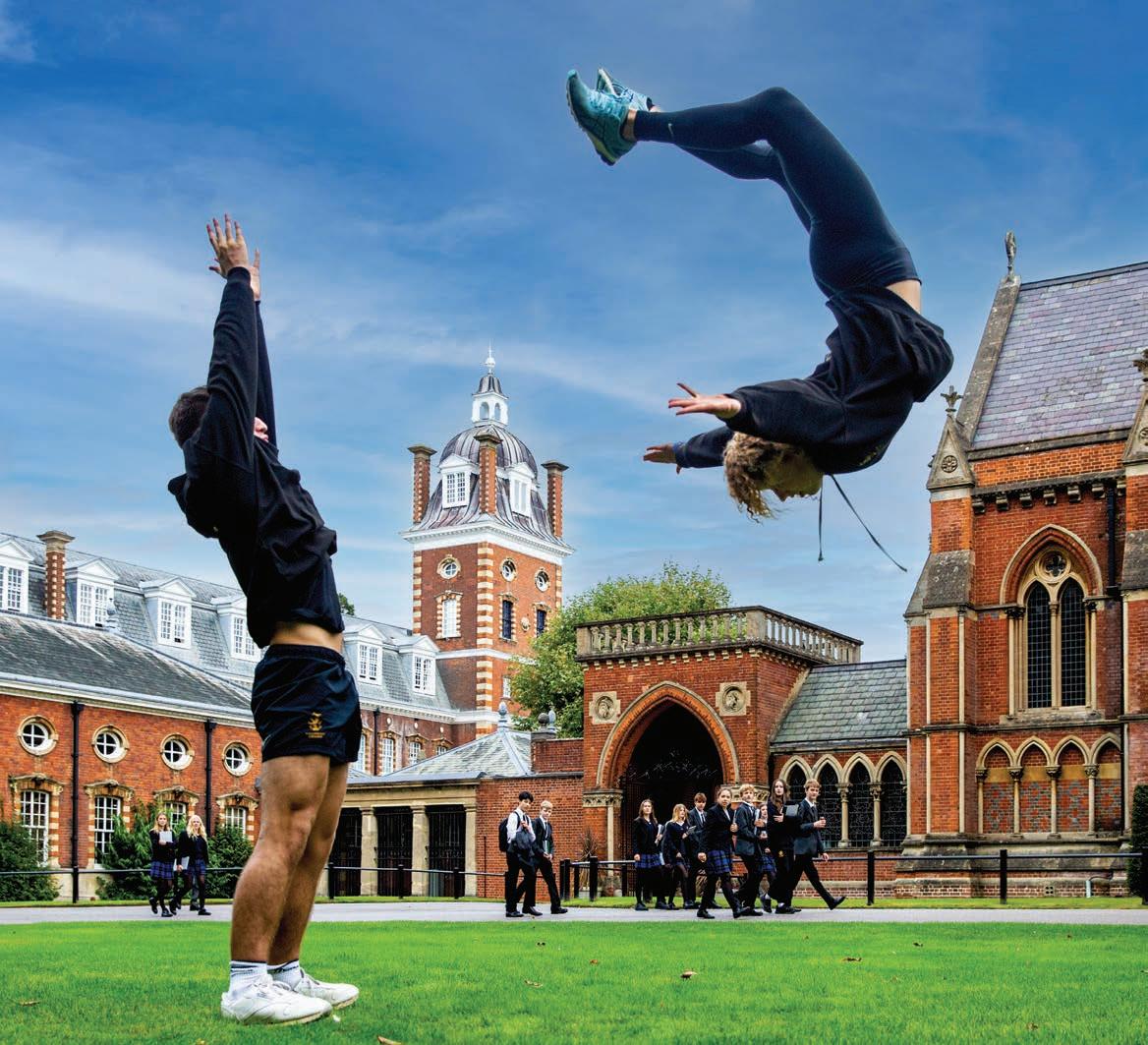
Embracing academic excellence – and aboveaverage IB scores – at St Clare’s, Oxford
Ours is an education unlike any other in the UK. St Clare’s, Oxford is a remarkable place of global education for remarkable young people, advancing international education and understanding for 70 years.
We are a world-leading International Baccalaureate World School, the first in England, attracting students from over 50 countries and embracing internationalism and academic excellence as our core values. Our teachers write the IB textbooks and teach the teachers of the future, and our results are consistently sector-leading and far above global averages. In the last 3 years, 90% of students have scored above the world average, over a third have scored 38 points or over, and every year we have students achieve the maximum IB score of 45, placing them in the top 1% globally. Everyone in our community is united by one key motivation: to step out of their comfort zones to grow, and to be the most globally aware and academically ambitious version of themselves. Ours is thus a culture of challenge. Walking around, you see individualism and character, engagement with the community, independence, responsibility, and happy,

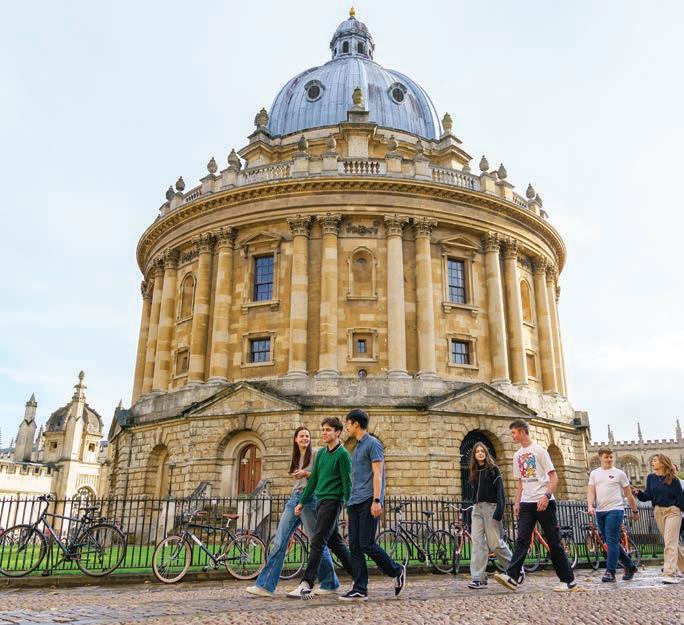
“This is where aspiration and ambition meet knowledge and experiences”
fulfilled young people readying themselves for the world. This is just one reason why independent analysts show that our students consistently make more academic progress here, than they would at most other IB schools in the UK. To be at St Clare’s is to feel freedom and benefit of choice; to stand on top of a
mountain with every direction available to you. Any career, any location, any direction for your future made possible.
Our Careers and Higher Education support is among the best in the world, sending students to the top-ranking universities worldwide but, more importantly, to the right university for them. This is where aspiration and ambition meet knowledge and experience. We believe that academic achievement matters and lays the foundations for prosperous futures, and that independence is the greatest skill a person - and a mind - can learn. St Clare’s is a place for those who think di erently. We help young people become academically successful, self-reliant, and aware of the world. Be challenged, be independent, be remarkable.
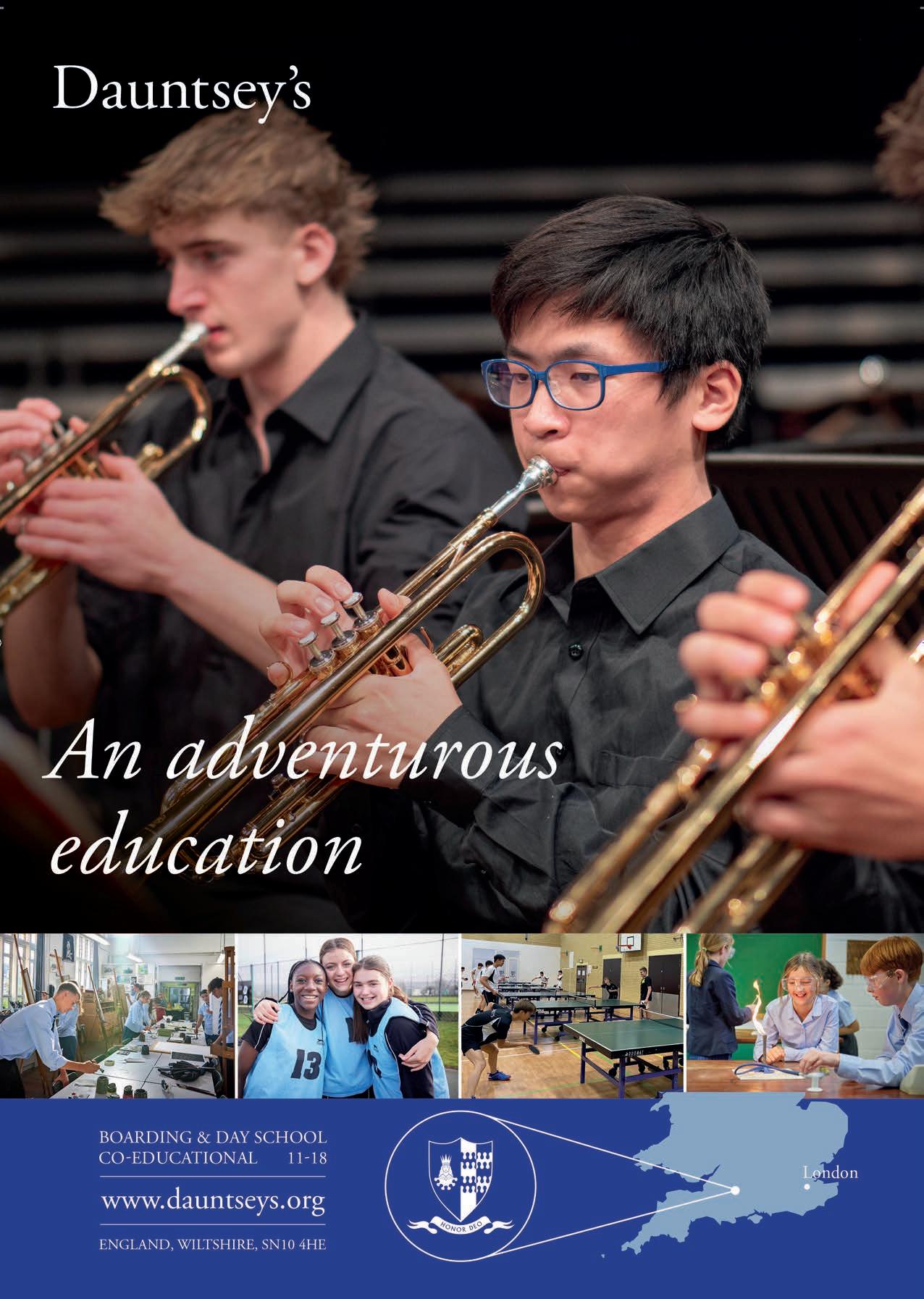
Andrew Fisher, Head of Frensham Heights, on the long-term benefits of outdoor education in teaching young people about leadership, empathy and authenticity
Over the final week of January in the cold Surrey Hills, I took to the outdoors and camped in several unusual places around the school campus: hidden in the woods; right next to the car park; high on an exposed side of the theatre; in a suspended tent dangling from the high ropes course. Why? To raise awareness and funds for a local charity, but on a higher level, to show that taking risks to support others is a great life lesson.
Teaching is so much more than the ‘in classroom’ experience, and outdoor education has always been an essential part of my life and career. By grabbing people’s attention, raising the profile of the school charity (Guildford-based The Fountain Centre) and raising over £10,000 in the process, I hope I have appealed to the imagination and intuition of my students and shown them that leading comes in all shapes and sizes. My lifelong love of outdoor education began in 1977 when I attended Timbertop; Geelong Grammar’s year-long outdoor education programme in the Victorian highlands of Australia. It was largely modelled on the work of Kurt Hahn, founder of Gordonstoun, and at Timbertop I learnt that I was stronger than I ever could have imagined, both physically and mentally. I learnt that I could plan and manage risk successfully. Essentially, I learnt who I was, how I functioned and what I could achieve,
“Students learn to deal with both success and failure and to get back up and try again each time – they learn to be authentic”
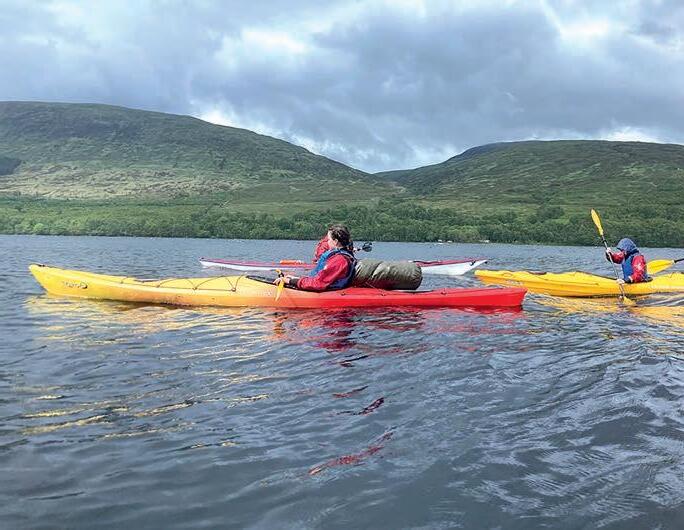
even when I thought it impossible. The experience had a resounding e ect. The references back to those experiences remain strong even now, 47 years later.
At Frensham Heights, outdoor education is an intrinsic part of our curriculum, from Forest School in the early years through to high-altitude expeditions for the older students. The programme for all activities begins with learning the specific skillset needed for this experiential learning – the real adventures. As their practical skills develop and their experiences widen, students develop massively in confidence, empathy, resilience, collaboration and communication. They take turns leading – running the budget, standing up and making critical decisions. Our main outcome is to develop the students’ self-confidence and sense of pride, their ability to step out of their comfort zones and not be afraid to make mistakes. Students learn to deal with both success and failure and to get back up and try
again each time. They learn to be authentic and to trust, both themselves and others.
Self-knowledge and the willingness to be open about your own strengths and weaknesses, especially when you are the one leading, are essential. I have never held with the tags put on leadership styles but being an ‘authentic’ leader is probably as close to the truth as I have got. If you are open and lead by example, show fragility and strength, can manage risk but not be afraid, then you can naturally bring others with you. This style of leadership allows those who doubt, or who are yet to lead themselves, to see and understand that truth and self-reflection are key.
I hope that my winter camping will be memorable, will make some think about taking risks, and has raised the profile of The Fountain Centre. Perhaps, most importantly, in the years ahead my students of today will have grown into adults who think they too can take a risk and can show their authentic selves to others as they lead.

The Headmistress of Headington Rye Oxford on the rapidly changing nature of careers – and the unchanging skillsets required
As an educator, there are many competing priorities when we consider the young people in our charge. Are they academically challenged? Do they have opportunities to excel outside the classroom, for example in sport or the performing arts? Are they supported to strike the appropriate balance between studying, home life, friendships and extracurricular activities? Hovering among those questions, and underpinning them all: are we getting them ready for the future?
More than one in three 18-year-olds today goes to university. To put this in context, in 1970 that figure was 8.4 per cent. There are also now more than 50,000 undergraduate courses to choose from. They range hugely in terms of entry requirements, subject matter studied, academic commitments and graduate outcomes. A 2023 study of recent graduates found less than half were working in a field related to their degree. The choices are
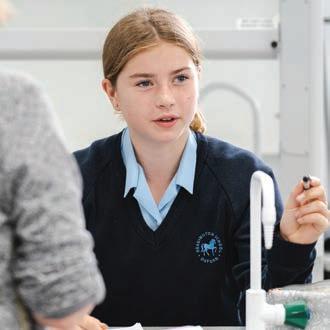
“Those joining our school at 11 or younger will have an even more unfamiliar jobs landscape to navigate”
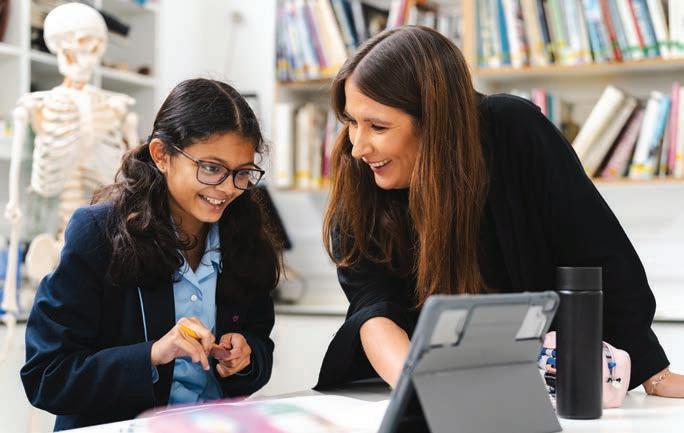
overwhelming, and navigating the best path for each individual is an enormous challenge. There has been an explosion in new careers which could barely even have been conceived when I was a student. As adults, we are starting to get our heads round jobs such as ‘social media influencer’ and ‘digital content producer’ but to a young person, these now sound well-established. While the increasing use of artificial intelligence (AI) may mean the erosion of jobs which can now be done more e ciently by a machine, it opens up new opportunities. As well as AI researchers and data scientists, you can now see jobs advertised for AI trainers, machine learning engineers and deep learning engineers. These are just a snapshot of the new opportunities. But the reality is, those joining our school at 11 or younger will have an even more unfamiliar jobs landscape to navigate. So how do we prepare pupils for something we can barely even understand ourselves? If we look at the kind of language used in job advertisements, there are some common themes. We see things like curious minds, creative thinkers, collaboration, innovation,


flexibility and, in almost every example, excellent communication skills (some things don’t change). These qualities might be applied in di erent ways, but they are the very definition of transferable skills.
At Headington Rye Oxford, this means fostering and developing curiosity at every level and providing opportunities for collaboration. It means teaching critical and creative thinking explicitly. We encourage innovation, cross-curricular collaboration and entrepreneurial spirit. We also make sure that it comes naturally to each child to delve deeper – to ask how and why, as well as what, and to know how to explore those answers. Importantly, it means starting the careers support process early so that, as they develop, our pupils can consider what they want out of their working life.


Finally, for those who struggle to get on board with the idea of making a living from social media or AI, a 2023 BBC study found that the most popular career choice for teenagers was doctor. Some vocations will always be popular and valued – and critical thinking, innovation and curiosity are no less important for more traditional career paths.
andersoneducation.co.uk
Visit the UK Boarding School Exhibition to meet Heads from leading boarding schools, a great opportunity for you to start your research and find out about the many benefits and opportunities.
Riyadh - The Fairmont
Al Khobar - Le Meridien
Tuesday 12 November 16.00 to 20.00
Thursday 14 November 16.00 to 20.00
Dubai - Grosvenor House Hotel Saturday 16 November 11.00 to 16.00
Entrance is free, collect a free copy of the UK Boarding School Directory. enquiries@andersoneducation.co.uk

badmintonschool.co.uk
Location: Bristol
Head: Mrs Jessica Miles
Age range: 4-18 years
School Type: Girls, Prep, Senior, Sixth Form
USP: Badminton is a thriving independent day and boarding school for girls aged 4-18, which has remained at the forefront of girls’ education for well over 160 years. The size of the campus, our community and excellent pastoral care give a homely and vibrant feel to the School. The holistic approach ensures that the girls can discover and develop not only their academic strengths but all their other talents via the wideranging extracurricular programme.
Bedford School bedfordschool.org.uk
Location: Bedfordhsire
Head: James Hodgson
Age range: 7 to 18 years
School Type: Boys,Prep, Senior, Sixth Form
USP: Bedford School is a Fortune World Leading Boarding School and Independent Boys’ School of the Year 2021 - for "its holistic school experience, tailored to the specific needs of the all-boys community.”
The school was awarded five stars in Fortune’s World’s Leading Boarding Schools 2023, placing it within the top six boys’ boarding schools worldwide.
bishopsstortfordcollege.org
Location: Hertfordshire
Head: Mr John Maguire
Age range: 3-18 years
School Type: Co-Ed, Prep, Senior, Sixth Form
USP: A co-educational day and boarding school for pupils aged 3 to 18, Bishop’s Stortford College o ers the whole package: breadth of opportunity, depth of academic enquiry, and quality of human values and skills. In this busy, highly successful community, every child’s personal journey of discovery begins the moment they join.
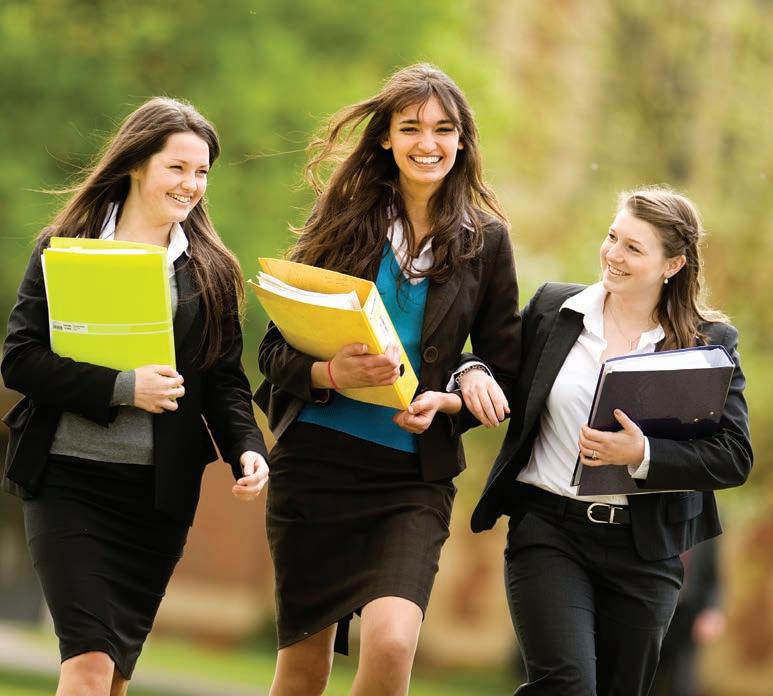
ccoex.com
Location: Cardi and Cambridge UK
Pupils engage enthusiastically with knowledge, embrace new ideas and are intellectually stimulated
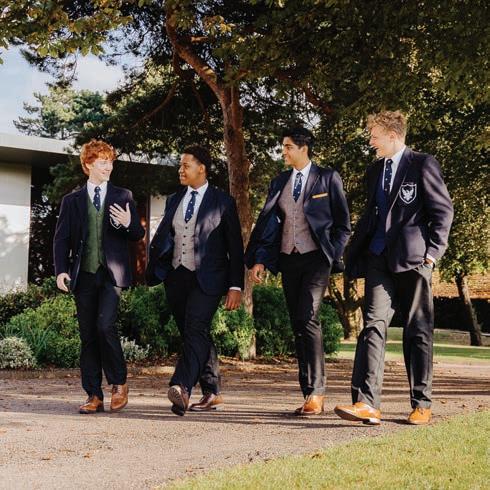
bromsgrove-school.co.uk
Location: Worcestershire
Head: Michael Punt
Age range: 2 - 18 years
School Type: Prep, Co-Ed, Senior, Sixth Form
USP: Bromsgrove o ers an all-round education, combining academic excellence with a richness of opportunity. Pupils engage enthusiastically with knowledge, embrace new ideas and are intellectually stimulated. Results are impressive, but Bromsgrove is much more than a place to get good grades, it prides itself on being a happy school where children of all ages can thrive.
Head: Tom Arrand
Age range: 15 - 17 years
School Type: Sixth Form
USP: Number one school in the UK for over a decade with unrivalled academic results and teachers who are leaders in their fields of expertise. With excellent progression on to top universities, there is superb careers and university guidanceas well as an individually targeted work placement and volunteering programme. Award winning pastoral care ensures the wellbeing of an international cohort of students (over 40 nationalities) with a global outlook. Excellent classroom facilities and university-style boarding accommodation are spread over two campuses, Cambridge and Cardi .
Caterham School
caterhamschool.co.uk
Location: Surrey
Head: Ceri Jones
Age range: 4-18 years
School Type: Co-Ed, Prep Senior, Sixth Form
USP: Caterham School was named Times
Educational Supplement Independent School of the Year and our top academic results are testament to our uniquely supportive community and the inspiring teaching that is our hallmark.
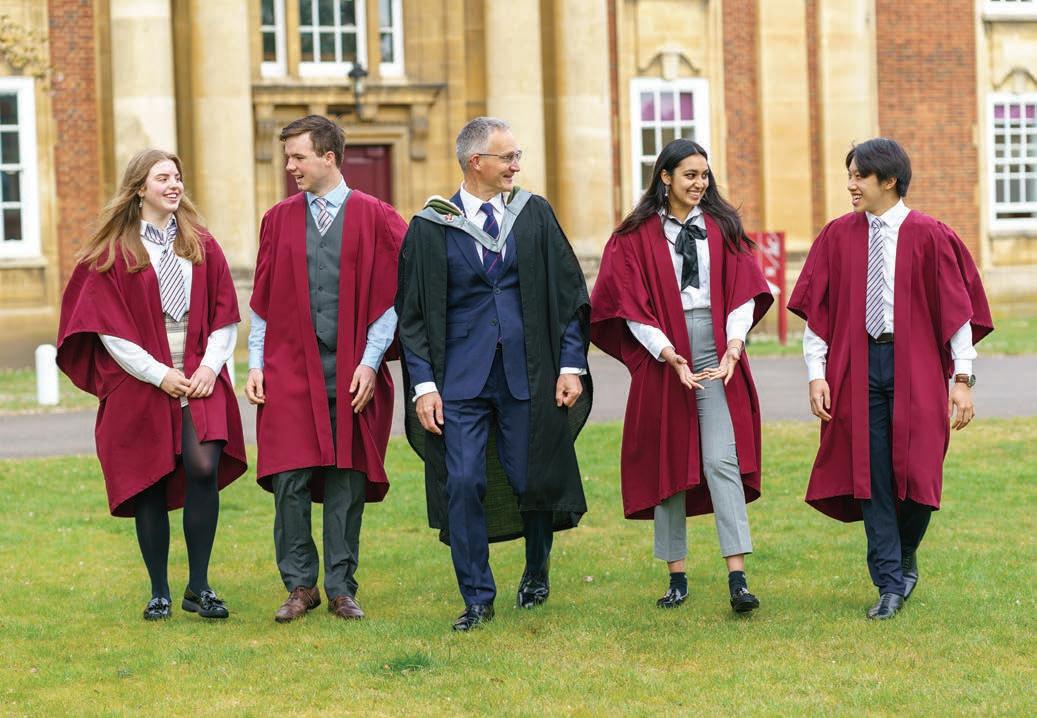

clayesmore.com
Location: Dorset
Head: Jo Thomson
Age range: 7-18 years
School Type: Co-Ed,Prep, Senior, Sixth Form
USP:Set in stunning parkland, Clayesmore is one of the UKs leading boarding schools. Renowned for its warm, family ethos - where every child is known and noticed. Students develop the essential qualities of confidence, kindness and respect - ready to take their place in the world via our unique personal development programme.
downehouse.net
Location: Berkshire
Head: Emma McKendrick
Age range: 11-18 years
School Type: Girls Senior, sixth form
USP: Downe House is a world-class all-girls’ boarding school in the UK, o ering an immersive education with a modern and global focus. With a focus on excellence and the individual, girls are encouraged to make the most of the exceptional academic, co-curricular and enrichment opportunities on o er and to create their own paths, authentic to themselves.
Location: Scotland
Head: Ian Munro
Age range: 5-18 years
School Type: Co-Ed,Prep, Senior, Sixth Form
USP: Dollar is recognised as a leading independent school and has a very sound reputation amongst the UK’s top universities. Students have also recently left Dollar for Harvard, Stanford and Columbia. The school o ers a wide range of 34 academic subjects, complemented by 120 cocurricular activities, with an excellent reputation for sport, music and art.
eastbourne-college.co.uk
Location: East Sussex
Head: Tom Lawson
Age range: 9m - 18 years
School Type: Co-Ed Prep, Senior, Sixth Form
USP: Just one hour from London Gatwick by train or car, Eastbourne College provides a full boarding education focused on healthy living for healthy learning. In a stunning, safe, location, yards from a national park and picturesque seafront, superb facilities support outstanding academic and cocurricular opportunities that develop rounded young people.
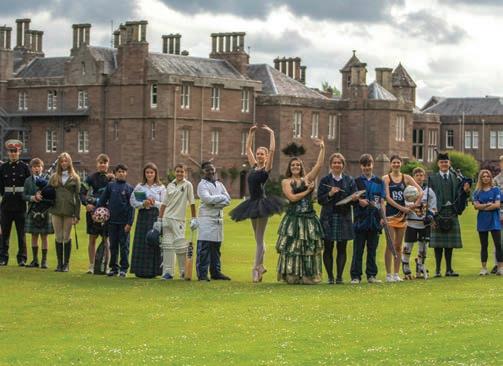
ipswich.school
Location: Su olk
Head: Nick Gregory
Age range: 11 - 18 years
School Type: Co-Ed
Senior, Sixth Form
USP: We o er our pupils an extraordinary mix of classroom success and co-curricular opportunities. We want their time at Ipswich School to be an experience in itself, where they will make memories and friendships that will last a lifetime, whilst at the same time preparing them for their future lives beyond school.
kingswood.bath.sch.uk
Location: Somerset
Head: Andrew Gordon-Brown
Age range: 11 - 18 years
School Type: Co-Ed, Senior, Sixth Form
USP: Kingswood is a happy, vibrant and forward-looking school. Intellectual achievement is highly valued, whilst the pursuit of excellence in other fields is central to the school's commitment to provide the very best all-round education. At the core of a Kingswood education is our belief that every individual has talents to be discovered and nurtured and that our challenge is to develop these whilst preparing our students for their future beyond school.
lancingcollege.co.uk
Location: West Sussex
Head: Dominic Oliver
Age range: 13-18 years
School Type: Co-Ed, Senior, Sixth Form
USP: Dynamic and creative, we nurture our pupils' particular skills and attributes enabling them to excel. We push them to think and explore (learning is broad as well as deep) from a context of exceptional pastoral care. Holistic, underpinned by Christian values, rooted in boarding, the College is physically and intellectually spacious and our pupils cosmopolitan, self-aware and ethical.
Millfield
millfieldschool.com
Location: Somerset
Head: Gavin Horgan
Age range: 2-18 years
School Type: Co-Ed, Prep, Senior, Sixth Form
USP: We encourage our children and young adults to be kind, to challenge, to question, to be positive influencers and to have a voice. Our aim is that each individual will discover their own brilliance. We have the resource, the attitude and the capacity to lead the way and define education in the UK. We are proud of our Millfield Mix with students joining us from over 70 di erent countries and for whom we o er a full boarding programme.
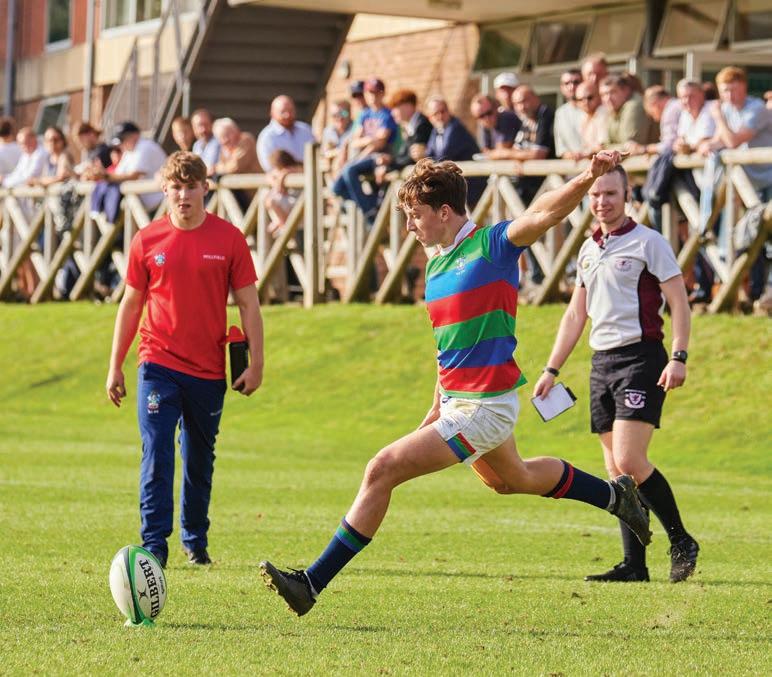
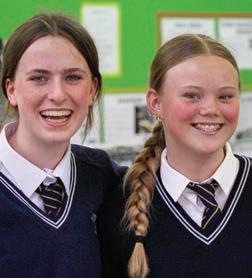
monktoncombeschool.com
Location: Somerset
Head: Chris Wheeler
Age range: 2-18 years
School Type: Co-Ed, Prep, Senior, Sixth Form
USP: Monkton is renowned for its commitment to holistic education; we prioritise not only academic excellence but also character development and a lifelong love for learning. We firmly believe that pastoral care is the cornerstone of achievement, fostering self-discovery, resilience, and the ability to face challenges with strength. Our full boarding environment provides a fun and supportive place for pupils to grow in confidence.
We fi rmly believe that pastoral care is the cornerstone of achievement

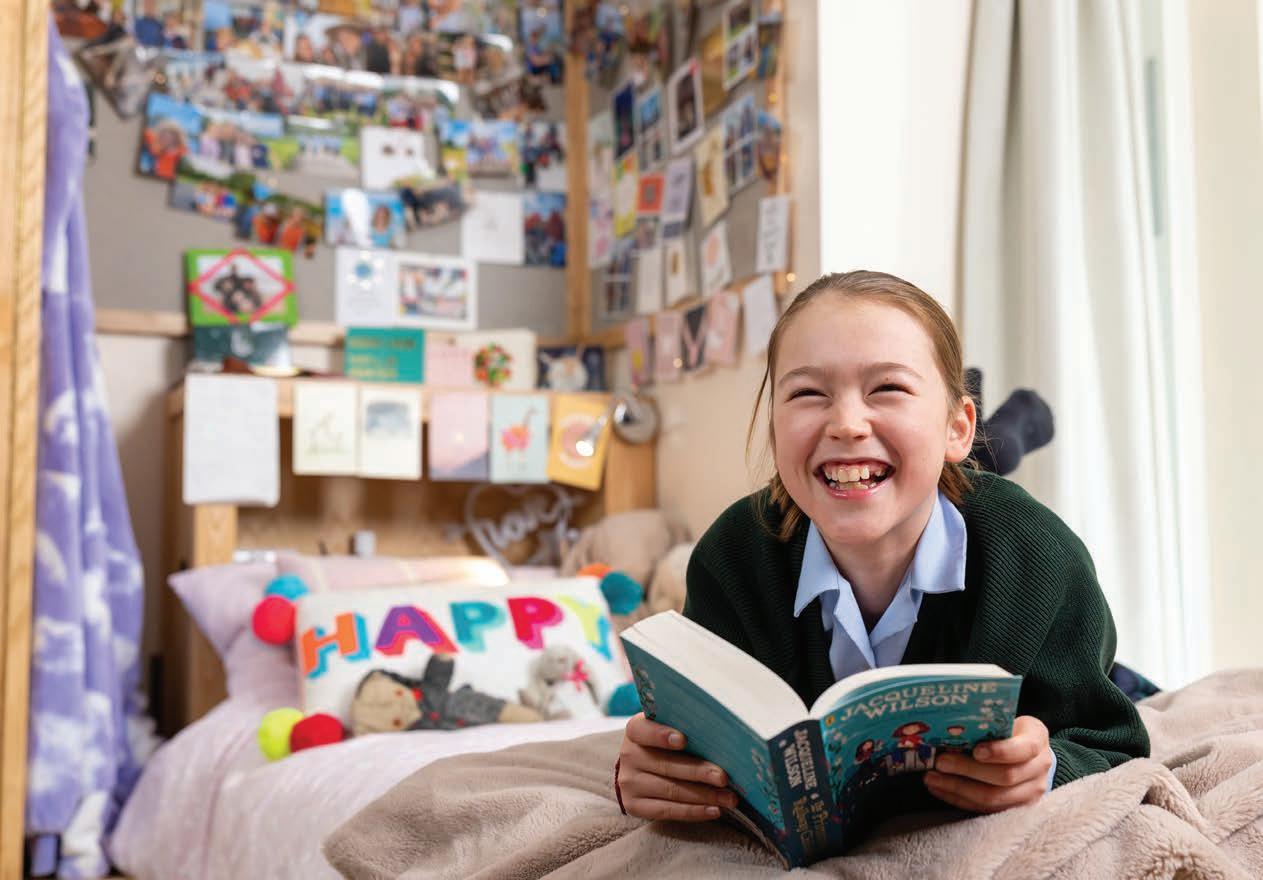
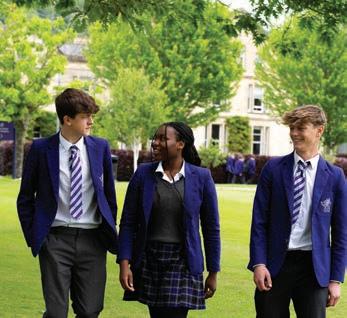
New Hall School
newhallschool.co.uk
Location: Essex
Head: Katherine Je rey
Age range: 1-19 years
School Type: Co-Ed, Prep, Senior, Sixth Form
USP: A Catholic boarding and day school that follows the Diamond Model Education, which means pupils are educated in coeducational classes up to age of 11 and again in Sixth Form.
A highly academic school, New Hall had a record year of outstanding GCSE & A Level results. Alongside state of the art sports facilities there is an equestrian Centre, featuring advanced simulators and an outdoor learning area.
Every child’s personal journey of discovery begins the moment they join
reddamhouse.org.uk/
Location: Berkshire
Head: Richard Crossr
Age range: 3 months - 18 years
School Type: Co-Ed, Prep, Senior, Sixth Form
USP: Reddam House is driven by a philosophy of equality and aspiration. Academics is just one area in which our students thrive. Rather than trying to 'find' their talents and interests, our students are encouraged to 'create' themselves and develop new competencies in preparation for a world that requires courage, resilience and flexibility. But most of all, your child’s time at school should be happy. We believe that our vibrant learning environment comes from complementing the academic and co-curricular strengths with the three ‘Rs’ of pastoral care: relationships, respect and responsibility.
roedean.co.uk
Location:East Sussex
Head: Niamh Green
Age range: 11-18 years
School Type: Girls Senior, Sixth Form
USP: Located on the cli s near the bustling city of Brighton, Roedean is a beacon of excellence in all-girls’ education, championing the holistic development of young women and empowering them to discover their extraordinary potential.
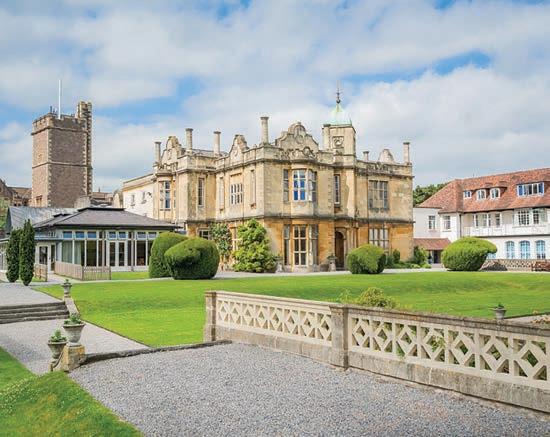
theroyalschool.co.uk
Location: West Midlands
Head: Tom Macdonald
Age range: 11 - 18 years
School Type: Co-Ed, Prep, Senior, Sixth Form
USP: Located in a leafy suburb of Wolverhampton, The Royal is conveniently situated between countryside and the UK’s second largest city, Birmingham, giving pupils many opportunities to experience the rich contrasts of British life. As a state boarding School, The Royal is an attractive option for students with British passports or leave to remain in the UK.
royalrussell.co.uk
Location: Surrey
Head: Chris Hutchinson
Age range: 3-18 years
School Type: Co-Ed,Prep, Senior, Sixth Form
USP: Royal Russell is di erent by design. We are a family school which values the things which make each of us distinctively brilliant. Our commitment to each other is to help every member of our community strive for their vision of success – to take a wider view of what their personal ambitions are. Our values speak to who we are and who we strive to be; whether you are a pupil, teacher, sta member, alumni or volunteer.
stgeorges-ascot.org.uk
Location: Berkshire
Head: Liz Hewer
Age range: 11 to 18 years
School Type: Girls, Senior, Sixth Form
USP: St George’s Ascot is one of the leading girls’ boarding and day schools in the UK. Pupils are individually known and experience a tailored education in this deliberately small school. The girls achieve academic excellence, but also develop their creative, physical and imaginative interests, supported by a close network of teaching and pastoral sta .
St Lawrence College slcuk.com
Location: Kent
Head: Barney Durrant
Age range: 3 - 18 years
School Type: Co-Ed, Prep, Senior, Sixth Form
USP: As a World Class High Performance Learning School, St Lawrence College nurtures academic and sporting excellence. With national-level success in rugby, hockey, cricket and netball, we are listed among the Top 200 Sports Schools in the UK and The Cricketer’s Top 100 Cricket Schools, ensuring every pupil reaches their full potential.
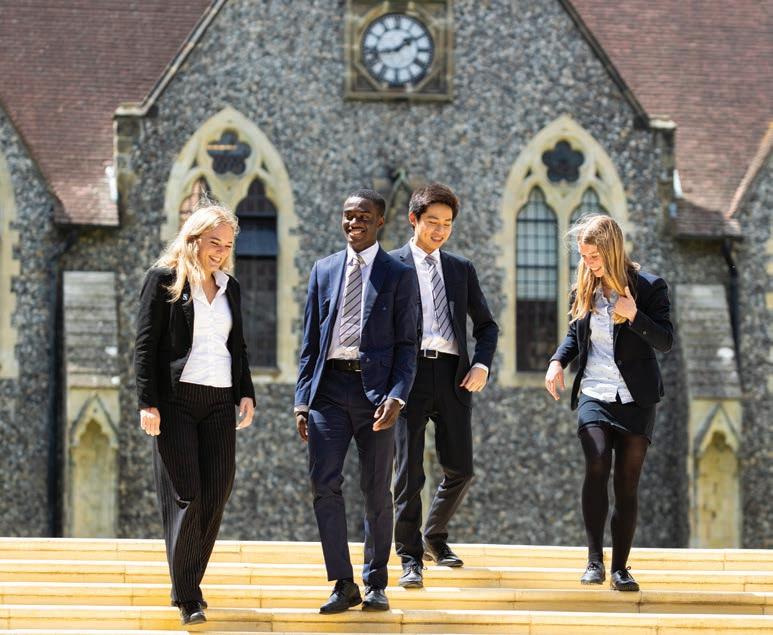
strathallan.co.uk
Location: Scotland
An immersive education with a modern and global focus
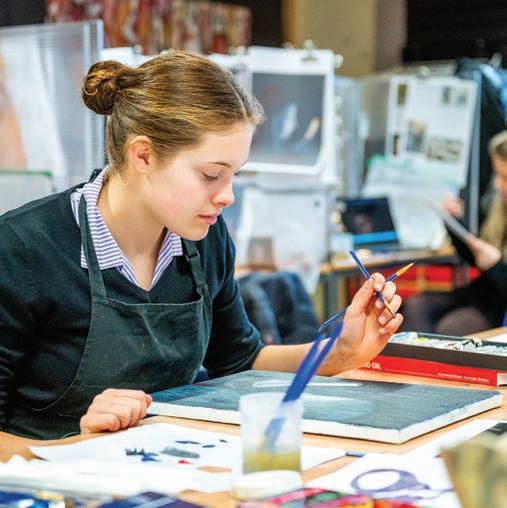
Head: Mark Lauder Age range: 5-18 years
School Type: Co-Ed, Prep, Senior, Sixth Form
USP: What sets Strathallan apart is our truly tailored approach to education that allows each child to choose the best balance of academic pursuit and exceptional co-curricular opportunities to draw out excellence – and we mean excellence, whether exceptional exam results or international sporting success – wherever their passion or ambitions may lie.
wycli e.co.uk
Location: Gloucestershire
Head: Christian San Josè Age range: 3-19 years
School Type: Co-Ed, Prep, Senior, Sixth Form
USP: Pupils enjoy life in safe and secure countryside campuses set over 52 acres. Wycli e is conveniently nestled within a small town, with direct rail links to London in 90 minutes. Our size makes for an environment where each pupil thrives as an individual, supported in a community where they are really known. We successfully blend the traditional and the modern, with striking architecture, a broad curriculum and a forward-thinking ethos. Wycli e is a pupil-centric environment where individuality is encouraged.


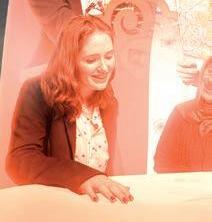
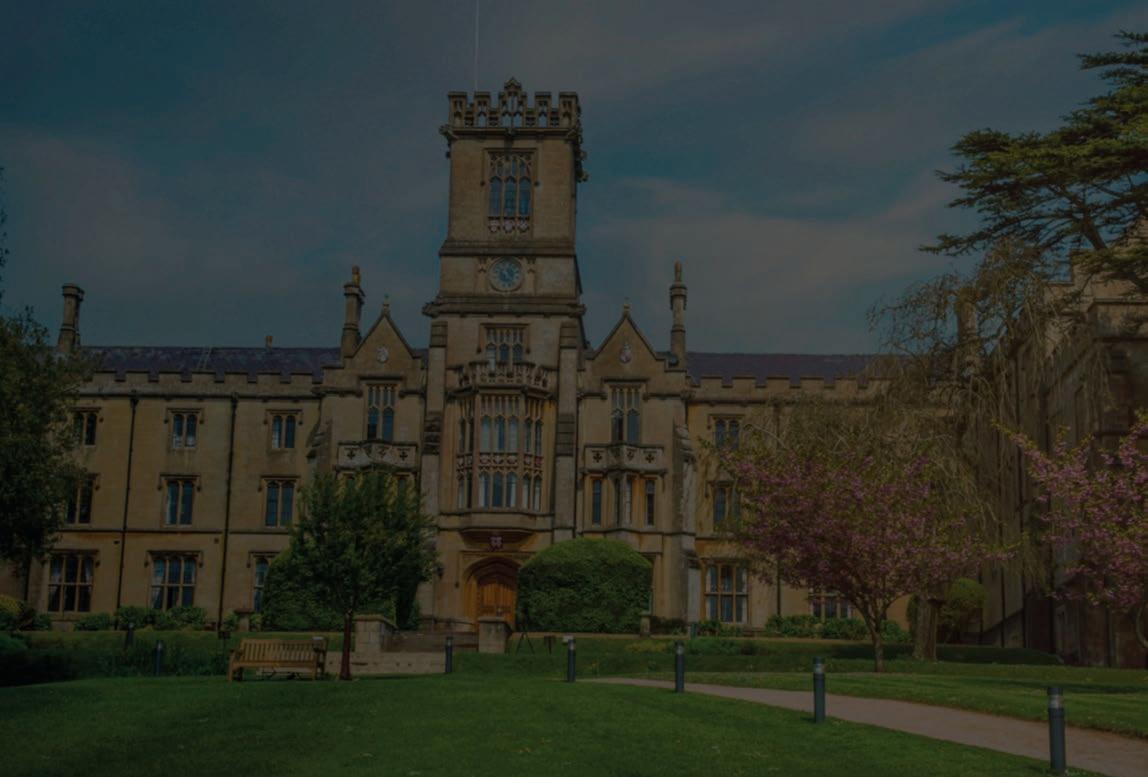

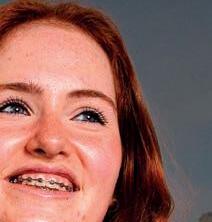



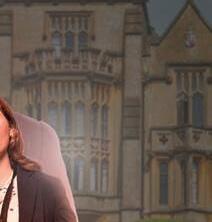


Renowned




To







The Head of Boarding at Gordon's School in Surrey on the many benefits of state boarding for young people and their families
Often described as education’s best kept secret, many state boarding schools o er all the facilities, pastoral care and academic excellence a orded by their independent counterparts but at a greatly reduced cost. Few have heard about them, yet there are around 30 state boarding schools in the UK. The state funds the tuition fees for these schools, parents the boarding aspect. This means full boarding, an excellent education and pastoral care, excellent facilities, and a fantastic range of co-curricular activities. Added to which, state boarding schools o er the traditions, history and House structures championed by their independent counterparts.
They are subject to the rigorous demands of Ofsted for both their day and boarding aspects and also reflect the mix in society, with children from di erent and diverse backgrounds and cultures. Alongside the financial benefits, state boarding schools are a popular choice for many families due to the school sta ’s familiarity, expertise and experience in dealing with children from a range of backgrounds and cultures – including those in Service families. They o er a

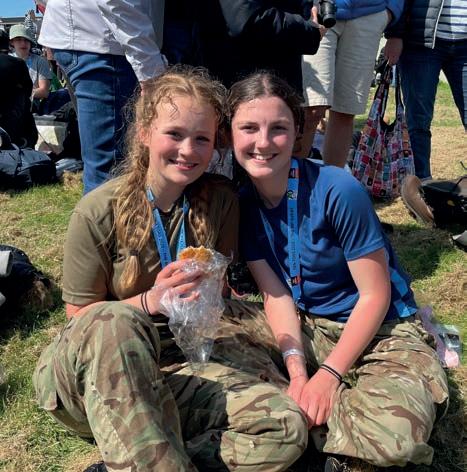
home from home and a place of consistency and stability. Demand for places at state boarding schools is high. Gordon’s School, for instance, is non-selective but gives priority to children with a clear need to board –such as those from military families.
Boarders are kept busy. The extended school day for both day and boarding students at Gordon’s means a co-curricular activity every weekday and Saturday mornings, with supper and prep for all. We o er a choice of over 128 co-curricular activities, from chess or board games to mock trials to Model United Nations.
Every student has the opportunity to join the Combined Cadet Force (CCF), in either Army, Navy or Air Force. As well as providing an insight into the Services and more adventurous activities, becoming a cadet promotes soft skills such as leadership, discipline and being part of a team.
A rich seam of heritage and tradition runs through our school. As the National Memorial to General Gordon, with an unbroken line of Sovereign Patrons,
students at the school are proud of the history here and the part they play in it. The tradition of marching, started in 1885 when the school first opened as a home for ‘necessitous boys’, is continued with drill every Friday. There are regular whole-school parades and an annual parade, led by the school’s Pipes and Drums through Whitehall to General Gordon’s statue on the Thames. Drills, marches and parades not only instil discipline in the students but strengthen bonds between older and younger students. Marching is just one of the many ways that young people are encouraged to be the best they can be, for something bigger than themselves. Further unity comes with the opportunity to take part in Ten Tors and Duke of Edinburgh’s Award (DofE) expeditions. These activities are seen as vital – not only for physical wellbeing but also for improving our students' transferable skills and, ultimately, their opportunities in whatever they decide to do after leaving school.
The ties and memories made during their school days here are reflected in the number of former Gordon's students who return to teach, o er careers advice or deliver talks to current students – even play for the alumni’s sports teams.




SAM COOPER Head of Boarding
Sibford Ferris, Banbury, OX15 5QL
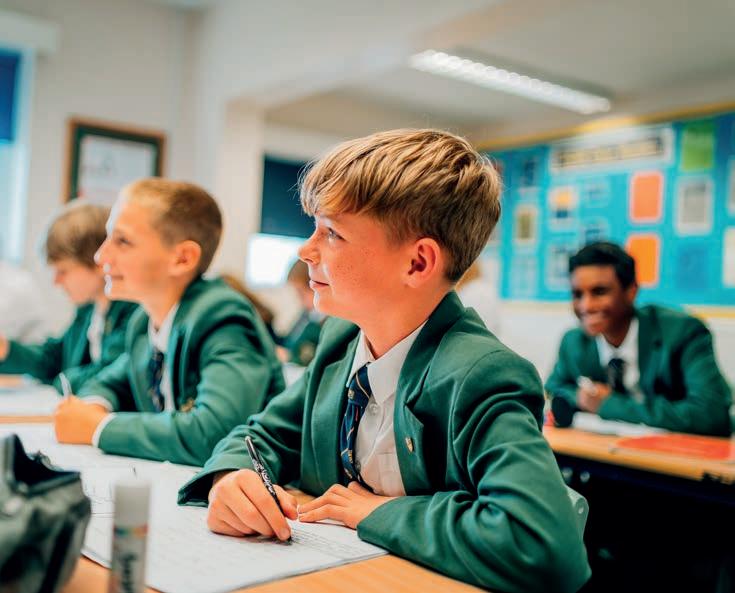

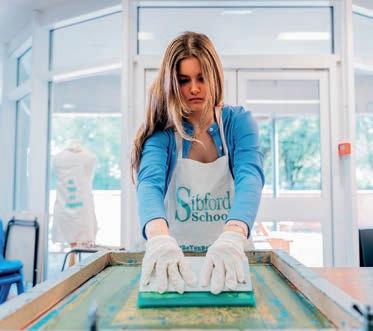

Sibford School in Oxfordshire offers inspiring education to pupils aged 3-18. Day, full, weekly and fixed night boarding places are available.

































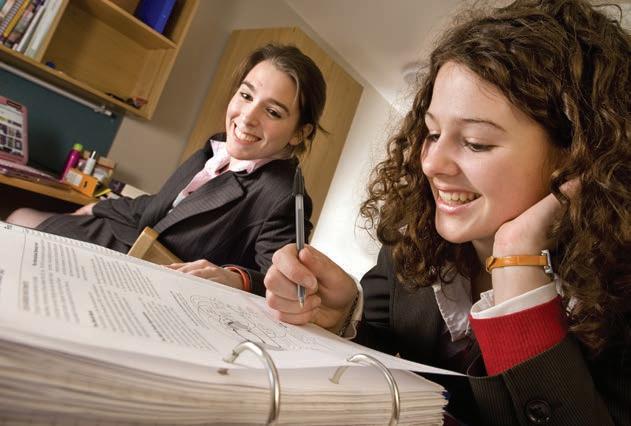


seconds with 60
The new Headmistress of Mayfield on her background and educational philosophy
What is your background?
I cannot remember a time when I did not want to be a teacher. After completing my education at the Universities of Durham and Cambridge I went straight back into the classroom. For 21 years I enjoyed a professionally challenging and very happy experience at St Richard’s Catholic College, a state school ranking in the top 2% in the country for value added. Mayfield’s excellent reputation was well known to me, and I had enjoyed visits over the years, but I was drawn by its innovative vision of a new wellbeing centre. Joining as Senior Deputy in September 2023, I now proudly serve as the headmistress of 400 remarkable girls.
What excites you most about your role at Mayfield?
I’m thrilled about the opportunity to enhance something already incredibly strong and unique; the transformative power of an all-girls education, where students can be themselves, free from gender stereotypes. Our principles of Joy, Compassion, Integrity, and Respect are palpable across the school. We aim to foster a strong sense of self, an informed voice, and a determination to embrace challenges and opportunities with optimism.
What is your academic philosophy?
I firmly believe in the concept of ‘formation.’ When teachers, experts in their fields, collaborate closely with parents, who are the experts on their child, we can provide the very best environment for children to grow and develop. My motto for our students is simple yet powerful: “Be Seen, Be Heard, Be Ready”.
Tell us about one pivotal moment in your career?
Back in 2018, the education council I was working in formed a Mental Health Education Wellbeing department and encouraged schools to get involved. I jumped at the opportunity and immersed myself in research, creating
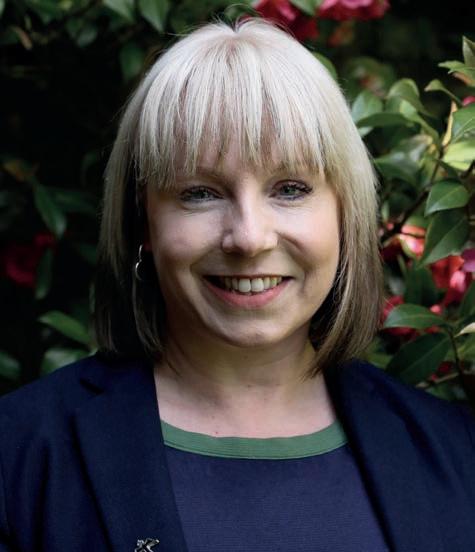
a comprehensive approach to wellbeing for our entire school. Our e orts were recognised when we received the highest level award from the Specialist Schools and Academies Trust for transforming student wellbeing. I took on a leadership role in this area, also spending time helping other schools. This groundwork proved invaluable when the challenges of the Covid years hit. We were well-prepared. I now carry with me a strong conviction that student wellbeing, focusing on resilience, adaptability, and happiness, should be central to the mission of every school.
What is Mayfield’s approach and what sets it apart?
It is encapsulated in our motto, ‘actions not words’. We pursue opportunities for our students to engage in leadership, confront challenges and recognise that a strong moral core will be their most important attribute.
What in your view makes a great student?
A great student goes beyond pursuing personal goals; they prioritise the happiness of others as much as their own. Their confidence in their talents, and identity is so strong that they naturally uplift and support their classmates.
What makes a great school?
It is one where belonging isn’t about conforming but about genuine acceptance. Sta have the time, resources, and encouragement to foster an atmosphere that ignites learning. The day is designed to prevent cognitive overload, allowing space for students to pursue their passions. Each child is celebrated for their unique qualities, empowered to recognise their value, find their voice, and seize every opportunity.
“We aim to foster a strong sense of self and a determination to embrace challenges and opportunities with optimism”
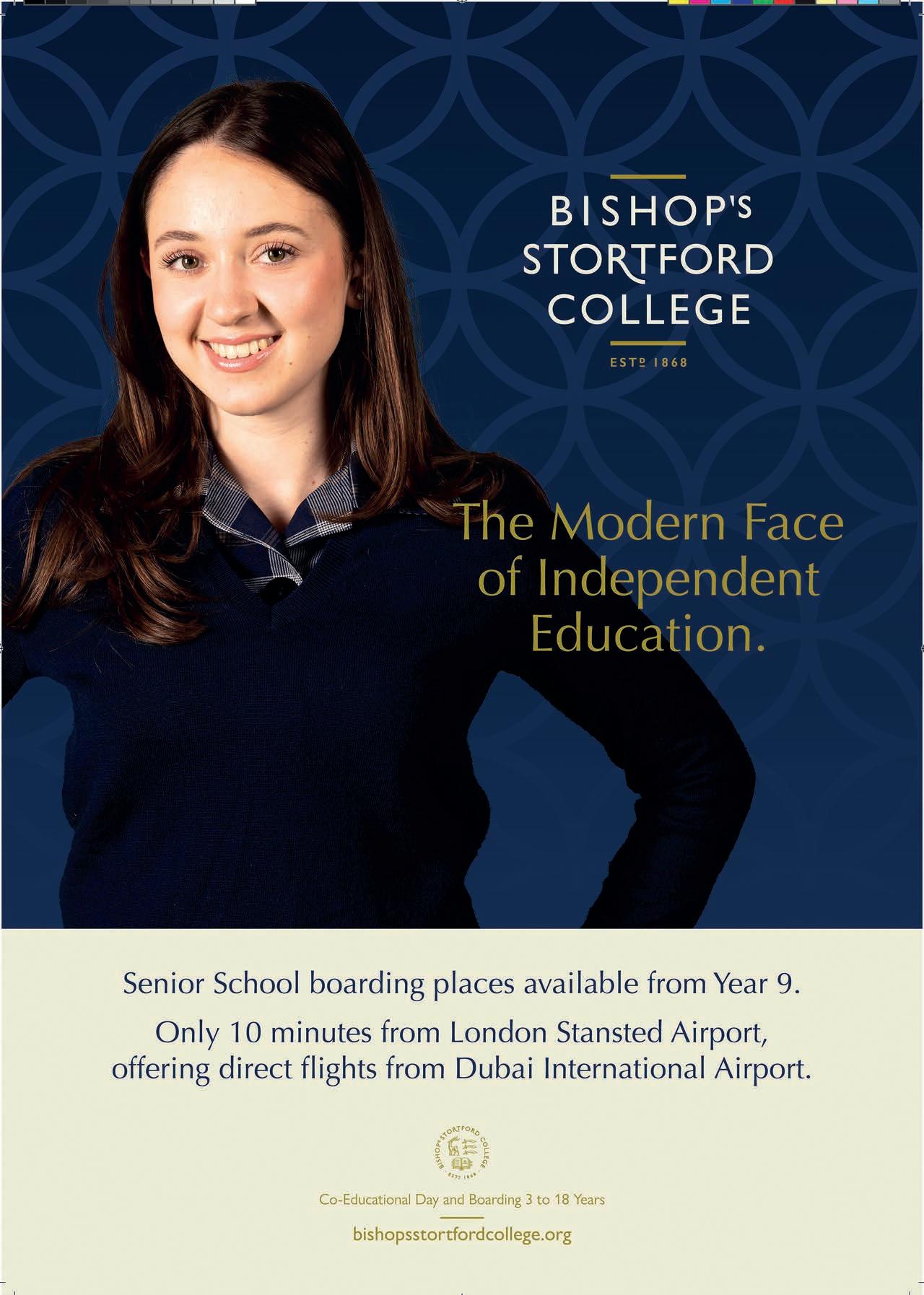
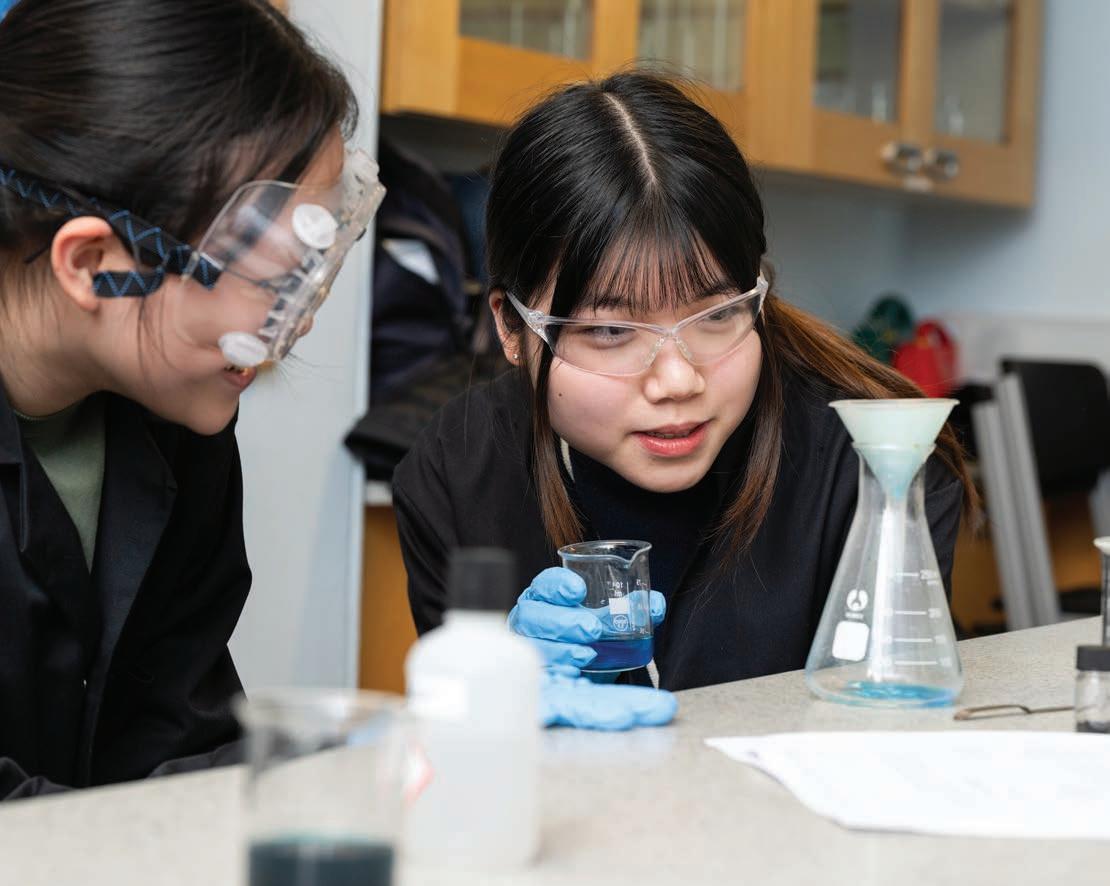
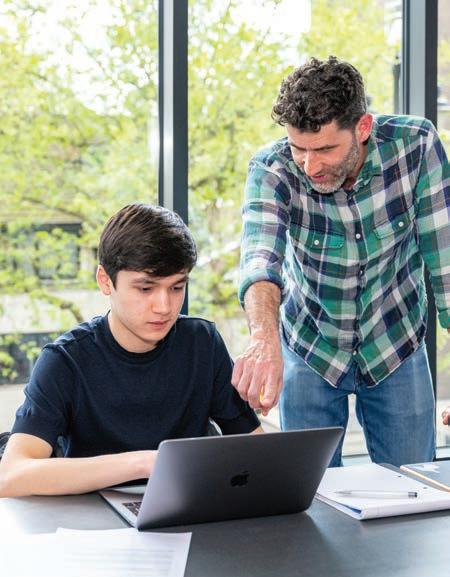
Colleges in London, Birmingham and Cambridge
A level, GCSE, University Foundation
Great university progression
1:1 support tuition
70% UK students / 30% International
Boarding facilities within walking distance
MPW was not just a school to me but also a home where I felt comfortable being myself. I can con dently say that MPW teachers are the most eminent life mentors. ey would guide and support us academically and psychologically. It would not have been possible for me to achieve anything like being the Head of the Student Council or receiving good A level results without them.